We are still closed for walk-in traffic, at least as of this writing in early July during this season of Coronatide. We’re doing curb-side delivery out by our back parking area and are happily donning masks to do some outside customer service show and tell, too. If you’re in the area and want to see some options to browse through, we can bring to your car a bin-full of books or cards or Bibles. The other day we took a few higher-end rosaries out and our customer was delighted.
No, Beth was not wearing drive-in waitress roller skates and knee socks, but it crossed my mind.
Please pray for our discernment as we try to figure out what it means to be safe and wise in these complicated times and how to properly reconfigure our workspaces for our staff once they come back in full. Pray for our health and for public health. We hope you, dear reader, are playing it safe, mourning your losses, lamenting this hard season. I suppose most of us know somebody who has died and we offer our condolences.
I’m sorry that we have not done BookNotes much these past months. It has just been too stressful. Soon, though, we’ll play some catch-up ball and share a few lists of great books we would have promoted had we not been hit by the pandemic. I can’t wait.
But first, we are eager to invite you to PRE-ORDER any number of truly great forthcoming titles. Most we’ve selected below are in our exact wheelhouse; this is a list we’ve necessarily curated for your reading edification. Some are even penned by writer friends and we couldn’t be more glad than to amplify their good gifts of thinking and writing. If you want to pre-order any other book you’ve heard about, just let us know. We can get almost anything and would appreciate the chance to serve you in this way.
I suppose I don’t have to tell you that the book industry is hurting; the loss of book tours and big releases and author events and in-store appearances (and, for us, not doing off-site events) have seriously hurt sales. (There has been a notable surge in interest in books about racial justice, a demand unlike anything we’ve ever seen, for which we are glad, even if it has been frustrating since many book manufacturers and printers are backlogged and the supply chain is strained.) Publishers and sales reps and booksellers are all stressed. We know that some of us will not recover. Imagine how these authors feel having the book they’ve worked on for years (and years, in some cases) finally being released into the realities of death and illness, pandemic and quarantining, pitched into these times when even Amazon has “de-prioritized” sending books.
Please consider spending a bit more this season in support of these good authors. Like us, they need generous readers and we, like them, are grateful for your support. Read on!
PRE-ORDER NOW — use our secure order form page by clicking the tab and the end of the column.
Here are the ones we most want you to consider that are coming out yet this summer.
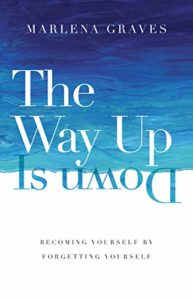 The Way Up Is Down: Becoming Yourself by Forgetting Yourself Marlena Graves (IVP) $22.00 | OUR SALE PRICE = $17.60 DUE JULY 14, 2020
The Way Up Is Down: Becoming Yourself by Forgetting Yourself Marlena Graves (IVP) $22.00 | OUR SALE PRICE = $17.60 DUE JULY 14, 2020
Those who follow BookNotes carefully know that we have been a big fan of Marlena’s remarkable premier release A Beautiful Disaster (Brazos Press; $19.00) where she narrates her coming of age in rural Pennsylvania as a Latina woman in a family with considerable hardships and how she discovered the desert fathers and the practices of contemplative spirituality. That book tells a remarkable story and from that great book, we came to follow her activism, growing increasingly into a strong voice for gender and racial justice, for the poor, for immigrants. She has pursed this Christ-like advocacy and teaching in the context of the local church, where she has served as a church educator and spiritual director. She has desired to be Christ-like, mature, deep. She has studied the meaning of love, of hope, faith. The Way Up is Down, it seems to me, is the fruit of these growing years and a beautiful follow up to her first great book.
The Way Up Is Down is about renunciation, about humility, about letting go of the American dream of upward mobility and success. It is about embracing brokenness and limits and finding God in the move towards that posture famously spoken by John the Baptist ” “He  must increase, I must decrease.” Marlena is chatty and conversational, moving adeptly from citing Russian Orthodox monks to telling common place stories about her own daily life as she seeks authentic and life-giving wholeness by trusting God. She brings in dramatic stories of folks she has encountered although the most powerful ones are mundane, almost — telling about a special needs fellowship in her church, for instance. The stories bring home in a disarming way some heavy truths about transformation, what it means to live into the sacred heart of Jesus, to be (as one chapter puts it) “cradled in the heart of God.”
must increase, I must decrease.” Marlena is chatty and conversational, moving adeptly from citing Russian Orthodox monks to telling common place stories about her own daily life as she seeks authentic and life-giving wholeness by trusting God. She brings in dramatic stories of folks she has encountered although the most powerful ones are mundane, almost — telling about a special needs fellowship in her church, for instance. The stories bring home in a disarming way some heavy truths about transformation, what it means to live into the sacred heart of Jesus, to be (as one chapter puts it) “cradled in the heart of God.”
The book did not feel over-wrought to me, as some do. Yet, there is honest stuff here. As Paul Pastor (author of The Face of the Deep) wrote, “It is a rare and sacred gift for a writer to serve her raw heart―tender and salted with tears―to nourish the world.”
Time doesn’t allow me to do this fabulous book justice but I respect Marlena greatly and commend her book about the simple ways of Christ and his merciful, serving ways and we can grow into that sort of life of faith.
Listen to this reviewer:
“Breathtaking. A stunning achievement. This book aches for us, daring to offer its own raw beauty, courage, and unflinching light. What’s most gorgeous about Marlena Graves’s humbling book, however, is its call for moral imagination, even among we who are wounded. If we fall broken at Jesus’ feet, she teaches, we will all heal by his grace–mended and scarred but lifted together. What a brave, rare book for these unlikely times. An honor to read, it’s one of the most exciting theological reflections in recent memory.”
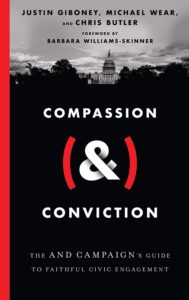 Compassion (&) Conviction: The AND Campaign’s Guide to Faithful Civic Engagement Justin Giboney, Michael Wear & Chris Butler (IVP) $22.00 | OUR SALE PRICE = $17.60 DUE JULY 21, 2020
Compassion (&) Conviction: The AND Campaign’s Guide to Faithful Civic Engagement Justin Giboney, Michael Wear & Chris Butler (IVP) $22.00 | OUR SALE PRICE = $17.60 DUE JULY 21, 2020
This is certainly one of the soon to be released books that many of our customers — mostly, younger, it seems — are most eager to see. The authors have been on social media and doing podcasts sharing their vision for their “third way” public justice mission for quite some time. (They’ve been at our Pittsburgh Jubilee conference, too! Woot!) So there’s a buzz on this one that you should pay attention to. I’ve read it and it is excellent.
{check out their Church Politics podcast here.}
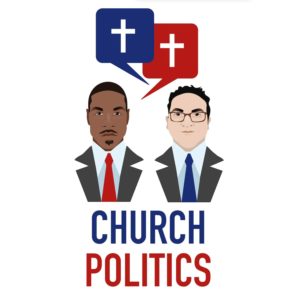
Their theme of “and” (rather than more binary “either/or” attitudes) shine through wisely, over and over. I have written at great length about the complicated and controversial interface of faith and politics (use a key word search at the search engine at BookNotes and hopefully several past posts will pop up) and I would love to write much more about this energetic and very wise book. I know it deserves a much longer review later — there are distinctives in Compassion (&) Conviction that make this a major contribution to the discussions about faith and public life. I mostly agree with most of it; almost all of it is amazingly fantastic, there are things in this one short book that I’ve wished were in othres, so it is a must-have resource. For now, please know that this is an important book and, in God’s timing, perhaps one of the most necessary voices to appear in quite a while. Call it timely or much-needed or — in the spirit of I Chronicles 12:32 — Issacharian, it really does capture something that the times cry out for, that many are longing for, a view of civic engagement that is more than partisan politics and that puts principles above partisanship.
That is, it is compassionate and convicted, what Richard Mouw has called “convicted civility. But it is much more than an etiquette manual for public engagement.



Three things that Hearts & Minds friends might want to know about this. First: two of the authors are black; Michael, who is white, has a story that is deeply entwined with soul and gospel music, and he ended up working in the Obama White House, a prestigious position from which he eventually walked away. (That is a story he told in the excellent Reclaiming Hope: Lessons Learned in the Obama White House about the Future of Faith in America.) So it is multi-ethnic and although it is not only about race, there is a keen awareness about this throughout. For those interested in BLM protests, there is a good chapter here called “Advocacy (&) Protest.” I have been waiting for decades for an evangelically-minded book to offer some basic Biblical examples of dramatic protest and civil disobedience. This chapter is worth the price of the book. But it is also about going beyond protest to constructive efforts to actually bring about concrete change.
Secondly, Compassion (&) Conviction has good discussion apparatus, sidebars, a good leader’s guide, and some helpful exercises to experiment with maturing in our civic engagement and how to actually get involved. It has this “both/and” interest in theory and practice, theology and action, politics proper and citizen activism. Few books (and I’ve read dozens) on Christian political engagement have such a delightful and wise balance of Biblical studies, public theology, justice theory and ordinary, practical guidance on civic involvement. Kudos to this fun trio, Christ Butler, Justin Giboney, and Michael Wear for making this book so darn useful.
Thirdly (no surprise) I want to hold up its exquisite commitment to an exciting sort of principled civility, calling for partnership and cooperation and common ground, even when there are times for partisanship and even protest. This is no boring “can’t we all just get along” idealism nor a muddled middle that tries to blend the best of all views. No, this really does try to offer an imaginative new way, a fresh approach that is creatively rooted in their “(&)” brand. Check out the And Campaign and join up. It is more than a brand or logo or clever pitch; they really believe this stuff, as those loyal to Jesus and wanting to be good citizens in a pluralistic society. The book is a thoughtful exploration of important stuff that many have not gotten quite right, so it’s a needed blessing. But, in a way, it is also a manifesto, and call to build coalitions and alliances and get busy in the name of Jesus to build a better world.
Some of the marketing for the book invites readers who are disillusioned with the far right and the far left and the muddled middle, by saying this:
Have you ever felt too progressive for conservatives, but too conservative for progressives? It’s easy for faithful Christians to grow disillusioned with civic engagement or fall into tribal extremes. Representing the AND Campaign, the authors of this book lay out the biblical case for political engagement and help Christians navigate the complex world of politics with integrity.
There are bunches of stunning endorsements of this by folks from across the political and theological spectrum. When I have more time as the election season draws nearer, I’m sure I will describe my own thoughts more carefully about its many strengths and how I respect these authors and their good work. For now, here are two advanced blurbs that capture the books excellent reputation, showing why we hope many order it as soon as possible:
The partisanship, point-scoring, bickering, and pettiness that mark Christians’ engagement with politics often belies the message of hope offered in Jesus. If we, as a church, do not learn how to seek the good of our neighbor and the broader world without being beholden to a particular political party, we will, however inadvertently, preach a false gospel in our actions and public life. Because of this, reconstructing a political theology that is wise, humane, just, and deeply biblical is the most urgent calling facing the church in America today. The AND Campaign is a leader in this vital work of reconstruction, casting an alternative vision for a politics rooted in faith, hope, and love. In this book, Giboney, Wear, and Butler provide basic tutoring in civics, Scripture, race, justice, and political engagement that will help us, as a church, find a more faithful and truthful way of walking as Christians in this world of political turmoil. I want every church in America to give an ear to these men as they help us walk the way of Jesus as a community and a political people. Tish Harrison Warren, author of Liturgy of the Ordinary
People commonly lament our age’s political division and tribalism. Some have lived at the poles of political discourse, and they’ve forgotten their way back to a commonly shared center. Finding our way back to one another can only happen if we learn not to bifurcate our politics. We need a movement to reunite ourselves, reunite with our neighbors, and reunite political ideals that never should have been divided in the first place. That reunion will feel like a strange new land for many us, so we need guides, pathways, tools, and discipline for talking and working together for the common good. You hold in your hands a creative struggle for wholeness, just the kind of help we need in our age. Thabiti M. Anyabwile, pastor of Anacostia River Church, author of Reviving the Black Church
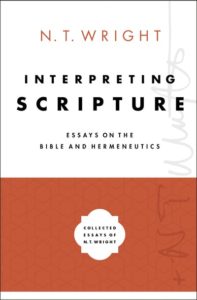 Interpreting Scripture: Essays on the Bible and Hermeneutics N.T. Wright (Zondervan Academics) $52.99 | OUR SALE PRICE = $42.39 DUE JULY 14, 2020
Interpreting Scripture: Essays on the Bible and Hermeneutics N.T. Wright (Zondervan Academics) $52.99 | OUR SALE PRICE = $42.39 DUE JULY 14, 2020
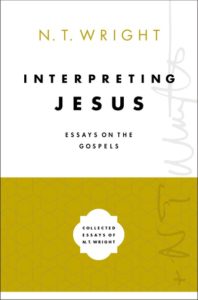 Interpreting Jesus: Essays on the Gospels N.T. Wright (Zondervan Academics) $52.99 | OUR SALE PRICE = $42.39 DUE JULY 14, 2020
Interpreting Jesus: Essays on the Gospels N.T. Wright (Zondervan Academics) $52.99 | OUR SALE PRICE = $42.39 DUE JULY 14, 2020
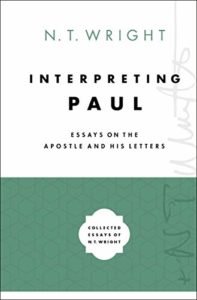 Interpreting Paul: Essays on the Apostle and His Letters N.T. Wright (Zondervan Academics) $44.99 | OUR SALE PRICE = $35.99 DUE JULY 14, 2020
Interpreting Paul: Essays on the Apostle and His Letters N.T. Wright (Zondervan Academics) $44.99 | OUR SALE PRICE = $35.99 DUE JULY 14, 2020
What can we say to explain the significance of these three anthologies by one of the most important theological voices of our lifetime? Agree or not with all of Wright’s brilliantly considered views, he has not only been exceedingly gifted in Christian wisdom based on a rare ability to connect the dots of Biblical texts and teaching but has been almost super-human his prodigious output. We can list only a small handful of similar scholars who do both excellent academic work and serve the church well with more popular level books and who do so very, very much. Tom is a remarkable person and we should rejoice that he has offered his gifts to both the academy and the church.
These three volumes are collections of pieces from academic journals, scholarly chapters of other books, articles, essays, sermons and the like. Hardly anyone could collect all of these as some are from international sources or journals that are not widely available. So while these are not new chapters for most of us they will be as good as new. These are pieces you most likely have not seen or owned.
And, as a matter of fact, there are some brand new essays as well that have not yet be published. Wow.
What a labor of love it was to the editors and compilers to find some of Wright’s best “unsung” work. I know I’ve read chapters in books that I wished were more widely available and now we have it. Thanks be to God.
To make it even more useful, as the publisher explains, Each of the essays “are preceded by brief reflections written by N. T. Wright; these reflections serve to contextualize the writing of each essay and to highlight their place and significance within Wright’s voluminous corpus.”
Just when I wondered what N. T. Wright might write next we get a 3 volume circus of revolving themes and perspectives and worldviews that illustrate why Wright is the most influential biblical scholar in the English-speaking world: Wright is one of the few who shapes conversations in both Gospels studies and Pauline studies. These essays bring to the front Wright’s engaging prose, his undeniable courage to go where few have gone, and his joy to bridge the work of the academy and the church. Another treasure trove of studies. Dr. Scot McKnight, Professor of New Testament Northern Seminary
A trilogy of N. T. Wright’s seminal essays on Scripture and hermeneutics, Jesus and the Gospels, and Paul and his Letters with a number of brand-new contributions thrown in for good measure? Count me in! For roughly three decades now, Wright’s voice has been among the most valuable and valued by both the church and the academy. Rightly so! This three-volume collection–which will prove to be a treasure trove for serious students as well as for scholars of Bible, history, and theology–reveals why time and again. Todd D. Still, Dean & Professor of Christian Scriptures, Baylor University, Truett Seminary
Few, if any, modern biblical scholars have written with the depth and breadth of N. T. Wright. These essays, from a wide variety of settings and publications, are full of treasures, old and new–even some modifications of earlier positions. They will delight Wright enthusiasts, challenge his critics, and educate all readers. No biblical scholar, theologian, or theological student should be ignorant of the most recent Wright perspectives on so many aspects of Scripture, Jesus, and Paul. Michael J. Gorman, Raymond E. Brown Chair in Biblical Studies and Theology St. Mary’s Seminary & University, Baltimore
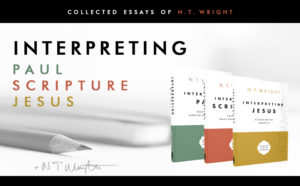
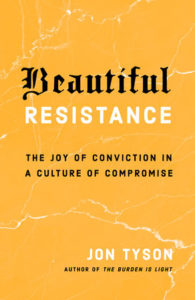 Beautiful Resistance: The Joy of Conviction in a Culture of Compromise Jon Tyson (Waterbrook) $17.00 | OUR SALE PRICE = $13.60 DUE JULY 21, 2020
Beautiful Resistance: The Joy of Conviction in a Culture of Compromise Jon Tyson (Waterbrook) $17.00 | OUR SALE PRICE = $13.60 DUE JULY 21, 2020
I read an early version of this in almost one sitting; I was so enthralled I wanted race ahead to see more of where he was going, what his take would be, what he meant by resistance and compromise, and how he’d appropriate his hero, the late Dietrich Bonhoeffer. I’ve heard Jon speak — he did one of the all-time best-ever talks at the Jubilee conference in Pittsburgh that has been proclaiming the Lordship of Christ over all aspects of life, all careers and callings, for over 40 years. At that event he talked about his work back in Australia in a butcher shop and his conversion and renewal in an upbeat charismatic church. It wasn’t until he heard of Abraham Kuyper and other such thinkers who understood redemption as a wide-as-creation story that his life in the world became to have new meaning and vigor. So much so that he wanted to become a preacher and pastor (and was quite remarkably gifted for it, I think) so that he could help shephard others towards a sort of faith that was neither fundamentalist nor progressive, that was fresh and incarnational, relating worship and work, liturgy and life. He’s my kind of guy, and while his last two books (one on grace and how not to be burdened by legalism or perfectionism and another on redeeming how we speak) were excellent, they didn’t seem to display his robust, creation-regained sort of Kingdom theology that so captured me during his impressive Jubilee conference presentation.
Beautiful Resistance does not rehash that ground, either, actually (although I wished he had cited Schaeffer or Kuyper or Al Wolters, at least) but it pulses with a vivid vision of a faithful sort of discipleship that is joyous and serious, sacrificial and rewarding, that knows to say no to some things in order to say yes to other, better things. (And, man, it sure does cite some fabulous works.) It’s a great title, the two words bringing together themes that are important to historic discipleship but, perhaps not so well known in either mainline Protestant denominational congregations or moderate, efficient, evangelical mega-churches — that there are things in the culture which we are wise to resist, and that to do so, as a Christian counterculture, can be a beautiful thing.
This really is interesting and helpful.
As I paged through this great little book I over and over rejoiced that such stuff was being said by a fairly conventional evangelical leader on a fairly traditional evangelical press. Kudos to Waterbrook for again bringing a lively and even surprising book of life and joy, costly discipleship and resistance, habits nurtured by a community that does life together for the sake of the world.
 Thank you to Jon Tyson for his honest concern about how we may have “fit in” to the cool culture a bit too much and may have absorbed some of the worst values that are not consistent with Jesus’s own upside down kingdom. It is rare and good to see lively, Chirst-loving piety and such thoughtful social ethics portrayed in such accesible, chatty conversational prose. This is a great book to share with folks who want to be challenged to a deeper more subversive sort of faith. Get a group together and pre-order a bunch right away. There’s a big study guide in the back making it ideal for conversations, small groups, and (yes) Zoom conversations.
Thank you to Jon Tyson for his honest concern about how we may have “fit in” to the cool culture a bit too much and may have absorbed some of the worst values that are not consistent with Jesus’s own upside down kingdom. It is rare and good to see lively, Chirst-loving piety and such thoughtful social ethics portrayed in such accesible, chatty conversational prose. This is a great book to share with folks who want to be challenged to a deeper more subversive sort of faith. Get a group together and pre-order a bunch right away. There’s a big study guide in the back making it ideal for conversations, small groups, and (yes) Zoom conversations.
Western culture is increasingly hostile to the teachings and ways of Jesus. The pressure to compromise is the highest it’s been in my lifetime. The urge to back down on Jesus’s compelling vision of life in the kingdom is greater than ever. This book comes at just the right time–a pastoral, yet prophetic call from one of our generation’s greatest leaders. I was moved in my heart to trust Jesus’s vision of life over that of my culture’s. John Mark Comer, author of The Ruthless Elimination of Hurry
I believe Jon is one of the great prolific and prophetic voices of our generation. He’s been a pastor in my life for over a decade, starting with my years in New York. Jon casts a timely and compelling vision in his latest work, Beautiful Resistance. He writes with such astute analysis and poignant clarity that several times throughout these pages, I wanted to stand and shout, ‘I’m in!’ May these words be a clarion call to the church to fortify our faith through sacrifice and love. Rebekah Lyons, author of Rhythms of Renewal and You Are Free
It’s one thing to write on the beauties of the kingdom and how the way of Jesus must be esteemed as better and stronger than the kingdom of this world; it’s another thing altogether to live this. Jon Tyson lives this. He writes and preaches with a uniquely compelling conviction, because it flows from a figure that truly believes that the words and ways of Jesus are better than all this world has to offer. By the end of this book, you will find yourself compelled to join with the likes of Dietrich Bonhoeffer who knew that the beauties of the kingdom of heaven are better than the allure of this world. Dr. Bryan Loritts, author of Insider Outsider: My Journey as a Stranger in White Evangelicalism and My Hope for Us All
Here is a six minute reading from the first chapter of Beautiful Resistance: The Joy of Conviction in a Culture of Compromise (although not with Jon’s nifty Aussie accent. Enjoy.)
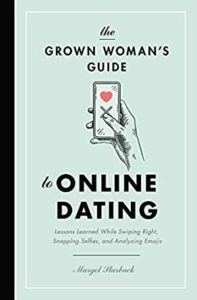 The Grown Woman’s Guide to Online Dating: Lessons Learned While Swiping Right, Snapping Selfies, and Analyzing Emojis Margot Starbuck (Thomas Nelson) $18.99 | OUR SALE PRICE = $15.19 DUE AUGUST 11, 2020
The Grown Woman’s Guide to Online Dating: Lessons Learned While Swiping Right, Snapping Selfies, and Analyzing Emojis Margot Starbuck (Thomas Nelson) $18.99 | OUR SALE PRICE = $15.19 DUE AUGUST 11, 2020
This is another book I am so eager to read — due to Covid, I guess, the publisher couldn’t get a review copy out to me in time. Alas, this is no problem as I’d happily promote anything Margot wrote (and she has written quite a lot.) I was thoroughly won over to her fascinating view of faith and life and the world — not to mention her amazing wordsmithing — when I was bowled over by her memoir Girl in the Orange Dress: Searching for a Father Who Will Not Fail (IVP; $19.00.) Even as a guy, I adored her book Unsqueezed: Springing Free from Skinny Jeans, Nose Jobs, Highlights and Stilettos (IVP; $16.00) and literally just today had reason to recommend her must-read Small Things with Great Love: Adventures in Loving Your Neighbor (Baker; $16.00.) Perhaps you have seen our review of her co-authored book that wisely explores the role of sports in the lives of our kids, Overplayed: A Parent’s Guide to Sanity in the World of Youth Sports (Herald Press; $15.99.) Just this week she released a nice new book, a devotional for women called God Calls You Worthy: 180 Devotions and Prayers to Inspire Your Soul (Barbour Books; $12.99.) You should order as a gift for somebody, maybe. At our 20% off discount you could give a bunch away.
 Ms Starbuck has helped numerous authors find their voices and does writing workshops and consulting an co-writing that is very widely esteemed. Few people are so deliriously fun, so earnestly faithful and hopeful about serving others and social change. Like I said Beth and I love her and her work. We recommend reading any of her fabulously interesting, energetically written works.
Ms Starbuck has helped numerous authors find their voices and does writing workshops and consulting an co-writing that is very widely esteemed. Few people are so deliriously fun, so earnestly faithful and hopeful about serving others and social change. Like I said Beth and I love her and her work. We recommend reading any of her fabulously interesting, energetically written works.
But now there’s this. It is a bit of a memoir — man, good on her for being so honest as a divorced, almost middled-age post-modern hippy Christian about this — from which we can all learn about relationships, integrity, longing, seeking. There will be lessons learned and if you in the online dating world (and more folks are than I think like to admit it) this book will be a must. I’m sure there is nothing like it as it offers bunches of very specific pointers.
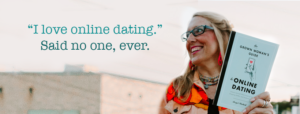
But then she gets busy helping you out.
But I’m going out on a limb and guessing that — promising that — there will be lessons here for all of us. Do you know, deep in your bones, even broken bones, that you are loved? That you are worthy? Do you want to thrive emotionally and spiritually with a freedom that comes from a sure awareness that you are adopted by God, called beloved? I think this is going to move in the direct of truly profound books like Brennan Manning’s Ragamuffin Gospel or Nouwen’s The Return of the Prodigal Son. But it will be more fun, I guarantee that, too.
Dating or not, unmarried or not, middle-aged or not, whether you even know what the heck swiping right even means, The Grown Woman’s Guide to Online Dating is a book you are going to love. Order it today.
By the way, lot of amazing people have raved about this book. Such as Rashad Jennings (former NFL running back and Dancing with the Stars champion) and the amazing theological writer Kendall Vanderclice (author of We Will Feast: Rethinking Dinner, Worship, and the Community of God.). But here is one I really loved:
“The very day I received Margot Starbuck’s new book I tore into it eagerly, reading until midnight. Which is strange since I’m not in the dating market. But I am in the ‘good reading’ and ‘wise and witty’ market, which is another way of saying ‘I’m in the Margot Starbuck market.’ Pass this book on to anyone who’s dating or thinking of it. They’ll laugh, take notes, avoid tons of awkward dates, and gain buckets of godly savvy. I can’t think of a better guide than Starbuck.”
Leslie Leyland Fields, author of Your Story Matters: Finding, Writing, and Living the Truth of Your Life
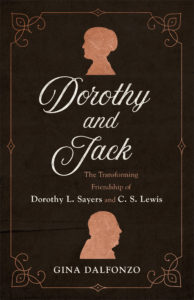 Dorothy and Jack: The Transforming Friendship of Dorothy L. Sayers and C. S. Lewis Gina Dalfonzo (Baker) $16.99 | OUR SALE PRICE = $13.59 DUE AUGUST 18, 2020
Dorothy and Jack: The Transforming Friendship of Dorothy L. Sayers and C. S. Lewis Gina Dalfonzo (Baker) $16.99 | OUR SALE PRICE = $13.59 DUE AUGUST 18, 2020
I hope you are like me and are eager to see this — really eager! This is a book many of us have been waiting for for decades, and Gina Dalfonzo seems to be just the right person for the job. She is a good writer, a thoughtful woman who has published much about faith and culture, theology and the arts, the church and our societal contexts. That is, she’s been influenced by Lewis and Sayers, both who were known as serious thinkers (but not theologians as such) who brought the light of the gospel to, well, to everything from prose to politics.
You may have heard that the fabulous mystery writer and dramatist and early Christian feminist (the first woman to graduate from Oxford) often corresponded with C.S. Lewis. Sayers was happily married and Jack, as his friends called him, was a confirmed bachelor for most of his life. And yet, despite great odds in post-war, no longer Victorian England, they became equals 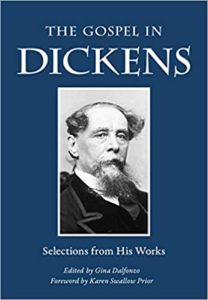 in thought, colleagues in writing, and good friends. Gina Dalfonzo is a great writer to explore this topic — she’s quite the literary student and has a book coming out soon which collates some of the deeply spiritual themes in Charles Dickens that will be in the Plough Press series The Gospel in… called The Gospel in Dickens: Selections from His Works. It will be published by Plough Press in September ($18.00) and carries a foreword by Karen Swallow Prior. We carry this whole great line of books, by the way.
in thought, colleagues in writing, and good friends. Gina Dalfonzo is a great writer to explore this topic — she’s quite the literary student and has a book coming out soon which collates some of the deeply spiritual themes in Charles Dickens that will be in the Plough Press series The Gospel in… called The Gospel in Dickens: Selections from His Works. It will be published by Plough Press in September ($18.00) and carries a foreword by Karen Swallow Prior. We carry this whole great line of books, by the way.
Dorothy and Jack: The Transforming Friendship of Dorothy L. Sayers and C. S. Lewis will be a great addition to the libraries of anyone who collects books by Lewis and/or Sayers. And it would be an excellent introduction to either for those who haven’t yet become serious fans. Ms. Dalfonzo has been deeply engaged in this literature for a long while but is an easy-to-read popularizer, not an arcane scholar. This makes this book a great choice for most of us, and we highly recommend it.
Perhaps you long for deeper relationships that allow for both intellectual and spiritual growth. Sayers and Lewis modeled this for us and Dalfanzo (who received a Clyde Kilby Research Grant to work on this project) is ideal to help us learn from these famous friends. (She, by the way, wrote about friendship a bit in her helpful book called One by One: Welcoming the Singles in Your Church published by Baker a few years ago; $16.00. She cites both Lewis and Sayers in that important book.) This theme of friendship is actually a good part of this work and it would do many of us well to allow this historic friendship to inspire us in stewarding this gift of friendship.
One of those keeping the Lewis/Inklings world alive is Dr. Crystal Downing who (with her husband David Downing) co-directs the famous Marion Wade Center at Wheaton Center. Downing is particularly known for her books and creative lectures on Ms Sayers. (I suspect it was Downing who first inspired Dalfonzo to become interested in Sayers when Gina studied under her as a lit major at Messiah College.)
Listen to this lovely endorsement by Crystal Downing, who, like Sayers, wouldn’t dare say something she couldn’t defend:
Beautifully written, Dorothy and Jack will transform not only common understanding of both Lewis and Sayers but also common assumptions about male/female friendships.
By the way, it’s a bit in the distance so we’ll tell you more about it later, but Dr. Downing herself has a serious book on the nearly unprecedented Dorothy Sayers. That can be pre-ordered, now, of course, too. Due in mid-November, we’re eager for Subversive: Christ, Culture, and the Shocking Dorothy L. Sayers from a new imprint of Fortress Press called Broadleaf Books. It’s a hardcover for $24.95. More on that anon.
 Vesper Flights Helen MacDonald (Grove Press) $27.00 | OUR SALE PRICE = $21.60 DUE AUGUST 25, 2020
Vesper Flights Helen MacDonald (Grove Press) $27.00 | OUR SALE PRICE = $21.60 DUE AUGUST 25, 2020
I cannot say too much about this as I have not yet set eyes upon it, which makes me all the more eager as we anticipate its release date. I am sure we will have it before its official street date, but it is one of those books the publishing world honors with a strictly adhered to official date before which we cannot put it out. That is because it will be one of the big books of the early fall, and many throughout the world have been eagerly awaiting it.
Why, you may ask? Her last book, the New York Times 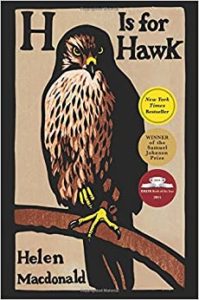 bestselling H is for Hawk was exceptionally well reviewed and beloved from when it first came out in London I think is 2014. Among other accolades it was awarded the Samuel Johnson Prize for nonfiction, and was beloved as a lovely birding book even for those that don’t usually read about bird-watching. The author, you see, was coping with grieve and took up the life-log dream of becoming a falconer. It was a nearly transcendent story of her relationship with this wildest of birds (a goshawk.) It was called “breathtaking” and “beautiful” and “astonishing” and “indelible.” What a memorable story, what a writer she is. It was often said that after reading H is for Hawk “you’ll never think see a bird overhead the same way again.” Or, think of the pain and beauty of being alive the same way.
bestselling H is for Hawk was exceptionally well reviewed and beloved from when it first came out in London I think is 2014. Among other accolades it was awarded the Samuel Johnson Prize for nonfiction, and was beloved as a lovely birding book even for those that don’t usually read about bird-watching. The author, you see, was coping with grieve and took up the life-log dream of becoming a falconer. It was a nearly transcendent story of her relationship with this wildest of birds (a goshawk.) It was called “breathtaking” and “beautiful” and “astonishing” and “indelible.” What a memorable story, what a writer she is. It was often said that after reading H is for Hawk “you’ll never think see a bird overhead the same way again.” Or, think of the pain and beauty of being alive the same way.
This forthcoming new one, Vesper Flights, will surely be equally respected as the poet and naturalist Helen MacDonald offers a collection of essays about the human relationship to the natural world. Here is how the publisher’s catalog puts it:
In Vesper Flights Helen Macdonald brings together a collection of her best loved essays, along with new pieces on topics ranging from nostalgia for a vanishing countryside to the tribulations of farming ostriches to her own private vespers while trying to fall asleep.
Meditating on notions of captivity and freedom, immigration and flight, Helen invites us into her most intimate experiences: observing the massive migration of songbirds from the top of the Empire State Building, watching tens of thousands of cranes in Hungary, seeking the last golden orioles in Suffolk’s poplar forests. She writes with heart-tugging clarity about wild boar, swifts, mushroom hunting, migraines, the strangeness of birds’ nests, and the unexpected guidance and comfort we find when watching wildlife.
I bet you know someone who would love it as a great gift this fall. Pre-order it from us and we’ll be happy to send it wherever you say.
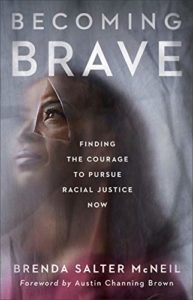 Becoming Brave: Finding the Courage to Pursue Racial Justice Now Brenda Salter McNeil (Brazos Press) $21.99 | OUR SALE PRICE = $17.59 DUE AUGUST 25, 2020
Becoming Brave: Finding the Courage to Pursue Racial Justice Now Brenda Salter McNeil (Brazos Press) $21.99 | OUR SALE PRICE = $17.59 DUE AUGUST 25, 2020
We have met this insightful sister and she is a stunning Christian leader, a great communicator, an excellent teacher, an evangelist, and author of a good number of books. In our last post where we listed, after the police murder of George Floyd, books about racism written by people of color, we naturally highlighted her recent Roadmap to Reconciliation 2.0: Moving Communities Into Unity, Wholeness and Justice an updated and expanded edition of a previous classic (IVP; $20.00.) It’s very good.
When we heard she had moved to a new publisher, we thought it might be good for her, shifting a bit to a different, perhaps broader audience, maybe tweaking her work and tone a bit. I do not know if in Becoming Brave she shifts in any significant ways (I suspect that she does not.) It does seem to be painfully urgent, an anguished cry to deepen our faith, step up, being bolder than ever. I am sure it will be stimulating, passionate, Biblical, and written with a charming touch, even if the material is at times difficult. I’m sure it will be wise and useful guidance for anyone wanting to, as the subtitle explains, “purse racial justice now.” Becoming Brave takes its cue from the book of Esther, and I am sure that this will become a classic study of the book.
That Austin Channing Brown (increasingly known for the exquisite I’m Still Here) did the foreword is important, too. That’s good to see.
 Allow me to share what other esteemed and discerning folks say about Brenda Salter McNeil, her work and witness, and, particularly, this soon to be released very important new work. Reading these descriptions will help you determine if you should pre-order this now; I think it is obvious that you should.
Allow me to share what other esteemed and discerning folks say about Brenda Salter McNeil, her work and witness, and, particularly, this soon to be released very important new work. Reading these descriptions will help you determine if you should pre-order this now; I think it is obvious that you should.
“Part confession, part biblical reflection, part call to storm the gates, Becoming Brave declares that the Christian call to do justice cannot and shall no longer be guided, shaped, and defanged by sensibilities more loyal to white people’s comfort than to God. A must-read.”
— Lisa Sharon Harper, founder and president, Freedom Road
“There is no one who understands more clearly what is necessary to move white evangelicals forward beyond their racial captivity than Brenda Salter McNeil, and there is no more important book that must find its way into the hands of students, pastors, Christian activists, and all those who understand the urgency of this moment than Becoming Brave.”
— Willie James Jennings, professor, Yale Divinity School; author of After Whiteness: An Education in Belonging
“Real prophets lovingly criticize and truthfully energize. McNeil does both with clarity and rare vulnerability. This book will move your heart and compel your feet to move as well, with others, in response to God’s call to do justice.”
— Jennifer Harvey, author of Raising White Kids: Bringing Up Children in a Racially Unjust America
“There is not a more credible, seasoned, and dynamic voice in the country that could speak to us about leadership and reconciliation than Brenda Salter McNeil. I cannot recommend Becoming Brave strongly enough.”
— Daniel Hill, pastor; author of White Awake
“Once again, Dr. McNeil proves herself as a leading theologian and practitioner of reconciliation and justice. She brilliantly uncovers, through the book of Esther, how God uses the marginalized as brave vessels of transformation. I am grateful for her reminding us of the courageous women of the Bible and how they can inspire justice-oriented disciplemakers today.”
— Efrem Smith, co-senior pastor, Bayside Church Midtown, Granite Bay, California; author of Killing Us Softly
“Rev. Brenda, one of the American church’s great leaders of racial reconciliation, delves into the unexpected disruptions she has encountered during her journey toward deep reconciliation. She models and illuminates a path for others. A fantastic resource for advocating for and embodying justice.”
— Nikki Toyama-Szeto, executive director, Evangelicals for Social Action at the Sider Center of Eastern University”I want to be a leader for racial reconciliation. Dr. McNeil’s book is an essential tool for my leadership education. And while I was inspired by the wisdom of the book, it’s going to challenge you. It pulls no punches. For these reasons, it is an essential read.”
— Shirley Hoogstra, president, Council for Christian Colleges and Universities”This book is a clarion call that cuts through the fog of our partisan arguments and blazes a path to abundant life for all. All of those who are suffering unjustly at this time need you to read this book and respond.”
— Alexia Salvatierra, Centro Latino professor, School of Intercultural Studies, Fuller Theological Seminary
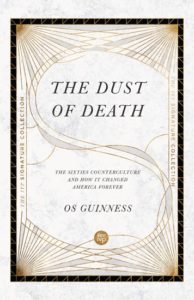 The Dust of Death: The Sixties Counterculture and How It Changed America Forever (IVP Signature Collection) Os Guinness (IVP) $24.00 | OUR SALE PRICE = $19.20 DUE SEPTEMBER 1, 2020
The Dust of Death: The Sixties Counterculture and How It Changed America Forever (IVP Signature Collection) Os Guinness (IVP) $24.00 | OUR SALE PRICE = $19.20 DUE SEPTEMBER 1, 2020I will simply have to review this more properly when we get some time; I have long said it is one of the most influential books in my own life and a personal favorite which I have revisited often since the 1970s when it first came out. It has been out of print for years, and we are thrilled that it is being re-issued with what I am sure will be an important new introduction. It was pioneering, a milestone, and it is oddly as important now as ever before. We hope many people order it and find themselves learning more than they perhaps realized about how very important the content of this book is.
Dr. Guinness is a hero of ours, a person who has encouraged me and Beth considerably and whose books we routinely name as among the most important, year after year after year. Some have been more popular than others, naturally, and I have appreciated them each differently. But there is a very special place for The Dust of Death because it was so very insightful and because it introduced me to a robust and substantive Christian worldview, illustrated that those I’d eventually learn were called evangelicals were often quite thoughtful, deeply committed to the most important matters in human life, and could be a helpful, healing movement to bring God’s perspective and redemption to bear on our very broken world. In the ’70s, as I recall, there simply was no book like this that grappled with the things the late and post 60s generation was taking in.
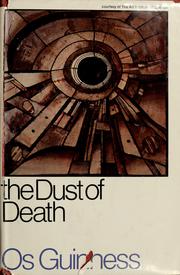
And so, the
Dust of Death uses brilliant analysis and wonderful prose to explore the strengths and weaknesses of the culture and the counterculture. Guinness visited the US (from England) in 1968 and some of his experiences and many, many conversations make their way into this major book. It seemed at the time to be offering a very profound critique of the right and the left, and a serious hope which Guinness nicely and somewhat evocatively called “a third way.” I had never seen anything like it.
This was before the rise of the Christian right, of course, before the hardening of the American left, during the time of domestic bombings and airplanes being highjacked, Black power salutes at the Olympics, Woodstock, Watergate, the rise of mysticism and a rise in post-rationalist fantasy literature. There had been a philosophy of drug use and yet there was a revival among the youth — Jesus Freaks we sometimes called ourselves.
By the turn of that pivotal decade, The Beatles had broken up, youth pop culture was influencing fashion and TV, and by the mid-70s Nixon was out and disco was in; the times they were a-changin’. And yet with social change movements still doing civil disobedience and massive protests, alongside the increasing bureaucracies emerging everywhere, the contrast between the culture and the counterculture deepened. And few Christians offered incisive, Biblically-informed analysis let alone wisdom on “how should we then live.” Guinness pointed in the right direction and my discipleship was shaped in decisive ways. I thank God for this author and for this book.
The Dust of Death is being reprinted, happily, by its original publisher and it will take its place alongside a growing shelf of “Signature Classics.” These are books that IVP has found to be influential and classic, important to be reintroduced to a new generation. For instance, my friend Steve Garber (another who was influenced by the seriousness of the vision behind Guinness’s Dust of Death, by the way) recently did a wonderful new introduction to a “Signature Classics” re-release of Francis Schaeffer’s The God Who Is There, which has been in print for over 50 years. I happen to have a nice blurb on the inside of the great handbook for basic Christian growth called The Fight by John White, also just re-issued. In the last BookNotes I shared my enthusiasm for the re-issue as a “IVP Signature Classic” the great, great book by Carl Ellis called Free at Last?: The Gospel in the African American Experience.
Later this Fall we will see the beloved allegory of Christ come to Earth that was once hugely popular, The Singer by the great Calvin Miller.
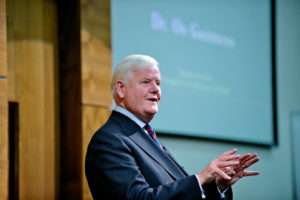 This whole series is to be commended and we are glad for some older books from decades ago re-appearing with new covers and some new introductions explaining why they are still so relevant. Among them all, I think The Dust of Death:The Sixties Counterculture and How It Changed America by Os Guinness is perhaps the most significant, and we invite you to pre-order it now. It would make us glad and you will be challenged to think well about our American past in these past generations. Thanks for caring.
This whole series is to be commended and we are glad for some older books from decades ago re-appearing with new covers and some new introductions explaining why they are still so relevant. Among them all, I think The Dust of Death:The Sixties Counterculture and How It Changed America by Os Guinness is perhaps the most significant, and we invite you to pre-order it now. It would make us glad and you will be challenged to think well about our American past in these past generations. Thanks for caring.
“Anyone interested in the history of evangelical Christianity in the US during the turbulence of the sixties should read this thoughtful cultural analysis, which not only critiqued the establishment and the counter culture but also, since its publication fifty years ago, has shaped a generation of American evangelicals. Os Guinness stands in a line of Europeans—including Alexis de Tocqueville, G. K. Chesterton, and Frances Trollope—who have helped us see ourselves in the context of world history and cultures. Whether you find The Dust of Death prophetic or myopic, enlightening or provoking, it will most definitely make you think. It may also engender your hope for the future of the Christian faith in even our, again, very turbulent times.” Susan S. Phillips, executive director and professor of sociology and Christianity at New College Berkeley, author of The Cultivated Life
“To make sense of contemporary ‘mainstream’ America, one has to understand the countercultural revolution of the 1960s. The ‘dust of death’ it threw up is now settling across every aspect of American life. Os Guinness’s study of that movement remains a magisterial work—nothing short of required reading for anyone seeking wisdom and understanding to cope with its challenges in this present day.” J. Stanley Mattson, founder and president of the C. S. Lewis Foundation
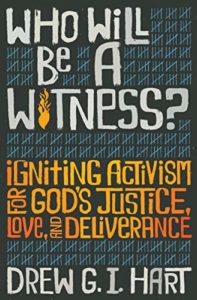 Who Will Be a Witness? Igniting Activism for God’s Justice, Love, and Deliverance Drew G.I. Hart (Herald Press) $18.99 | OUR SALE PRICE = $15.19 DUE SEPTEMBER 1, 2020
Who Will Be a Witness? Igniting Activism for God’s Justice, Love, and Deliverance Drew G.I. Hart (Herald Press) $18.99 | OUR SALE PRICE = $15.19 DUE SEPTEMBER 1, 2020
I hope you know Drew Hart’s very important, well written and honest analysis of racism, his 2016 Trouble I’ve Seen: Changing the Way the Church Views Racism. We’ve promoted it the best we could and taken it to almost every event we’ve done these past years. Partially, we promote it earnestly because it’s clear and accesible, honest and raw, Biblical and faithful. Also, it is set partially here in Central Pennsylvania and Hart narrates some time living in urban Harrisburg. He got his PhD from the Lutheran Seminary in Philadelphia (now called United Lutheran Seminary having merged in 2017 with Gettysburg Lutheran Seminary) and is a popular professor at Messiah College. When a local author makes such a contribution, we’re eager to get the word out.
 Which is why we’d are very eager to encourage you to pre-order this riveting, blistering, vitally urgent new book. Who Will Be a Witness? is, I am sure, one of the books that will be used to encourage those wanting to move beyond sadness about racial injustice to bold action and faithful public reform. Hart has evolved as an ecumenical public theologian and here interacts with a variety of voices from the breadth of church history — the early church fathers, Augustine, the Anabaptists, American black heroes (Ida B. Wells, Howard Thurman, the radical King, Vincent Harding), various liberation theologians, and vital contemporary thinkers from Chad Meyers to N.T. Wright to Alan Kreider. It is a mature study, indeed, but with the feel of a manifesto.
Which is why we’d are very eager to encourage you to pre-order this riveting, blistering, vitally urgent new book. Who Will Be a Witness? is, I am sure, one of the books that will be used to encourage those wanting to move beyond sadness about racial injustice to bold action and faithful public reform. Hart has evolved as an ecumenical public theologian and here interacts with a variety of voices from the breadth of church history — the early church fathers, Augustine, the Anabaptists, American black heroes (Ida B. Wells, Howard Thurman, the radical King, Vincent Harding), various liberation theologians, and vital contemporary thinkers from Chad Meyers to N.T. Wright to Alan Kreider. It is a mature study, indeed, but with the feel of a manifesto.
And, I really enjoyed that Professor Hart, in nice teacherly fashion, often narrates the book in first person, saying what he learned in this book or why he loves this Biblical text or that contemporary social critic. That is, there are moments of good scholarship and deep theological formation but the writing is conversational, making the material accesible. That doesn’t mean he just dumbs it down; no. He’s just a good teacher and good writer, and we get to learn along with him as he teases out the implications of Scripture and history and modern writers. It’s a very good book.
Not only is Who Will Be a Witness? energetic and crisply written and clear, it does offer instruction on things congregations can do. It is a call to action and a guide to actually getting involved. There are chapter titles such as “The Politics of the Church” and “Justice and the Worshipping Community” that point to his deep ecclesiology. And there are chapters like “The Things That Make for Peace: Conducive Strategies for Ecclesial Grassroots Justice Work.” It’s an exciting chapter, actually and shows how to actually live out, locally, his call to be part of a “politics of love.” Professor Hart knows enough to know that we need on-ramps and helpful advice, even some maps and compasses, if not exactly blueprints.
As thoughtful and challenging as Who Will Be a Witness? Igniting Activism for God’s Justice, Love, and Deliverance will be for some, it will be very useful for many that want to take next steps towards incarnating the ways of Christ and to be the radical community of disciples to which He calls us.
Drew Hart has written the most challenging and enriching book that I have read in a very long time — a book brimming over with moral urgency, uncommon wisdom, and spiritual insight. At its core, it summons the church to do what the American church has seldom done — to discern and then burst the bonds of nationalism, capitalism, American exceptionalism, and white supremacy, and to embrace instead the revolutionary vocation of Jesus…
Richard Hughes, author of Myths America Lives By: White Supremacy and the Stories That Give Us Meaning
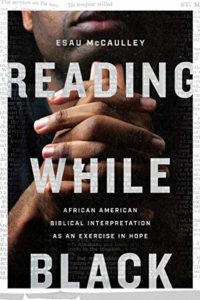 Reading While Black: African American Biblical Interpretation as an Exercise in Hope Esau McCaulley (IVP Academic) $20.00 | OUR SALE PRICE = $16.00 DUE SEPTEMBER 1, 2020
Reading While Black: African American Biblical Interpretation as an Exercise in Hope Esau McCaulley (IVP Academic) $20.00 | OUR SALE PRICE = $16.00 DUE SEPTEMBER 1, 2020
In some circles in which we travel — especially among the staff of the CCO (Coalition for Christian Outreach) — this has been the most anticipated book of the year. Dr. McCaulley (who teaches Biblical studies at Wheaton College) has done some of our staff training for CCO and last year spoke at the Pittsburgh Jubilee Conference. To say he was appreciated is putting it mildly; his wit and Biblical insight, his candor about race and commitment to rigorous evangelical hermeneutics was powerful. Young adults (mostly white, but not all) adored his academic insight, his pastoral care, and his prophetic willingness to speak the truth in love. He is an Anglican Canon, has worked with churches in Japan and Scotland, and brings an important appreciation for how the local church is shaped by worship and he draws here on a variety of approaches and moves learned from the heart of the African American church. He got his PhD, by the way, under N.T. Wright at Saint Andrews.
There have been other books collecting essays on black Bible reading, on African American hermeneutics, even on black woman’s hermeneutics. Reading While Black not only has a great, punchy title, but brings a unique level of insight and Anglican faith to this project. Our friends who have pre-ordered it already have reason to be on the waiting list. Dr. Esau McCaulley is a vital rising voice (catch his blogs and podcasts, too) and this new book is very, very important.
I think the publicity from the publisher puts it well, so I will share that for your consideration:
Growing up in the American South, Esau McCaulley knew firsthand the ongoing struggle between despair and hope that marks the lives of some in the African American context.
A key element in the fight for hope, he discovered, has long been the practice of Bible reading and interpretation that comes out of traditional Black churches. This ecclesial tradition is often disregarded or viewed with suspicion by much of the wider church and academy, but it has something vital to say. Reading While Black is a personal and scholarly testament to the power and hope of Black biblical interpretation. At a time in which some within the African American community are questioning the place of the  Christian faith in the struggle for justice, New Testament scholar McCaulley argues that reading Scripture from the perspective of Black church tradition is invaluable for connecting with a rich faith history and addressing the urgent issues of our times. He advocates for a model of interpretation that involves an ongoing conversation between the collective Black experience and the Bible, in which the particular questions coming out of Black communities are given pride of place and the Bible is given space to respond by affirming, challenging, and, at times, reshaping Black concerns. McCaulley demonstrates this model with studies on how Scripture speaks to topics often overlooked by white interpreters, such as ethnicity, political protest, policing, and slavery. Ultimately McCaulley calls the church to a dynamic theological engagement with Scripture, in which Christians of diverse backgrounds dialogue with their own social location as well as the cultures of others. Reading While Black moves the conversation forward.
Christian faith in the struggle for justice, New Testament scholar McCaulley argues that reading Scripture from the perspective of Black church tradition is invaluable for connecting with a rich faith history and addressing the urgent issues of our times. He advocates for a model of interpretation that involves an ongoing conversation between the collective Black experience and the Bible, in which the particular questions coming out of Black communities are given pride of place and the Bible is given space to respond by affirming, challenging, and, at times, reshaping Black concerns. McCaulley demonstrates this model with studies on how Scripture speaks to topics often overlooked by white interpreters, such as ethnicity, political protest, policing, and slavery. Ultimately McCaulley calls the church to a dynamic theological engagement with Scripture, in which Christians of diverse backgrounds dialogue with their own social location as well as the cultures of others. Reading While Black moves the conversation forward.
“I’m extremely grateful to have a voice in my time to speak with nuance, grace, and cultural awareness. Esau has given us a healthy marriage for understanding theology and blackness. This is a must-read!” Lecrae, hip hop recording artist
“It is enlightening, moving, and galvanizing to overhear these notes of appreciation and reciprocated encouragement from a son of the Black church to the Black ecclesial interpreters who nurtured and continue to nourish him. From here on out, this book will be required reading in any course on biblical hermeneutics that I teach.” Wesley Hill, associate professor of biblical studies, Trinity School for Ministry
“When I was a student, I was explicitly and implicitly trained to focus exclusively on the ancient context of Scripture and read ‘objectively.’ Bible study could easily become a disembodied experience. McCaulley makes a compelling case, in this engagement with African American biblical interpretation, that not only is the reader’s culture and experience not a hindrance to interpretation per se but can enrich it greatly. Reading While Black is a unique and successful blend of biblical hermeneutics, autobiography, black history and spirituality, incisive cultural commentary on race matters in America, and insightful exegesis of select New Testament texts.” Nijay K. Gupta, professor of New Testament at Northern Seminary
“Esau McCaulley’s voice is one we urgently need to hear. This book is prophetic, biblical, measured, wise, friendly, and well-reasoned—and thus all the more hard-hitting. A powerful word for our times.” N. T. Wright, professor of New Testament at the University of St Andrews, senior research fellow at Wycliffe Hall, Oxford
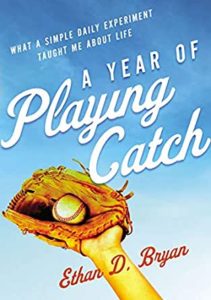 A Year of Playing Catch: What a Simple Daily Experiment Taught Me about Life Ethan D. Bryan (Zondervan) $18.99 | OUR SALE PRICE = $15.19 DUE SEPTEMBER 8, 2020
A Year of Playing Catch: What a Simple Daily Experiment Taught Me about Life Ethan D. Bryan (Zondervan) $18.99 | OUR SALE PRICE = $15.19 DUE SEPTEMBER 8, 2020
I’ve been waiting to tell you about this book for a while — it is a book that is so interesting and earnest and honest and inspiring and fun that I think it could become a huge cross-over best seller.
A Year of Playing Catch has it all. Baseball? Check. Playfulness? Check. Family-focused? Check. Social justice minded? Memoir? History? Check, check, check. Faith? Yes. Well written? Yes, yes. I don’t know the magic that allows a book to become truly famous but I invite you to spread the word on this winner of a book that will most likely best be described as a sleeper. Surprisingly, it’s awesome. And it really should take off, like his beloved Kansas City Royals unexpectedly did a few year back.
 Let me get this out of the way: Ethan has been a good friend of our store and I’ve reviewed his other sports-related books (he’s a Royals fan, did I mention?) and book about him and his dad, a book about music, a wonderful little kid’s book, and his splendid back-to-high-school novel Dreamfield. He did a book about playing catch to raise awareness about human trafficking and
Let me get this out of the way: Ethan has been a good friend of our store and I’ve reviewed his other sports-related books (he’s a Royals fan, did I mention?) and book about him and his dad, a book about music, a wonderful little kid’s book, and his splendid back-to-high-school novel Dreamfield. He did a book about playing catch to raise awareness about human trafficking and  set captives free cleverly called Catch and Release. I’m mentioned in at least one of them, and I’m grateful. But, look: my reputation as bookseller and reviewer won’t last if I rave about books just because friends wrote them or because I happen to like the character and lifestyle of the author. Lots of great people do bad books and (also true) bad people do some great books.
set captives free cleverly called Catch and Release. I’m mentioned in at least one of them, and I’m grateful. But, look: my reputation as bookseller and reviewer won’t last if I rave about books just because friends wrote them or because I happen to like the character and lifestyle of the author. Lots of great people do bad books and (also true) bad people do some great books.
I gotta call ’em as I see ’em.
It really is special when truly wonderful people hone their craft, work hard at being a writer, write small books, self publish, offer poetry and stories and songs for free, putting themselves and their art out there for the good of others. And it is really special when somebody in the big leagues recognizes them and give them their big break. With a major publisher working with Ethan now, I couldn’t be happier. He deserves it.
He deserves to have this book be widely known also because it is such a oddly fascinating little story. He decided to play a game of catch every day for a year with at least 365 different people. It’s one of those from the field reports of a year-long experiments, clever reality journalism. I did not participate, although I’ve been kicking myself for a year that I didn’t. (Maybe in the sequel, Ethan!) Whether one is a baseball fan or not, whether one has good memories of playing catch as a kid –and he discovered that many do, often children with their dads, which becomes important, as you can imagine — Playing Catch is a page turner where in quiet sorts of ways, Ethan brings really important stuff to the fore. He writes about fear and hope, about goals and social change, about family and hospitality, about sexism and racism, about money and power, about seeing the good in others as we listen to their stories. In his gentle, nice way, he notices a lot and it is worth listening to him tell us about it. Plus, the antics he has to preform to make this daily dream a reality is captivating. The drama makes this quixotic plan that took him across the country into a very good story and a really great book.
Give this book to anybody who has ever put on a glove or pitched a ball back and forth. Certainly give it to anybody who is interested in baseball history. (I won’t give a way too much, but if you like the movie Field of Dreams you’ve got to read this. And if, like Beth and I, you adore A League of Their Own, you have got to pick this book up right away.)
Give it to anybody who likes to goof around, or maybe better, to anyone who has become too busy and forgotten the value of play. Do you want to find joy in simple things? Read A Year of Playing Catch.
But as much baseball as is in this sparkling, surprising book, I’d say give it to anybody who likes to read a wholesome story about a crazy dream and pulling it off. Who wants to make a difference. Who believe in the power of grace and redemption. Do you like Bob Goff? Ethan is a small town Bob Goff. A Year of Playing Catch tells his story of this unexpected ministry. Ethan is a blast his hope is contagious. He has a bag of gloves in his old car to prove it. He’ll share them with you.
“This book is a gem like baseball itself — everyday, interesting, thoughtful and funny. It is an inside the book home run.” Robert Benson, author of The Game: One Man, Nine Innings & a Love Affair With Baseball
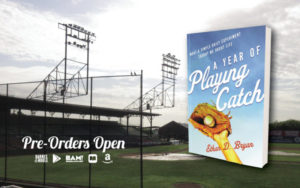
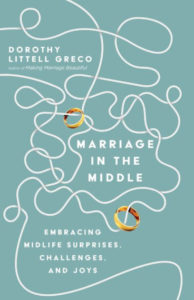 Marriage in the Middle: Embracing Midlife Surprises, Challenges, and Joys Dorothy Littell Greco (IVP) $16.00 | OUR SALE PRICE = $12.80 DUE SEPTEMBER 15, 2020
Marriage in the Middle: Embracing Midlife Surprises, Challenges, and Joys Dorothy Littell Greco (IVP) $16.00 | OUR SALE PRICE = $12.80 DUE SEPTEMBER 15, 2020
I cannot say much about this as we have not seen the manuscript — just one of my little Covid complaints — but I am positive that it is a book we want to honor, celebrate, promote. We encourage you to consider it, even if you aren’t in the mid-life years of marriage. And if you are, I’m sure it is a must-read.
I am eager to say at least these three main things and hope our readers take them to heart: these odd times of quarantine has hurt extended families in many ways and has made supportive community (small groups, dinner parties, book clubs) hard to come by. This sad season has, for many, been hard on family life, intimacy, and marriage. Almost everyone can benefit from a good family or marriage book from time to time and I recommend reading something along these lines at least once a year. But now, with the extra stresses and complications we would be wise to go out of our way — be intentional as the kids say — to strengthen up our relationships. Reading Dorothy Greco will be nicely helpful, at the very least; maybe marriage saving, even for those who might really need it. These times certainly call for some extra help for all of us and we happily recommend her as an author whose books can serve as a friend, guide, conversation partner; it’s cheaper than couple’s therapy, eh? So, know that you are not alone in this and you’ve can get help. That’s first: the time is right to read this book, or something like it.
Secondly, I’m very eager to remind you that we loved Ms Greco’s previous book on marriage that we have commended often for any number of good reasons. It is called Making Marriage  Beautiful: Lifelong Love, Joy, and Intimacy Start with You (David C. Cook; $16.99) and we liked it just because of how nicely it was written with this theme of beauty and goodness, and how it avoided many of the cliches and downright offensive stuff found in many Christian marriage books. I trust her voice, her theology, her wisdom, and her cultural concerns — speaking out for the dignity of women, the rights of immigrants, the worth of the poor — so her earlier Making Marriage Beautiful or the forthcoming Marriage in the Middle are great and reliable gifts. Frankly, most of the best marriage books are written by men, so it is good to have couples read a thoughtful and writerly woman for a change. She is an author whose name you should know.
Beautiful: Lifelong Love, Joy, and Intimacy Start with You (David C. Cook; $16.99) and we liked it just because of how nicely it was written with this theme of beauty and goodness, and how it avoided many of the cliches and downright offensive stuff found in many Christian marriage books. I trust her voice, her theology, her wisdom, and her cultural concerns — speaking out for the dignity of women, the rights of immigrants, the worth of the poor — so her earlier Making Marriage Beautiful or the forthcoming Marriage in the Middle are great and reliable gifts. Frankly, most of the best marriage books are written by men, so it is good to have couples read a thoughtful and writerly woman for a change. She is an author whose name you should know.
Thirdly, this book does fill a real need, that of the middle aged readers for whom the latest martial spat or joy is not their first rodeo. Many otherwise fabulous marriage books seem to be written (and some obliviously are) for newly weds or the fairly young. Not Marriage in the Middle which takes the mid-life stage of life seriously. I happen to know she did a ton of research on this, and there is a section in the book that narrates a whole batch of fascinating, illuminating interviews she did with couples talking about the ups and downs, challenges and joys, of this particular season of life. As the publisher has written,
Midlife is a season of challenge and change–professionally, relationally, physically, and spiritually. But “midlife” doesn’t have to be synonymous with “crisis” within our marriages. With vulnerability and insight, this book will inspire and encourage you to invest in your relationship with your spouse, enabling you both to thrive as you face this era together.
There will be plenty here for all sorts of readers, from the first interesting chapter (“The Paradox of Midlife Marriage: Crisis of Opportunity?”) to good writing on the “telos” of the whole marital thing. She looks at sex, disappointment, changes, sex, community. (“We’ll get by with a little — or a lot — of help from our friends.”) The blurbs on the back are from a wide range of folks, including many who are racial and ethnic minorities — I am grateful that this suggests the book is sensitive (as I am sure it is) to a variety of social settings for those of us in these mid-life marriages. She suggests, I believe, that the book is ideal for readers ages 40 – 65. Yay.
I so appreciate this commendation quote by an early reader:
I am so grateful for this book and for Dorothy Greco. After forty-two years of marriage, typical marriage books just don’t cut it. I need a book and an author who gets the wildly textured ups and downs of long, shared histories, who still can inspire me forward. Greco does this brilliantly. She has woven together an astonishing blend of research, theology, interviews, and personal stories; I am nearly breathless with insight and encouragement. This book will change your marriage.
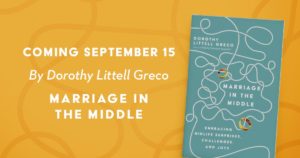
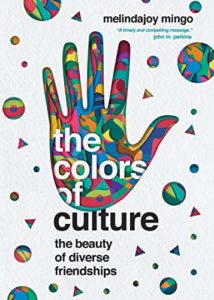 The Colors of Culture: The Beauty of Diverse Friendships Melindajoy Mingo (IVP) $14.00 | OUR SALE PRICE = $11.20 DUE SEPTEMBER 15, 2020
The Colors of Culture: The Beauty of Diverse Friendships Melindajoy Mingo (IVP) $14.00 | OUR SALE PRICE = $11.20 DUE SEPTEMBER 15, 2020
This was one of those books that was delayed in its Spring release date by the complications of the Covid-19 virus and pandemic but we are truly glad to be able to announce it now, here. This is a book that should be of great interest to so many good folks and we hope a lot of people consider it. It is in that sweet spot of being thoughtful and well informed by serious cross-cultural scholarship, theology, and ministry experience and, yet, is a pretty simple guidebook, a very useful tool, like a honest conversation with a savvy friend who can tell you what you really need to know. There are stories from all over the world showing how many different sorts of cultural “colors” can cross barriers and set aside (often through mistakes and struggle) prejudice and bias and become real friends.
We are glad that there has been a huge uptick in reading about racial justice; nation-wide it is an unexpected phenomenon. The murder of George Floyd and too many leaders less than sensitive to the deep pain experienced by people of color in this country in the weeks following (as witnessed by the knee jerk conservative reactions to much of the BLM protests) just pushed many of us from vague interest to intentional action, wanting to learn, to listen, to read, to become allies. We have sold many copies of How to Be An Antiracist and White Fragility and Color of Compromise and I’m Still Here. From Stamped from the Beginning to Cone’s Cross and the Lynching Tree to Eric Mason’s Woke Church there has been deepening desires to understand and dismantle institutional racism and systemic injustices. Some might say “it’s about time” but, no matter, we are grateful. We are proud of our Hears & Minds customers for taking this up so eagerly.
And yet. We must all reach out beyond our (often) homogeneous reading groups and (usually) fairly mono-culture churches and workplaces and, well, develop cross cultural friendships. We have books about this, but many seem rather heady about cultural theories and anthropology, maybe written for cross cultural travelers or missionaries. Call us if you need a list. But for fairly ordinary folks wanting to be more culturally and ethnically intelligent so that he or she might be a better friend to folks from others cultures, The Colors of Culture by this lovely educator and pastor and Christian leader is just what is needed. Don’t you just love the sub-title — “the beauty of diverse friendships”? This surely is a great little book and we are happy to celebrate its release this fall.
 MelindaJoy Mingo is an ordained minister, professor, cultural capacity expert, and entrepreneur based in Colorado Springs. She is the founder of Je-Nai International Ministry and Significant Life Change, Inc., and has developed multicultural initiatives both at home and abroad. She holds a PhD in global leadership and an honorary doctorate in urban transformative leadership and has been widely recognized for her teaching and training in cross-cultural competency.
MelindaJoy Mingo is an ordained minister, professor, cultural capacity expert, and entrepreneur based in Colorado Springs. She is the founder of Je-Nai International Ministry and Significant Life Change, Inc., and has developed multicultural initiatives both at home and abroad. She holds a PhD in global leadership and an honorary doctorate in urban transformative leadership and has been widely recognized for her teaching and training in cross-cultural competency.
Listen to these beautiful and energetic endorsements, all recommending that folks consider The Colors of Culture:
“A must-read with an open embrace is right here in The Colors of Culture! This book is an astounding body of work with truth and remedy on topics that have been misinterpreted and misunderstood for far too long. The message in this book comes straight from our Holy Great Spirit Creator. Dr. MelindaJoy’s compelling accounts of humanness come through both her personal life’s encounters and how she has observed others. This is evidenced in how she has built relationships and bridges in places that are close to her heart.
“I am honored to say that we have more than ten years of working together both on the reservations, within the inner cities, and in multicultural communities all over Turtle Island (US). She is one who makes no apology in the book with regard to her ancestry or her birthright and has a remarkably rooted confidence in her beautiful indigenous (Native First Nation and African) heritage. She is both compassionate and courageous with her message during this moment in time and presents a compelling viewpoint of our humanness and how we intersect in life with others more than we realize.
“The Colors of Culture is a sacred bundle of wisdom and truly an eloquent delivery of raw remedy. I will strongly suggest this book to my First Nations people. Pilamaya~in gratitude.” Cahuilla K. M. Red Elk, retired tribal attorney, founder and CEO of the Center on Human Rights and American Indian Law Advocacy
“You need to read The Colors of Culture with an open heart and posture of a learner! The message woven throughout the book of stepping out of our places of comfort and being intentional in building authentic relationships in order to reach diverse people is needed now in our society more than ever before.
“Dr. MelindaJoy Mingo brings a fresh, new, and powerful voice in the arena of unity, diversity, and the role of the gospel in moving us beyond past hurts to the beauty and joy of cultivating and sustaining diverse relationships. The winsome art of personal storytelling from around the world allows us to follow the message of the value and worth of all people while pointing to deeper implications of change that occur when we allow the truth of the gospel to bring transformation in our lives and those we journey with in life. This book is written with authenticity of heart and the truth of the gospel. It will be both a joyful and thought-provoking read. This book presents a timely and compelling message not just for this generation but for generations to come.” John M. Perkins, cofounder and president emeritus of the John and Vera Mae Perkins Foundation and Christian Community Development Association
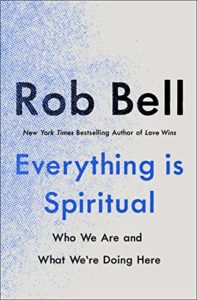 Everything Is Spiritual: Who We Are and What We’re Doing Here Rob Bell (St. Martin’s Press) $27.99 | OUR SALE PRICE = $21.60 DUE SEPTEMBER 15, 2020
Everything Is Spiritual: Who We Are and What We’re Doing Here Rob Bell (St. Martin’s Press) $27.99 | OUR SALE PRICE = $21.60 DUE SEPTEMBER 15, 2020
I wondered if I needed to put this here as a great one to pre-order since, well, a lot of folks have given up on the relevance of Bell’s books to their current lives. And those that do follow him are true fans and probably ordered it at some slick place a half a year ago. If I recommend him, some will roll their eyes (unfairly, I think) and others will be glad, but not place an order.
Still, I loved Rob’s work when he was doing sort of stand up lectures out at clubs and bars and cool lecture venues. Some of you will recall that he filled up a big white board writing stuff about quantum physics. It was better (and longer) than a TED talk, but that sort of extended stand up performance art, half lecture, half storytelling, half testimony and half comedy. That that doesn’t add up is part of the mystery — okay, that’s my dumb joke; he is much deeper than than. There was a DVD of that lecture tour called, yep, Everything Is Spiritual and I gather that this book is drawn from those electrifying presentations.
(Watch these couple minutes of Rob Bell on Youtube to see a quick glimpse of a small portion of the old “Everything is Spiritual” presentation. You can find the whole out there if you want, I bet.)
Can understanding the creation’s intricacies and postmodern science help us know who we are? Job 12:8 says so, so maybe Bell is on to something. I haven’t see the book yet, but wanted to suggest you pre-order it now if you’d like and we can send it out as soon as it arrives mid-September.
Preacher, justice activist, and author of Tears We Cannot Stop, Michael Dyson, says this about this forthcoming book:
In Everything Is Spiritual, Rob Bell updates Teilhard de Chardin’s Catholic mysticism, makes sexier Werner Heisenberg’s quantum physics, and baptizes Jewish Kabbalah in an exciting vision of the future of human evolution. Bell challenges the notion that science and belief are at war with his sublime fusion of Christian faith and modern evolutionary science. Bell’s book is the perfect antidote to the plague of an evangelical worldview that is captive to imperial dreams and a literalism that kills the spirit of Christianity. Everything Is Spiritual is a bracing and stirring manifesto for a fresh contemporary vision of an ancient faith
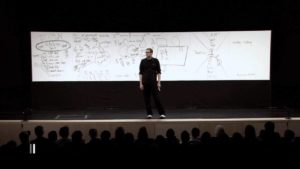
That may or may not be all that’s going on in this forthcoming release that is sure to be talked about and even critiqued (fairly, and unfairly, I’d bet) this fall. I’m sure it will be interesting and provocative and, like his pal Mike the Science Guy McHargue, will appeal to many. There are other books to read that are more precisely about science, some written by very solid theologians who also have degrees in science; you could start with Francis Collins or Deborah Haarsma. But this Bell book, too, could be a really stimulating read for those who aren’t going to wade through Alister McGrath or John Lennox or even John Polkinghorne. Give us a call if you want some of those sorts. If you want to pre-order Everything Is Spiritual, we’d be delighted to send it out as soon as it hits.
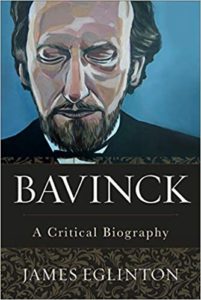 Bavinck: A Critical Biography James Eglinton (Baker Academic) $44.99 | OUR SALE PRICE = $35.99 DUE SEPTEMBER 29, 2020
Bavinck: A Critical Biography James Eglinton (Baker Academic) $44.99 | OUR SALE PRICE = $35.99 DUE SEPTEMBER 29, 2020
I don’t know if we’ll have bunches of folks rushing to buy this hefty historical biography (480 pages) but I hope we do. I’m telling you, in so many ways, Herman Bavinck (1852-1921) was a fascinating figure, and hugely important thinker and activist and apologist for a sort of faith that demands our all because Christ is the King of all areas of life. Some say he helped define what has become known as neo-Calvinism with its emphasis on a truly intregal/organic Christian philosophical world and life view. Bavinck was one of the enduring conversation partners with the more famous Abraham Kuyper whose life and teaching transformed much of Holland and certain set the stage for a certain sort of cultural engagement in the middle of the 20th century onward here in North America.
He not only argued for a broad vision of redemption and public theology, but also needed to engage a modernist threat within theology and culture. He in his life was in discussion with (modern theologian) Schleiermacher on one hand and coping with the rise of a Nietzsche cult in Holland. He grappled with issues of faith as it relates to science, the existential threat of the nihilists, and the deep philosophical questions about the nature of the human person.
If any Dutch Reformed theologian needs to be better understood alongside Kuyper, Bavinck is the one. And if anybody — anybody — in the world should be chosen to help us, it is the extraordinary scholar (and, let’s just say it, fanboy) the eminent Scottish scholar James Eglinton. Dr. Eglinton earned his PhD from the prestigious University of Edinburgh and is Meldrum Senior Lecturer in Reformed Theology at the University of Edinburgh in Edinburgh, Scotland. He previously served as senior researcher in systematic and historical theology at the Theologische Universiteit Kampen. Eglinton is the author or editor of several books, including Herman Bavinck on Preaching and Preachers. He also serves as associate editor of the Journal of Reformed Theology. He brings some new insights to Bavinck studies — or so I gather; in a stimulating introduction he says as much — and for this, many who realize the importance of this stuff are very grateful.
Here is a couple of minutes dialogue with Eglinton about Bavinck (and his relationship with Kuyper) and why Calvinism ought to be seen as a big and broad theology to see how the gospel can inform every area of life. Both lectured at Princeton in the early 1900s and neither felt their American audience quite got it. Here is an hour-long conversation (with Dr. Eglinton only one of several guests) on their translation of a book on worldview by Bavinck. There is a bit of a renaissance of Bavinck studies, so this is good to know about. And here is a delightful lecture in honor of Bavinck by Richard Mouw, given last year in Holland. Some of the ideas here are nicely shared in his new book All That God Cares about: Common Grace and Divine Delight. More on that, soon.
Eglinton’s big forthcoming biography is obviously “impeccably researched” as Kristen Deede Johnston (author of The Justice Calling) from Western Seminary has said, but it is also accessible. It is informative about the wide ranging theological and cultural work in which Bavinck was engaged and it somehow make it relevant for us a century later.
Just take in these excellent assessments of the importance of this forthcoming volume:
“When it comes to theologians that contemporary church leaders should be reading, I don’t know of a more important one than Herman Bavinck. No one can grasp the theology of an Augustine or Aquinas, a Calvin or Luther, without knowing their life and context. James Eglinton has provided this in his new critical biography of the greatest Reformed theologian of the twentieth century. A very important yet highly readable volume.”
— Timothy Keller, pastor emeritus, Redeemer Presbyterian Church of New York City”Impeccably researched and thoroughly readable, James Eglinton’s biography of Herman Bavinck deserves a wide readership. As Eglinton invites us into Bavinck’s faithful and creative engagement with pluralism, psychology, Nietzsche, education for women, evangelism, missions, racism in America, and politics, we see that we still have much to learn from this member of the great cloud of witnesses.”
— Kristen Deede Johnson, Western Theological Seminary”Eglinton demonstrates that Bavinck was a brilliant, creative theologian. For those who are discovering that brilliance in Bavinck’s writings newly translated into English, we now have the gift of a wonderfully readable and informative narrative of Bavinck’s spiritual and theological journey. This important book confirms what many of us have been convinced of for some time now: Bavinck’s time has come as a world-class theologian for our own day.”
— Richard Mouw, president emeritus, Fuller Theological Seminary
“Eglinton is the modern biographer Herman Bavinck deserves. Eglinton is a theologian who is inspired by Bavinck’s search for an orthodox engagement with the modern world, knows this world and Bavinck’s works well, reads them in Dutch, has researched Bavinck’s papers meticulously as a historian, and composes and writes smoothly, as Bavinck himself did. What a treat that Bavinck has this kindred spirit as biographer.”
— George Harinck, historian, The Neo-Calvinism Research Institute, TU Kampen
“Eglinton’s biography of Bavinck is outstanding. Scholarly but accessible, it offers an account of Bavinck’s life and work in its historical context. The picture that emerges here is neither that of a reactionary conservative nor that of a man divided against himself, as others have claimed, but that of a churchman navigating the waters of modernity with the tools of a deep and devout theological tradition. A wonderful companion volume to the Dogmatics.”
— Carl R. Trueman, Grove City College
“In James Eglinton, Herman Bavinck has the biographer he so richly deserves, his own Scottish James Boswell. Using fresh archival sources, Eglinton provides new insights into the man, the churchman, and the thinker who was, alongside Abraham Kuyper, the most important figure in the revival of Dutch Calvinism in the nineteenth and twentieth centuries. Through careful historical research Eglinton places Bavinck in his broader intellectual and spiritual context as a modern person and effectively challenges some of the oft-repeated myths about him and his secession Christian Reformed community. This will be the definitive Bavinck biography for generations.”
— John Bolt, Calvin Theological Seminary (emeritus)”Here is an elegantly written and intimate portrait of a theological giant in the Reformed tradition, based on a thorough reading of all of Bavinck’s published and unpublished writings. Eglinton superbly documents Bavinck’s intense personal, spiritual, and intellectual wanderings and wonderings that ultimately led him to the creation of his four-volume masterwork on Christian dogma. This book is destined to be the standard biographical introduction to Herman Bavinck for years to come.”
— John Witte Jr., Emory University”Doctrine is forged on the anvil of life, and thus any attempt to understand a theologian’s works must factor in the foundry of personal history. Devotees of Herman Bavinck can celebrate that they now have a biography that serves this task. Eglinton has written an exceptionally well-researched account for anyone seeking to understand Bavinck and the modern Reformed tradition. Eglinton pairs in-depth research with insightful analysis. Readers will not be disappointed with the fruit of his outstanding labors.”
— J. V. Fesko, Reformed Theological Seminary, Jackson, Mississippi
“Eglinton’s critical biography of Herman Bavinck is the first that gives an in-depth account of the unity-in-diversity and diversity-in-unity of the theologian’s thought and life. I can hardly express how grateful I am for this publication. I cannot wait to see how Eglinton’s biography reshapes our understanding of Bavinck’s life, as well as our conceptions of Christian scholarship in particular and Christian calling in general.”
—
Shao Kai Tseng, Institute of Religious Studies, Zhejiang University, China

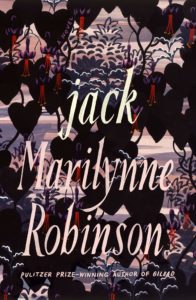 Jack: A Novel Marilynne Robinson (Farrar, Straus and Giroux) $27.00 | OUR SALE PRICE = $21.60 DUE SEPTEMBER 29, 2020
Jack: A Novel Marilynne Robinson (Farrar, Straus and Giroux) $27.00 | OUR SALE PRICE = $21.60 DUE SEPTEMBER 29, 2020
Oh my, I’m saving the best for last — at least that is what some will surely say. This is the publishing world’s biggest announcement this fall (perhaps this year) and many of our friends have had hearts aflutter over this, rightfully so. Us too. Can you believe it? After the artistic, literary and even theological genius of Gilead, Home, and Lila, followed by years of several dense, mature, literary collections culled from her writing in the nation’s leading journals, years of projects as diverse as editing a collection of John Calvin’s work to interrogating the meaning of modern thought (see, The Death of Adam, for instance, or the extraordinary What Are We Doing Here essays), after that, who expected a fourth book in the series about these Iowa church families?

(AP Photo/Charlie Neibergall)
Jack is a character that appears in her novels that have won a Pulitzer Prize, two National Book Critics Circle Awards, and a National Humanities Medal, which are considered by some to be among the great works of contemporary American fiction.
Jack is actually the character John Ames Boughton, the prodigal son of Gilead’s Presbyterian minister, the Rev. Boughton. Robinson tells the story of John and his romance with Della Miles, a high school teacher who is also the child of a preacher. As the publisher notes, “Their deeply felt, tormented, star-crossed interracial romance resonates with all the paradoxes of American life, then and now.”
We in the bookselling biz often look to reviews from these sorts of industry sources. These are important comments, and I hope they inspire you to take up these works this fall.
“A sometimes tender, sometimes fraught story of interracial love in a time of trouble . . . The story flows swiftly — and without a hint of inevitability — as Robinson explores a favorite theme, ‘guilt and grace met together.’ An elegantly written proof of the thesis that love conquers all — but not without considerable pain.” Kirkus (Starred review)
Robinson’s latest glorious work of metaphysical and moral inquiry, nuanced feelings, intricate imagination, and exquisite sensuousness . . .Myriad manifestations of pain are evoked, but here, too, are beauty, mystery, and joy as Robinson holds us rapt with the exactitude of her perceptions and the exhilaration of her hymnal cadence, and so gracefully elucidates the complex sorrows and wonders of life and spirit.” Booklist (Starred review)
“Robinson’s stellar, revelatory fourth entry in her Gilead cycle . . . is a beautiful, superbly crafted meditation on the redemption and transcendence that love affords.” Publishers Weekly (Starred Review)
By the way, for those who are interested in such things, the first three in this cycle (Gilead, Home, and Lila) are being reissued with new uniform paperback covers, matching the new hardcover of Jack. We’ll have those, too, of course, by the end of the summer. Ahhhhh.
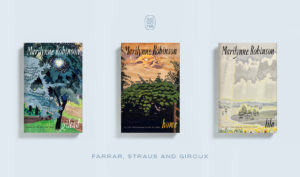
+++
When you click below you will be taken to our secure order form page at our website. Just tell us what you want. You can safely enter credit card information and we will respond within a day to thank you and confirm everything. If you’d rather just have us send to you a bill, you can do that too — there’s a place to check that at the website, too. It is helpful if you tell us if you’d prefer the slowest, cheapest manner of shipping (called media mail) or the more speedy “Priority Mail”.) Unless you have a large, heavy box, we generally don’t use UPS which is too costly for most small book packages.
PLEASE NOTE; IF YOU ARE ORDERING MORE THAN ONE, PLEASE TELL USIF YOU WANT US TO HOLD UP ONE WHEN IT COMES OUT, UNTIL ANOTHER RELEASES, CONSOLIDATING THEM TO SHIP TOGETHER –OR- IF YOU WANT US TO SEND EACH PROMPTLY AS IT RELEASES. DO LET US KNOW YOUR PREFERENCES.
BookNotes

SPECIAL
DISCOUNT
20% OFF
ANY BOOK MENTIONED
+++
this takes you to the secure Hearts & Minds order form page
just tell us what you want
if you have questions or need more information
just ask us what you want to know
Hearts & Minds 234 East Main Street Dallastown PA 17313
read@heartsandmindsbooks.com
717-246-3333
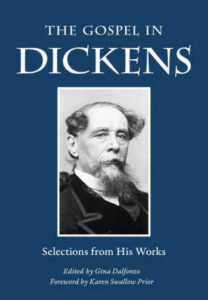 We hope you read about this event in our previous BookNotes or saw the announcement at our bookstore facebook page, but if not, please know you can join us (for free) for this virtual book launch party — okay it’s basically an interview with an author and I don’t think she’ll be wearing a party hat, but I suppose one never knows — for her brand new book, The Gospel in Dickens: Selections from His Works, compiled and edited by Gina Dalfanzo (and published by Plough Publishing House.) The Facebook Live event in this Tuesday, September 22, 2020, and I will be the host, allowing Gina to tell us about the book. We will be joined by a very special guest and conversation partner, Karen Swallow Prior who wrote the marvelous foreword to The Gospel in Dickens.
We hope you read about this event in our previous BookNotes or saw the announcement at our bookstore facebook page, but if not, please know you can join us (for free) for this virtual book launch party — okay it’s basically an interview with an author and I don’t think she’ll be wearing a party hat, but I suppose one never knows — for her brand new book, The Gospel in Dickens: Selections from His Works, compiled and edited by Gina Dalfanzo (and published by Plough Publishing House.) The Facebook Live event in this Tuesday, September 22, 2020, and I will be the host, allowing Gina to tell us about the book. We will be joined by a very special guest and conversation partner, Karen Swallow Prior who wrote the marvelous foreword to The Gospel in Dickens. 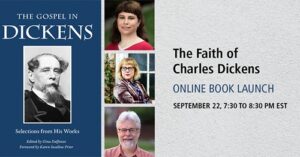
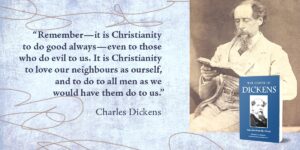
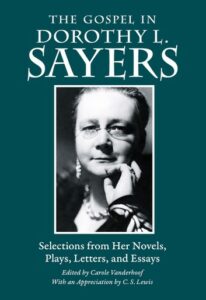
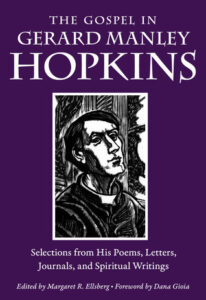
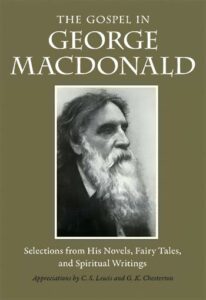
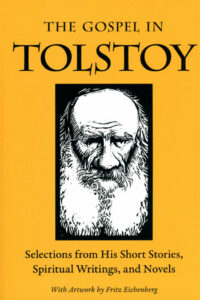
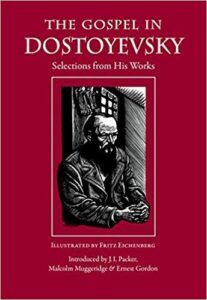

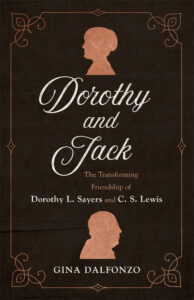 Her very recent Dorothy and Jack: The Transforming Friendship of Dorothy L. Sayers and C. S. Lewis is also published by Baker ($16.99.)
Her very recent Dorothy and Jack: The Transforming Friendship of Dorothy L. Sayers and C. S. Lewis is also published by Baker ($16.99.)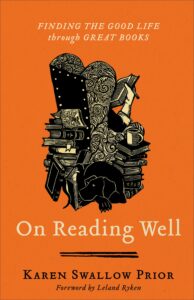 What a great move to have Gina’s book on Dickens carry an astute foreword by Dr. Karen Swallow Prior. Prior is Research Professor of English and Christianity and Culture at Southeastern Baptist Theological Seminary. We stock all three of her books, including the memoir Booked: Literature in the Soul of Me (T.S. Poetry Press), Fierce Convictions: The Extraordinary Life of Hannah More — Poet, Reformed, Abolitionist (Thomas Nelson) and the exceptionally relevant On Reading Well: Finding the Good Life through Great Books (Brazos Press.) We appreciate one she co-edited, as well (with Josh Chatraw) called Cultural Engagement: A Crash Course in Contemporary Issues
What a great move to have Gina’s book on Dickens carry an astute foreword by Dr. Karen Swallow Prior. Prior is Research Professor of English and Christianity and Culture at Southeastern Baptist Theological Seminary. We stock all three of her books, including the memoir Booked: Literature in the Soul of Me (T.S. Poetry Press), Fierce Convictions: The Extraordinary Life of Hannah More — Poet, Reformed, Abolitionist (Thomas Nelson) and the exceptionally relevant On Reading Well: Finding the Good Life through Great Books (Brazos Press.) We appreciate one she co-edited, as well (with Josh Chatraw) called Cultural Engagement: A Crash Course in Contemporary Issues

 Here are two shots of Beth and me in book-themed masks specially made and sent to us by good out-of-state Hearts & Minds customers. Nice huh? Thanks, friends.
Here are two shots of Beth and me in book-themed masks specially made and sent to us by good out-of-state Hearts & Minds customers. Nice huh? Thanks, friends. area, serving you al fresco. We can set up a card table and bring out all kinds of things you may want to consider.
area, serving you al fresco. We can set up a card table and bring out all kinds of things you may want to consider.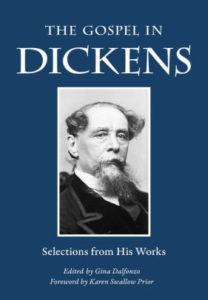 The Gospel in Dickens: Selections from His Works edited by Gina Dalfonzo (Plough Publishing) $18.00 OUR SALE PRICE = $14.40
The Gospel in Dickens: Selections from His Works edited by Gina Dalfonzo (Plough Publishing) $18.00 OUR SALE PRICE = $14.40 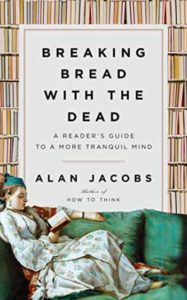 Breaking Bread with the Dead: A Reader’s Guide to a More Tranquil Mind Alan Jacobs (Penguin Press) $25.00 OUR SALE PRICE = $20.00
Breaking Bread with the Dead: A Reader’s Guide to a More Tranquil Mind Alan Jacobs (Penguin Press) $25.00 OUR SALE PRICE = $20.00 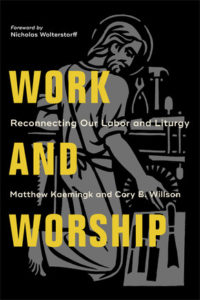 Work and Worship: Reconnecting Our Labor and Liturgy Matthew Kaemingk & Cory B. Wilson (Baker Academic) $29.99 OUR SALE PRICE = $23.99
Work and Worship: Reconnecting Our Labor and Liturgy Matthew Kaemingk & Cory B. Wilson (Baker Academic) $29.99 OUR SALE PRICE = $23.99 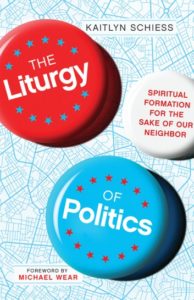 The Liturgy of Politics: Spiritual Formation for the Sake of Our Neighbor Kaitlyn Schiess (IVP) $17.00 OUR SALE PRICE = $13.60
The Liturgy of Politics: Spiritual Formation for the Sake of Our Neighbor Kaitlyn Schiess (IVP) $17.00 OUR SALE PRICE = $13.60 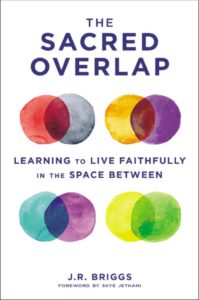 The Sacred Overlap: Learning to Live Faithfully in the Space Between J.R. Briggs (Zondervan) $19.99 OUR SALE PRICE = $15.99
The Sacred Overlap: Learning to Live Faithfully in the Space Between J.R. Briggs (Zondervan) $19.99 OUR SALE PRICE = $15.99 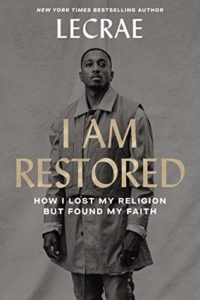 I Am Restored: How I Lost My Religion but Found My Faith
I Am Restored: How I Lost My Religion but Found My Faith 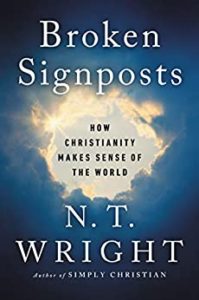 Broken Signposts: How Christianity Makes Sense of the World N.T. Wright (HarperOne) $27.99 OUR SALE PRICE $23.39
Broken Signposts: How Christianity Makes Sense of the World N.T. Wright (HarperOne) $27.99 OUR SALE PRICE $23.39 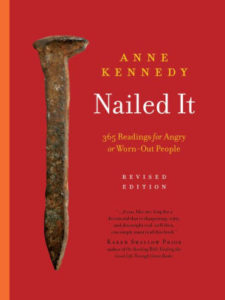 Nailed It: 365 Readings for Angry or Worn-Out People (Revised and Expanded) Anne Kennedy (Square Halo Books) $27.99 OUR SALE PRICE = $22.39
Nailed It: 365 Readings for Angry or Worn-Out People (Revised and Expanded) Anne Kennedy (Square Halo Books) $27.99 OUR SALE PRICE = $22.39 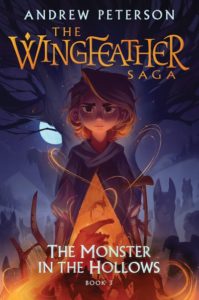

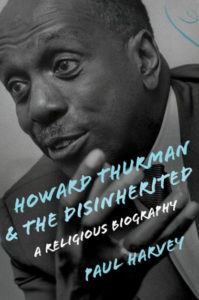 Howard Thurman and the Disinherited: A Religious Biography
Howard Thurman and the Disinherited: A Religious Biography 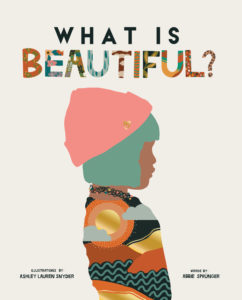 What Is Beautiful? written by Abbie Smith Sprunger, illustrated by Ashley Lauren Snyder (Parent Cue /reThink) $24.99 | OUR SALE PRICE = $19.99
What Is Beautiful? written by Abbie Smith Sprunger, illustrated by Ashley Lauren Snyder (Parent Cue /reThink) $24.99 | OUR SALE PRICE = $19.99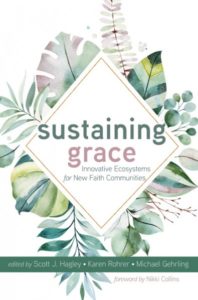 Sustaining Grace: Innovative Ecosystems for New Faith Communities edited by Scott U. Hagley, Karen Rohrer, and Michael Gehrling (Wipf & Stock) $21.00 | OUR SALE PRICE = $16.80
Sustaining Grace: Innovative Ecosystems for New Faith Communities edited by Scott U. Hagley, Karen Rohrer, and Michael Gehrling (Wipf & Stock) $21.00 | OUR SALE PRICE = $16.80 A Sort of Homecoming: Essays Honoring the Academic and Community Work of Brian Walsh
A Sort of Homecoming: Essays Honoring the Academic and Community Work of Brian Walsh 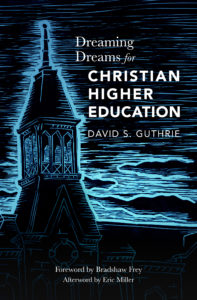 Dreaming Dreams for Christian Higher Education David S. Guthrie (Falls City Press) $18.99 | OUR SALE PRICE = $15.19
Dreaming Dreams for Christian Higher Education David S. Guthrie (Falls City Press) $18.99 | OUR SALE PRICE = $15.19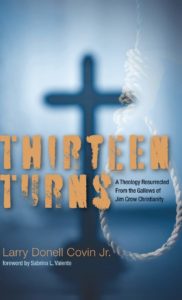 Thirteen Turns: A Theology Resurrected From the Gallows of Jim Crow Christianity Rev. Dr. Larry Donell Covin, Jr with a foreword by Sabrina L. Valente (Wipf & Stock) $19.00 | OUR SALE PRICE = $15.20
Thirteen Turns: A Theology Resurrected From the Gallows of Jim Crow Christianity Rev. Dr. Larry Donell Covin, Jr with a foreword by Sabrina L. Valente (Wipf & Stock) $19.00 | OUR SALE PRICE = $15.20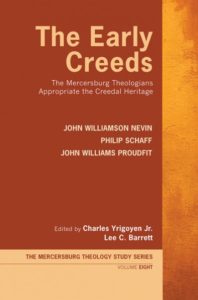 The Early Creeds: The Mercersburg Theologians Appropriate the Creedal Heritage edited by Charles Yrigoyen & Lee C. Barrett (WIpf & Stock) $28.00 | OUR SALE PRICE = $22.40
The Early Creeds: The Mercersburg Theologians Appropriate the Creedal Heritage edited by Charles Yrigoyen & Lee C. Barrett (WIpf & Stock) $28.00 | OUR SALE PRICE = $22.40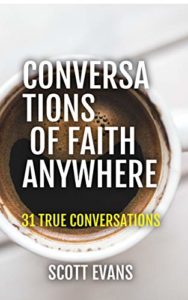 Conversations of Faith Anywhere: 31 Sure Conversations Scott Evans (Scott Evans) $10.99 | OUR SALE PRICE = $8.79
Conversations of Faith Anywhere: 31 Sure Conversations Scott Evans (Scott Evans) $10.99 | OUR SALE PRICE = $8.79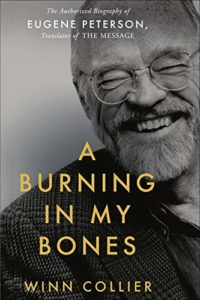 A Burning in My Bones: The Authorized Biography of Eugene Peterson Winn Collier (Waterbrook) $28.00 | OUR SALE PRICE = $22.40
A Burning in My Bones: The Authorized Biography of Eugene Peterson Winn Collier (Waterbrook) $28.00 | OUR SALE PRICE = $22.40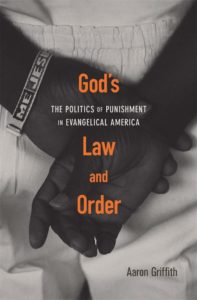 God’s Law and Order: The Politics of Punishment in Evangelical America Aaron Griffith (Harvard University Press) $35.00 | OUR SALE PRICE = $28.00
God’s Law and Order: The Politics of Punishment in Evangelical America Aaron Griffith (Harvard University Press) $35.00 | OUR SALE PRICE = $28.00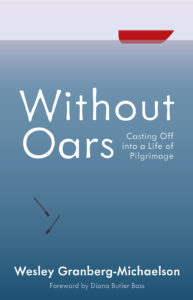 Without Oars: Casting Off Into a Life of Pilgrimage Wesley Granberg-Michaelson (Broadleaf Books) $16.99 | OUR SALE PRICE = $13.59
Without Oars: Casting Off Into a Life of Pilgrimage Wesley Granberg-Michaelson (Broadleaf Books) $16.99 | OUR SALE PRICE = $13.59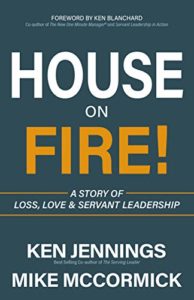 House on Fire! A Story of Loss, Love & Servant Leadership Ken Jennings & Mike McCormick (Morgan James) $14.99 | OUR SALE PRICE = $11.99
House on Fire! A Story of Loss, Love & Servant Leadership Ken Jennings & Mike McCormick (Morgan James) $14.99 | OUR SALE PRICE = $11.99 The Spiritual Danger of Donald Trump: 30 Evangelical Christians on Justice, Truth, Moral Integrity edited by Ronald J. Sider (Cascade) $25.00 | OUR SALE PRICE = $20.00
The Spiritual Danger of Donald Trump: 30 Evangelical Christians on Justice, Truth, Moral Integrity edited by Ronald J. Sider (Cascade) $25.00 | OUR SALE PRICE = $20.00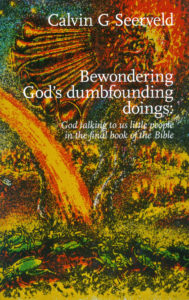
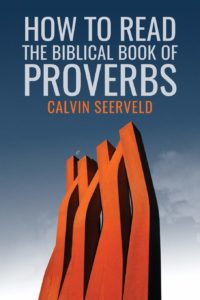
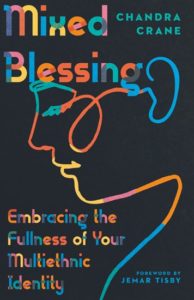 Mixed Blessing: Embracing the Fullness of Your Multiethnic Identity
Mixed Blessing: Embracing the Fullness of Your Multiethnic Identity The Way Up Is Down: Becoming Yourself by Forgetting Yourself Marlena Graves (IVP) $22.00 | OUR SALE PRICE = $17.60
The Way Up Is Down: Becoming Yourself by Forgetting Yourself Marlena Graves (IVP) $22.00 | OUR SALE PRICE = $17.60  must increase, I must decrease.” Marlena is chatty and conversational, moving adeptly from citing Russian Orthodox monks to telling common place stories about her own daily life as she seeks authentic and life-giving wholeness by trusting God. She brings in dramatic stories of folks she has encountered although the most powerful ones are mundane, almost — telling about a special needs fellowship in her church, for instance. The stories bring home in a disarming way some heavy truths about transformation, what it means to live into the sacred heart of Jesus, to be (as one chapter puts it) “cradled in the heart of God.”
must increase, I must decrease.” Marlena is chatty and conversational, moving adeptly from citing Russian Orthodox monks to telling common place stories about her own daily life as she seeks authentic and life-giving wholeness by trusting God. She brings in dramatic stories of folks she has encountered although the most powerful ones are mundane, almost — telling about a special needs fellowship in her church, for instance. The stories bring home in a disarming way some heavy truths about transformation, what it means to live into the sacred heart of Jesus, to be (as one chapter puts it) “cradled in the heart of God.” Compassion (&) Conviction: The AND Campaign’s Guide to Faithful Civic Engagement Justin Giboney, Michael Wear & Chris Butler (IVP) $22.00 | OUR SALE PRICE = $17.60
Compassion (&) Conviction: The AND Campaign’s Guide to Faithful Civic Engagement Justin Giboney, Michael Wear & Chris Butler (IVP) $22.00 | OUR SALE PRICE = $17.60 



 Interpreting Scripture: Essays on the Bible and Hermeneutics N.T. Wright (Zondervan Academics) $52.99 | OUR SALE PRICE = $42.39
Interpreting Scripture: Essays on the Bible and Hermeneutics N.T. Wright (Zondervan Academics) $52.99 | OUR SALE PRICE = $42.39  Interpreting Jesus: Essays on the Gospels N.T. Wright (Zondervan Academics) $52.99 | OUR SALE PRICE = $42.39
Interpreting Jesus: Essays on the Gospels N.T. Wright (Zondervan Academics) $52.99 | OUR SALE PRICE = $42.39  Interpreting Paul: Essays on the Apostle and His Letters N.T. Wright (Zondervan Academics) $44.99 | OUR SALE PRICE = $35.99
Interpreting Paul: Essays on the Apostle and His Letters N.T. Wright (Zondervan Academics) $44.99 | OUR SALE PRICE = $35.99 
 Beautiful Resistance: The Joy of Conviction in a Culture of Compromise Jon Tyson (Waterbrook) $17.00 | OUR SALE PRICE = $13.60
Beautiful Resistance: The Joy of Conviction in a Culture of Compromise Jon Tyson (Waterbrook) $17.00 | OUR SALE PRICE = $13.60  Thank you to Jon Tyson for his honest concern about how we may have “fit in” to the cool culture a bit too much and may have absorbed some of the worst values that are not consistent with Jesus’s own upside down kingdom. It is rare and good to see lively, Chirst-loving piety and such thoughtful social ethics portrayed in such accesible, chatty conversational prose. This is a great book to share with folks who want to be challenged to a deeper more subversive sort of faith. Get a group together and pre-order a bunch right away. There’s a big study guide in the back making it ideal for conversations, small groups, and (yes) Zoom conversations.
Thank you to Jon Tyson for his honest concern about how we may have “fit in” to the cool culture a bit too much and may have absorbed some of the worst values that are not consistent with Jesus’s own upside down kingdom. It is rare and good to see lively, Chirst-loving piety and such thoughtful social ethics portrayed in such accesible, chatty conversational prose. This is a great book to share with folks who want to be challenged to a deeper more subversive sort of faith. Get a group together and pre-order a bunch right away. There’s a big study guide in the back making it ideal for conversations, small groups, and (yes) Zoom conversations. The Grown Woman’s Guide to Online Dating: Lessons Learned While Swiping Right, Snapping Selfies, and Analyzing Emojis Margot Starbuck (Thomas Nelson) $18.99 | OUR SALE PRICE = $15.19
The Grown Woman’s Guide to Online Dating: Lessons Learned While Swiping Right, Snapping Selfies, and Analyzing Emojis Margot Starbuck (Thomas Nelson) $18.99 | OUR SALE PRICE = $15.19  Ms Starbuck has helped numerous authors find their voices and does writing workshops and consulting an co-writing that is very widely esteemed. Few people are so deliriously fun, so earnestly faithful and hopeful about serving others and social change. Like I said Beth and I love her and her work. We recommend reading any of her fabulously interesting, energetically written works.
Ms Starbuck has helped numerous authors find their voices and does writing workshops and consulting an co-writing that is very widely esteemed. Few people are so deliriously fun, so earnestly faithful and hopeful about serving others and social change. Like I said Beth and I love her and her work. We recommend reading any of her fabulously interesting, energetically written works.
 Dorothy and Jack: The Transforming Friendship of Dorothy L. Sayers and C. S. Lewis Gina Dalfonzo (Baker) $16.99 | OUR SALE PRICE = $13.59
Dorothy and Jack: The Transforming Friendship of Dorothy L. Sayers and C. S. Lewis Gina Dalfonzo (Baker) $16.99 | OUR SALE PRICE = $13.59  in thought, colleagues in writing, and good friends. Gina Dalfonzo is a great writer to explore this topic — she’s quite the literary student and has a book coming out soon which collates some of the deeply spiritual themes in Charles Dickens that will be in the Plough Press series The Gospel in… called The Gospel in Dickens: Selections from His Works. It will be published by Plough Press in September ($18.00) and carries a foreword by Karen Swallow Prior. We carry this whole great line of books, by the way.
in thought, colleagues in writing, and good friends. Gina Dalfonzo is a great writer to explore this topic — she’s quite the literary student and has a book coming out soon which collates some of the deeply spiritual themes in Charles Dickens that will be in the Plough Press series The Gospel in… called The Gospel in Dickens: Selections from His Works. It will be published by Plough Press in September ($18.00) and carries a foreword by Karen Swallow Prior. We carry this whole great line of books, by the way. Vesper Flights Helen MacDonald (Grove Press) $27.00 | OUR SALE PRICE = $21.60
Vesper Flights Helen MacDonald (Grove Press) $27.00 | OUR SALE PRICE = $21.60  bestselling H is for Hawk was exceptionally well reviewed and beloved from when it first came out in London I think is 2014. Among other accolades it was awarded the Samuel Johnson Prize for nonfiction, and was beloved as a lovely birding book even for those that don’t usually read about bird-watching. The author, you see, was coping with grieve and took up the life-log dream of becoming a falconer. It was a nearly transcendent story of her relationship with this wildest of birds (a goshawk.) It was called “breathtaking” and “beautiful” and “astonishing” and “indelible.” What a memorable story, what a writer she is. It was often said that after reading H is for Hawk “you’ll never think see a bird overhead the same way again.” Or, think of the pain and beauty of being alive the same way.
bestselling H is for Hawk was exceptionally well reviewed and beloved from when it first came out in London I think is 2014. Among other accolades it was awarded the Samuel Johnson Prize for nonfiction, and was beloved as a lovely birding book even for those that don’t usually read about bird-watching. The author, you see, was coping with grieve and took up the life-log dream of becoming a falconer. It was a nearly transcendent story of her relationship with this wildest of birds (a goshawk.) It was called “breathtaking” and “beautiful” and “astonishing” and “indelible.” What a memorable story, what a writer she is. It was often said that after reading H is for Hawk “you’ll never think see a bird overhead the same way again.” Or, think of the pain and beauty of being alive the same way. Becoming Brave: Finding the Courage to Pursue Racial Justice Now
Becoming Brave: Finding the Courage to Pursue Racial Justice Now  Allow me to share what other esteemed and discerning folks say about Brenda Salter McNeil, her work and witness, and, particularly, this soon to be released very important new work. Reading these descriptions will help you determine if you should pre-order this now; I think it is obvious that you should.
Allow me to share what other esteemed and discerning folks say about Brenda Salter McNeil, her work and witness, and, particularly, this soon to be released very important new work. Reading these descriptions will help you determine if you should pre-order this now; I think it is obvious that you should. The Dust of Death: The Sixties Counterculture and How It Changed America Forever (IVP Signature Collection) Os Guinness (IVP) $24.00 | OUR SALE PRICE = $19.20
The Dust of Death: The Sixties Counterculture and How It Changed America Forever (IVP Signature Collection) Os Guinness (IVP) $24.00 | OUR SALE PRICE = $19.20  And so, the Dust of Death uses brilliant analysis and wonderful prose to explore the strengths and weaknesses of the culture and the counterculture. Guinness visited the US (from England) in 1968 and some of his experiences and many, many conversations make their way into this major book. It seemed at the time to be offering a very profound critique of the right and the left, and a serious hope which Guinness nicely and somewhat evocatively called “a third way.” I had never seen anything like it.
And so, the Dust of Death uses brilliant analysis and wonderful prose to explore the strengths and weaknesses of the culture and the counterculture. Guinness visited the US (from England) in 1968 and some of his experiences and many, many conversations make their way into this major book. It seemed at the time to be offering a very profound critique of the right and the left, and a serious hope which Guinness nicely and somewhat evocatively called “a third way.” I had never seen anything like it. This whole series is to be commended and we are glad for some older books from decades ago re-appearing with new covers and some new introductions explaining why they are still so relevant. Among them all, I think The Dust of Death:
This whole series is to be commended and we are glad for some older books from decades ago re-appearing with new covers and some new introductions explaining why they are still so relevant. Among them all, I think The Dust of Death: Who Will Be a Witness? Igniting Activism for God’s Justice, Love, and Deliverance Drew G.I. Hart (Herald Press) $18.99 | OUR SALE PRICE = $15.19
Who Will Be a Witness? Igniting Activism for God’s Justice, Love, and Deliverance Drew G.I. Hart (Herald Press) $18.99 | OUR SALE PRICE = $15.19  Which is why we’d are very eager to encourage you to pre-order this riveting, blistering, vitally urgent new book. Who Will Be a Witness? is, I am sure, one of the books that will be used to encourage those wanting to move beyond sadness about racial injustice to bold action and faithful public reform. Hart has evolved as an ecumenical public theologian and here interacts with a variety of voices from the breadth of church history — the early church fathers, Augustine, the Anabaptists, American black heroes (Ida B. Wells, Howard Thurman, the radical King, Vincent Harding), various liberation theologians, and vital contemporary thinkers from Chad Meyers to N.T. Wright to Alan Kreider. It is a mature study, indeed, but with the feel of a manifesto.
Which is why we’d are very eager to encourage you to pre-order this riveting, blistering, vitally urgent new book. Who Will Be a Witness? is, I am sure, one of the books that will be used to encourage those wanting to move beyond sadness about racial injustice to bold action and faithful public reform. Hart has evolved as an ecumenical public theologian and here interacts with a variety of voices from the breadth of church history — the early church fathers, Augustine, the Anabaptists, American black heroes (Ida B. Wells, Howard Thurman, the radical King, Vincent Harding), various liberation theologians, and vital contemporary thinkers from Chad Meyers to N.T. Wright to Alan Kreider. It is a mature study, indeed, but with the feel of a manifesto. Reading While Black: African American Biblical Interpretation as an Exercise in Hope Esau McCaulley (IVP Academic) $20.00 | OUR SALE PRICE = $16.00
Reading While Black: African American Biblical Interpretation as an Exercise in Hope Esau McCaulley (IVP Academic) $20.00 | OUR SALE PRICE = $16.00  Christian faith in the struggle for justice, New Testament scholar McCaulley argues that reading Scripture from the perspective of Black church tradition is invaluable for connecting with a rich faith history and addressing the urgent issues of our times. He advocates for a model of interpretation that involves an ongoing conversation between the collective Black experience and the Bible, in which the particular questions coming out of Black communities are given pride of place and the Bible is given space to respond by affirming, challenging, and, at times, reshaping Black concerns. McCaulley demonstrates this model with studies on how Scripture speaks to topics often overlooked by white interpreters, such as ethnicity, political protest, policing, and slavery. Ultimately McCaulley calls the church to a dynamic theological engagement with Scripture, in which Christians of diverse backgrounds dialogue with their own social location as well as the cultures of others. Reading While Black moves the conversation forward.
Christian faith in the struggle for justice, New Testament scholar McCaulley argues that reading Scripture from the perspective of Black church tradition is invaluable for connecting with a rich faith history and addressing the urgent issues of our times. He advocates for a model of interpretation that involves an ongoing conversation between the collective Black experience and the Bible, in which the particular questions coming out of Black communities are given pride of place and the Bible is given space to respond by affirming, challenging, and, at times, reshaping Black concerns. McCaulley demonstrates this model with studies on how Scripture speaks to topics often overlooked by white interpreters, such as ethnicity, political protest, policing, and slavery. Ultimately McCaulley calls the church to a dynamic theological engagement with Scripture, in which Christians of diverse backgrounds dialogue with their own social location as well as the cultures of others. Reading While Black moves the conversation forward. A Year of Playing Catch: What a Simple Daily Experiment Taught Me about Life Ethan D. Bryan (Zondervan) $18.99 | OUR SALE PRICE = $15.19
A Year of Playing Catch: What a Simple Daily Experiment Taught Me about Life Ethan D. Bryan (Zondervan) $18.99 | OUR SALE PRICE = $15.19  Let me get this out of the way: Ethan has been a good friend of our store and I’ve reviewed his other sports-related books (he’s a Royals fan, did I mention?) and book about him and his dad, a book about music, a wonderful little kid’s book, and his splendid back-to-high-school novel Dreamfield. He did a book about playing catch to raise awareness about human trafficking and
Let me get this out of the way: Ethan has been a good friend of our store and I’ve reviewed his other sports-related books (he’s a Royals fan, did I mention?) and book about him and his dad, a book about music, a wonderful little kid’s book, and his splendid back-to-high-school novel Dreamfield. He did a book about playing catch to raise awareness about human trafficking and  set captives free cleverly called Catch and Release. I’m mentioned in at least one of them, and I’m grateful. But, look: my reputation as bookseller and reviewer won’t last if I rave about books just because friends wrote them or because I happen to like the character and lifestyle of the author. Lots of great people do bad books and (also true) bad people do some great books.
set captives free cleverly called Catch and Release. I’m mentioned in at least one of them, and I’m grateful. But, look: my reputation as bookseller and reviewer won’t last if I rave about books just because friends wrote them or because I happen to like the character and lifestyle of the author. Lots of great people do bad books and (also true) bad people do some great books.
 Marriage in the Middle: Embracing Midlife Surprises, Challenges, and Joys Dorothy Littell Greco (IVP) $16.00 | OUR SALE PRICE = $12.80
Marriage in the Middle: Embracing Midlife Surprises, Challenges, and Joys Dorothy Littell Greco (IVP) $16.00 | OUR SALE PRICE = $12.80  Beautiful: Lifelong Love, Joy, and Intimacy Start with You (David C. Cook; $16.99) and we liked it just because of how nicely it was written with this theme of beauty and goodness, and how it avoided many of the cliches and downright offensive stuff found in many Christian marriage books. I trust her voice, her theology, her wisdom, and her cultural concerns — speaking out for the dignity of women, the rights of immigrants, the worth of the poor — so her earlier Making Marriage Beautiful or the forthcoming Marriage in the Middle are great and reliable gifts. Frankly, most of the best marriage books are written by men, so it is good to have couples read a thoughtful and writerly woman for a change. She is an author whose name you should know.
Beautiful: Lifelong Love, Joy, and Intimacy Start with You (David C. Cook; $16.99) and we liked it just because of how nicely it was written with this theme of beauty and goodness, and how it avoided many of the cliches and downright offensive stuff found in many Christian marriage books. I trust her voice, her theology, her wisdom, and her cultural concerns — speaking out for the dignity of women, the rights of immigrants, the worth of the poor — so her earlier Making Marriage Beautiful or the forthcoming Marriage in the Middle are great and reliable gifts. Frankly, most of the best marriage books are written by men, so it is good to have couples read a thoughtful and writerly woman for a change. She is an author whose name you should know.
 The Colors of Culture: The Beauty of Diverse Friendships Melindajoy Mingo (IVP) $14.00 | OUR SALE PRICE = $11.20
The Colors of Culture: The Beauty of Diverse Friendships Melindajoy Mingo (IVP) $14.00 | OUR SALE PRICE = $11.20  MelindaJoy Mingo is an ordained minister, professor, cultural capacity expert, and entrepreneur based in Colorado Springs. She is the founder of Je-Nai International Ministry and Significant Life Change, Inc., and has developed multicultural initiatives both at home and abroad. She holds a PhD in global leadership and an honorary doctorate in urban transformative leadership and has been widely recognized for her teaching and training in cross-cultural competency.
MelindaJoy Mingo is an ordained minister, professor, cultural capacity expert, and entrepreneur based in Colorado Springs. She is the founder of Je-Nai International Ministry and Significant Life Change, Inc., and has developed multicultural initiatives both at home and abroad. She holds a PhD in global leadership and an honorary doctorate in urban transformative leadership and has been widely recognized for her teaching and training in cross-cultural competency. Everything Is Spiritual: Who We Are and What We’re Doing Here Rob Bell (St. Martin’s Press) $27.99 | OUR SALE PRICE = $21.60
Everything Is Spiritual: Who We Are and What We’re Doing Here Rob Bell (St. Martin’s Press) $27.99 | OUR SALE PRICE = $21.60 
 Bavinck: A Critical Biography James Eglinton (Baker Academic) $44.99 | OUR SALE PRICE = $35.99
Bavinck: A Critical Biography James Eglinton (Baker Academic) $44.99 | OUR SALE PRICE = $35.99 
 Jack: A Novel Marilynne Robinson (Farrar, Straus and Giroux) $27.00 | OUR SALE PRICE = $21.60
Jack: A Novel Marilynne Robinson (Farrar, Straus and Giroux) $27.00 | OUR SALE PRICE = $21.60 

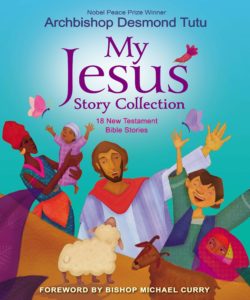 My Jesus Story Collection: 18 New Testament Bible Stories Archbishop Desmond Tutu (Zonderkidz) $17.99 OUR SALE PRICE = $14.39 This is a new edition of selected stories from the delightful Nobel Prize Winner’s bigger Children of God Storybook Bible. This one just includes stories from the life of Jesus, with the last few being on His death and resurrection. It is a standard size of a children’s upright picture book, a tad larger than 9 x 11 inches, and has about 40 full-color pages. As with the bigger Bible storybook from which these are drawn, every episode is done in a different art style, featuring artists from around the globe. What a brilliant idea this is. This is just wonderful. It includes a new foreword by the royal wedding preacher, Bishop Michael Curry. Very nicely done. Ages maybe 3 – 10, maybe.
My Jesus Story Collection: 18 New Testament Bible Stories Archbishop Desmond Tutu (Zonderkidz) $17.99 OUR SALE PRICE = $14.39 This is a new edition of selected stories from the delightful Nobel Prize Winner’s bigger Children of God Storybook Bible. This one just includes stories from the life of Jesus, with the last few being on His death and resurrection. It is a standard size of a children’s upright picture book, a tad larger than 9 x 11 inches, and has about 40 full-color pages. As with the bigger Bible storybook from which these are drawn, every episode is done in a different art style, featuring artists from around the globe. What a brilliant idea this is. This is just wonderful. It includes a new foreword by the royal wedding preacher, Bishop Michael Curry. Very nicely done. Ages maybe 3 – 10, maybe.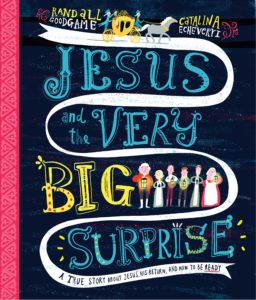 Jesus and the Very Big Surprise: A True Story About Jesus, His Return, and How to Be Ready Randall Goodgame, illustrated by Catalina Echeveryi (The Good Book Company) $14.99 OUR SALE PRICE = $11.99 This is the latest in the brilliant gospel-centered “Tales That Tell the Truth” series. (We stock them all, by the way, including the directly seasonal The Garden, the Curtain and the Cross: The True Story of Why Jesus Died and Rose Again which we featured last year.) This new one is, of course, playful and artful and a bit funny and so clever as it recounts Jesus’ own parable about a Master who comes back to — surprise — serve his waiting servants. The story starts telling about the birth and life of Jesus and then does the “story within a story” thing of Jesus telling the parable (in Luke 12.) What a message of waiting well, and what a surprise that the Master clothes his own servants! Who would do that?, the book asks. Jesus, that’s who! And it picks up again telling the story of Maundy Thursday, Jesus washing the feet of his friends, even dying for them. Yes, there is this promise of his return and we are called to wait for that great restoring coming. This author (who is author a song-writer, by the way) is an obviously insightful Bible teacher and a gifted storyteller. As always, Echeveryi’s art is whimsical without being silly. Like the other books in this series, the authors and artist are adept at what grown-ups call “Biblical theology”, which is to say the narrative context of the story drives us to theological insights about the unfolding drama of God’s redemption of the world in the person and work of Christ, the true Servant King. It’s very well done. It’s about 8 x 10, hardback, ages 4 – 8, I’d say. Love it.
Jesus and the Very Big Surprise: A True Story About Jesus, His Return, and How to Be Ready Randall Goodgame, illustrated by Catalina Echeveryi (The Good Book Company) $14.99 OUR SALE PRICE = $11.99 This is the latest in the brilliant gospel-centered “Tales That Tell the Truth” series. (We stock them all, by the way, including the directly seasonal The Garden, the Curtain and the Cross: The True Story of Why Jesus Died and Rose Again which we featured last year.) This new one is, of course, playful and artful and a bit funny and so clever as it recounts Jesus’ own parable about a Master who comes back to — surprise — serve his waiting servants. The story starts telling about the birth and life of Jesus and then does the “story within a story” thing of Jesus telling the parable (in Luke 12.) What a message of waiting well, and what a surprise that the Master clothes his own servants! Who would do that?, the book asks. Jesus, that’s who! And it picks up again telling the story of Maundy Thursday, Jesus washing the feet of his friends, even dying for them. Yes, there is this promise of his return and we are called to wait for that great restoring coming. This author (who is author a song-writer, by the way) is an obviously insightful Bible teacher and a gifted storyteller. As always, Echeveryi’s art is whimsical without being silly. Like the other books in this series, the authors and artist are adept at what grown-ups call “Biblical theology”, which is to say the narrative context of the story drives us to theological insights about the unfolding drama of God’s redemption of the world in the person and work of Christ, the true Servant King. It’s very well done. It’s about 8 x 10, hardback, ages 4 – 8, I’d say. Love it.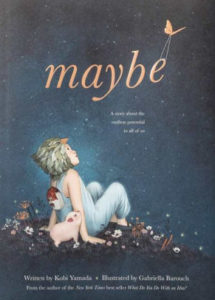 Maybe Kobi Yamada, illustrated by Gabriella Barouch (Compendium) $17.95 OUR SALE PRICE = $14.36 Although not Biblically oriented, this is a lush and lovely book that is evocative and inspiring. It is beautifully illustrated, with much spare space on the heavy-stock pages, and wonderfully drawn, full color and sometimes rich, incredibly lush pictures. It says on the front that it is “a story about the endless potential in all of us.” This is the author of the best-selling What Do You Do With an Idea and the companions, What Do You Do With a Problem and What Do You Do With a Chance. Optimistic to the point of being magical, I’m sure many will adore this moving book and it might lead them to visionary conversations with their young children. It’s a bit larger than 9 x 11 and truly lovely. The publisher says ages 4 to 8 but the sheer beauty of it makes it appealing to some older kids, too.
Maybe Kobi Yamada, illustrated by Gabriella Barouch (Compendium) $17.95 OUR SALE PRICE = $14.36 Although not Biblically oriented, this is a lush and lovely book that is evocative and inspiring. It is beautifully illustrated, with much spare space on the heavy-stock pages, and wonderfully drawn, full color and sometimes rich, incredibly lush pictures. It says on the front that it is “a story about the endless potential in all of us.” This is the author of the best-selling What Do You Do With an Idea and the companions, What Do You Do With a Problem and What Do You Do With a Chance. Optimistic to the point of being magical, I’m sure many will adore this moving book and it might lead them to visionary conversations with their young children. It’s a bit larger than 9 x 11 and truly lovely. The publisher says ages 4 to 8 but the sheer beauty of it makes it appealing to some older kids, too.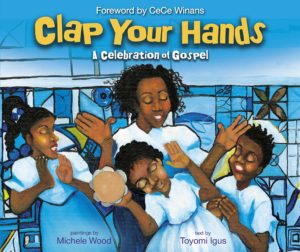 Clap Your Hands: A Celebration of Gospel Toyomi Igus, illustrated by Michele Wood (Zonderkiz) $16.99 OUR SALE PRICE = $13.59 We had this right on our counter during Black History Month and then in March because I just loved showing it off. It is a sequel to the colorful and award winning I See the Rhythm, which we adored, although this one, I think, is even better. If that one beautifully taught and showed the past history of gospel music this carries the story to today, with pages on Motown and funk and “holy hip hop.” Like many good non-fiction children’s books these days there is tons of information cleverly packed into these delightful pages. There are Christian symbols in the artwork (Michele Wood is a spectacular contemporary artist, by the way, with picture that are vivid and even evoke stained glass at times, sanctifying what some might call the mundane.) There is a timeline running along the bottom of the pages. There is a good foreword by CeCe Winans and a great Discography in the back, naming the songs that are cited or alluded to, from Ring Shout and field chants to the Fisk Jubilee Singers to Tommy Dorsey to Mahalia up to Sister Rosetta Tharp and Sam Cooke. There are contemporary gospel singers such as Yolanda Adams and Donnie McClurkin up to Kirk Franklin, Cross Movement and Lecrae. And that is only some of the artist in these fun pages. What book has the Soweto Gospel Choir, The Five Blind Boys of Alabama, Andre Crouch, and Chance the Rapper? Yes, I said Chance the Rapper.
Clap Your Hands: A Celebration of Gospel Toyomi Igus, illustrated by Michele Wood (Zonderkiz) $16.99 OUR SALE PRICE = $13.59 We had this right on our counter during Black History Month and then in March because I just loved showing it off. It is a sequel to the colorful and award winning I See the Rhythm, which we adored, although this one, I think, is even better. If that one beautifully taught and showed the past history of gospel music this carries the story to today, with pages on Motown and funk and “holy hip hop.” Like many good non-fiction children’s books these days there is tons of information cleverly packed into these delightful pages. There are Christian symbols in the artwork (Michele Wood is a spectacular contemporary artist, by the way, with picture that are vivid and even evoke stained glass at times, sanctifying what some might call the mundane.) There is a timeline running along the bottom of the pages. There is a good foreword by CeCe Winans and a great Discography in the back, naming the songs that are cited or alluded to, from Ring Shout and field chants to the Fisk Jubilee Singers to Tommy Dorsey to Mahalia up to Sister Rosetta Tharp and Sam Cooke. There are contemporary gospel singers such as Yolanda Adams and Donnie McClurkin up to Kirk Franklin, Cross Movement and Lecrae. And that is only some of the artist in these fun pages. What book has the Soweto Gospel Choir, The Five Blind Boys of Alabama, Andre Crouch, and Chance the Rapper? Yes, I said Chance the Rapper.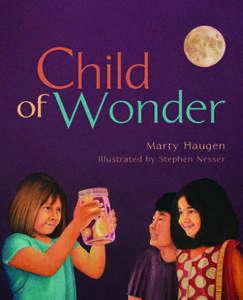 Child of Wonder Marty Haugen, illustrated by Stephen Nesser (GIA Publications) $16.95 OUR SALE PRICE = $13.56 I have mentioned this before, so allow us to give another tip of the hat to this gloriously attractive, warm, evocative book of wonder. Marty Haugen is an old folksinger who was one of the pioneers of early contemporary liturgical songs (maybe known by those who remember the St. Louis Jesuits, David Haas, or the Monks of Weston Priory or more recently, say, Bryan Sirchio. Marty is a member of the UCC but writes music often for the Lutherans.) This lovely children’s book shows childhood rituals from all over the world so although it was composed for the baptism of his godson, the lyrics “celebrate the sacredness of human life and delight in the lives of children.” It’s tender and touching, beautiful and nicely multicultural. Included in the volume is a free mp3 download of the song itself, although one hardly needs to know the song to appreciate the lyrical cadence of the words of the book and the wonderful pictures. Sweet, ecumenical, lovely.
Child of Wonder Marty Haugen, illustrated by Stephen Nesser (GIA Publications) $16.95 OUR SALE PRICE = $13.56 I have mentioned this before, so allow us to give another tip of the hat to this gloriously attractive, warm, evocative book of wonder. Marty Haugen is an old folksinger who was one of the pioneers of early contemporary liturgical songs (maybe known by those who remember the St. Louis Jesuits, David Haas, or the Monks of Weston Priory or more recently, say, Bryan Sirchio. Marty is a member of the UCC but writes music often for the Lutherans.) This lovely children’s book shows childhood rituals from all over the world so although it was composed for the baptism of his godson, the lyrics “celebrate the sacredness of human life and delight in the lives of children.” It’s tender and touching, beautiful and nicely multicultural. Included in the volume is a free mp3 download of the song itself, although one hardly needs to know the song to appreciate the lyrical cadence of the words of the book and the wonderful pictures. Sweet, ecumenical, lovely.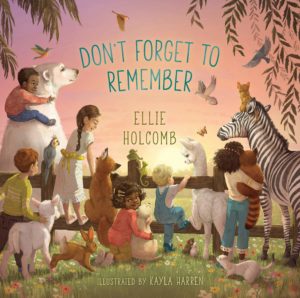 Don’t Forget to Remember Ellie Holcomb, illustrated by Kayla Harren (B+H Kids) $12.99 OUR SALE PRICE = $10.39 We just loved this cool and hip young singer-songwriter’s first book Who Sang the First Song which was colorful and playful and pointing to the goodness of creation in memorable ways. This one has a fantastic cover, with children and animals — who doesn’t love polar bears and zebras? This lyrical tale reminds children — and the parents reading it to them! — that it is hard to remember sometimes; we are prone to forget what is true. And the truest truths are (as the Bible says) are embedded in the creation itself. As the back cover says, “Ellie Holcomb celebrates creation’s reminders of God’s love, which surrounds us from sunrise to sunset, even on our most forgetful days.”
Don’t Forget to Remember Ellie Holcomb, illustrated by Kayla Harren (B+H Kids) $12.99 OUR SALE PRICE = $10.39 We just loved this cool and hip young singer-songwriter’s first book Who Sang the First Song which was colorful and playful and pointing to the goodness of creation in memorable ways. This one has a fantastic cover, with children and animals — who doesn’t love polar bears and zebras? This lyrical tale reminds children — and the parents reading it to them! — that it is hard to remember sometimes; we are prone to forget what is true. And the truest truths are (as the Bible says) are embedded in the creation itself. As the back cover says, “Ellie Holcomb celebrates creation’s reminders of God’s love, which surrounds us from sunrise to sunset, even on our most forgetful days.” The Chickens Build a Wall Jean-Francois Dumont (Eerdmans) $9.99 OUR SALE PRICE = $7.99 Okay, this is to funny to be true, but it is. This was first published in France and as the editors at Eerdmans Books for Young Readers are wont to do, they picked it up and released the edition in English. The story is about a group of chickens who are scared of the outsider (who is hedgehog, by the way) and frantically work to build a wall around their farmyard to keep him out. They think it has worked until they realize he’s been sleeping all winter in the barn and, awakening from hibernation, is now among them, one of their own community, after all. After Donald Trump promised to have Mexico pay for his wall, this book became sort of symbolic of that approach and we sold a bunch in hardback to those wanting to have conversations with kids about who is in and who is out and the role of fear and walls and differences. Now it’s out in paperback, just in time for the next round of wall-building chatter. As in real life, these chicken’s realize that “everything hasn’t gone quite according to plan…” Yep. 8 x 10; paperback; 32 fun-filled, prophetic pages.
The Chickens Build a Wall Jean-Francois Dumont (Eerdmans) $9.99 OUR SALE PRICE = $7.99 Okay, this is to funny to be true, but it is. This was first published in France and as the editors at Eerdmans Books for Young Readers are wont to do, they picked it up and released the edition in English. The story is about a group of chickens who are scared of the outsider (who is hedgehog, by the way) and frantically work to build a wall around their farmyard to keep him out. They think it has worked until they realize he’s been sleeping all winter in the barn and, awakening from hibernation, is now among them, one of their own community, after all. After Donald Trump promised to have Mexico pay for his wall, this book became sort of symbolic of that approach and we sold a bunch in hardback to those wanting to have conversations with kids about who is in and who is out and the role of fear and walls and differences. Now it’s out in paperback, just in time for the next round of wall-building chatter. As in real life, these chicken’s realize that “everything hasn’t gone quite according to plan…” Yep. 8 x 10; paperback; 32 fun-filled, prophetic pages. Never Too Little! and The Best Thing to Do! and The Man Who Would Not Be Quiet! each by Steph Williams (The Good Book Company) $4.99 each OUR SALE PRICE = $3.99 each These three little books (in what the author is calling the “Little Me Big God” series, sold individually) are clever and energetic, each using sparse text and zesty drawings to retell a gospel story. The first is obviously about that time when some boys and girls (“just like you”) came to see Jesus. But someone said “You’re too little. Jesus can’t talk to you.” The book asks on the back cover, “Were they right? No! Discover why Jesus said that you’re never too little to be God’s friend.” The one called The Best Thing to Do is powerful, again, brief and fun, colorful and clever — it is about the Mary & Martha story from Luke 10. The Man Who Would Not Be Quiet! is, as you might guess, the story of Bartimaeus who was born blind. (“Bartimaeus was sad. He could not see. His eyes did not work. But he could hear…”) As it says on the back, “Discover who Bartimaeus heard coming along the road, and how listening to him changed Bartimaeus’s life for ever!”
Never Too Little! and The Best Thing to Do! and The Man Who Would Not Be Quiet! each by Steph Williams (The Good Book Company) $4.99 each OUR SALE PRICE = $3.99 each These three little books (in what the author is calling the “Little Me Big God” series, sold individually) are clever and energetic, each using sparse text and zesty drawings to retell a gospel story. The first is obviously about that time when some boys and girls (“just like you”) came to see Jesus. But someone said “You’re too little. Jesus can’t talk to you.” The book asks on the back cover, “Were they right? No! Discover why Jesus said that you’re never too little to be God’s friend.” The one called The Best Thing to Do is powerful, again, brief and fun, colorful and clever — it is about the Mary & Martha story from Luke 10. The Man Who Would Not Be Quiet! is, as you might guess, the story of Bartimaeus who was born blind. (“Bartimaeus was sad. He could not see. His eyes did not work. But he could hear…”) As it says on the back, “Discover who Bartimaeus heard coming along the road, and how listening to him changed Bartimaeus’s life for ever!”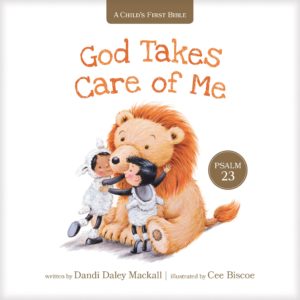 God Takes Care of Me: Psalm 23 Dandi Daley Mackall, illustrated by Cee Biscoe (Tyndale Kids) $7.99 OUR SALE PRICE = $6.39 This is a slightly larger size than a typical little board book, but it is a board book, with thick sturdy pages for very young readres. The artwork is soft and the telling gentle as Dandi Mackall is known for. It is a paraphrase of the 23rd Psalm and might be useful this season as even children know something is scary with this dangerous pandemic. The Psalm is retold in words that rhyme; as the back cover puts it, it is “both playful and tender, showing your child that God is their Good Shepherd who will take care of them wherever they go.” Or, in this case (I say seriously) “wherever they don’t go.” It is 7.9 x 7.9; 16 pages.
God Takes Care of Me: Psalm 23 Dandi Daley Mackall, illustrated by Cee Biscoe (Tyndale Kids) $7.99 OUR SALE PRICE = $6.39 This is a slightly larger size than a typical little board book, but it is a board book, with thick sturdy pages for very young readres. The artwork is soft and the telling gentle as Dandi Mackall is known for. It is a paraphrase of the 23rd Psalm and might be useful this season as even children know something is scary with this dangerous pandemic. The Psalm is retold in words that rhyme; as the back cover puts it, it is “both playful and tender, showing your child that God is their Good Shepherd who will take care of them wherever they go.” Or, in this case (I say seriously) “wherever they don’t go.” It is 7.9 x 7.9; 16 pages.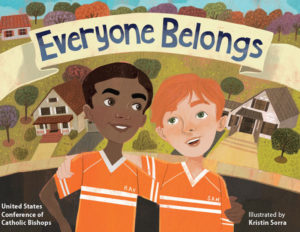 Everyone Belongs United States Conference of Catholic Bishops, illustrated by Kristin Sorra (Loyola Press) $8.95 OUR SALE PRICE = $7.16 Who knew that the USCC Bishops have written kids books? This is a beautiful, instructional children’s version of their “Open Wide our Hearts: The Enduring Call to Love” pastoral letter against racism. It is a letter all of us should take under advisement ourselves, discerning how these spiritual leaders are right to speak well into our sinful situation. This colorful paperback invites readers into a nice story of a multi-racial soccer team and the children’s coach; two of the boys who are teammates are good friends from school; one, Sam, an Anglo boy, the other a boy from Africa, named Ray Ikanga. After soccer practice they learn that the African family has moved into the neighborhood, allow the two families to be even more friendly. It’s all good as they share relationships and recipes. Eventually, something very ugly happens (“Go Home” is spray painted on the Ikanga’s garage door) and the overt act of racism has to be dealt with, in the neighborhood, in school and in church. Here we see what a group of kids as they are guided by wise adults can do, how they learn about respect and hospitality and the theology of dignity found in Catholic social teaching (although they never call it that, actually.) As things are made right there is confession and renewal and a priest helps with a house blessing and prayer. This is a story which is useful for teaching much about our world.
Everyone Belongs United States Conference of Catholic Bishops, illustrated by Kristin Sorra (Loyola Press) $8.95 OUR SALE PRICE = $7.16 Who knew that the USCC Bishops have written kids books? This is a beautiful, instructional children’s version of their “Open Wide our Hearts: The Enduring Call to Love” pastoral letter against racism. It is a letter all of us should take under advisement ourselves, discerning how these spiritual leaders are right to speak well into our sinful situation. This colorful paperback invites readers into a nice story of a multi-racial soccer team and the children’s coach; two of the boys who are teammates are good friends from school; one, Sam, an Anglo boy, the other a boy from Africa, named Ray Ikanga. After soccer practice they learn that the African family has moved into the neighborhood, allow the two families to be even more friendly. It’s all good as they share relationships and recipes. Eventually, something very ugly happens (“Go Home” is spray painted on the Ikanga’s garage door) and the overt act of racism has to be dealt with, in the neighborhood, in school and in church. Here we see what a group of kids as they are guided by wise adults can do, how they learn about respect and hospitality and the theology of dignity found in Catholic social teaching (although they never call it that, actually.) As things are made right there is confession and renewal and a priest helps with a house blessing and prayer. This is a story which is useful for teaching much about our world.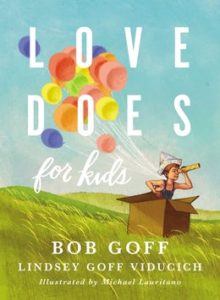 Love Does for Kids Bob Goff & Lindsey Goff Viducich, illustrated by Michael Lauritano (Tommy Nelson) $16.99 OUR SALE PRICE = $13.59 I hope you know that we really like Bob Goff and always are showing off his Love Does: Discover a Secretly Incredible Life in an Ordinary World and the follow up, Everybody, Always: Becoming Love in a World Full of Setbacks and Difficult People, not to mention his Live in Grace, Walk in Love, a year-long hardback daily devotional that came out this past fall. (And, yes, we are taking pre-orders for his mid-June 2020 release Dream Big: Know What You Want, Why You Want It, and What You’re Going to Do (Nelson; $26.99.) Hooray!
Love Does for Kids Bob Goff & Lindsey Goff Viducich, illustrated by Michael Lauritano (Tommy Nelson) $16.99 OUR SALE PRICE = $13.59 I hope you know that we really like Bob Goff and always are showing off his Love Does: Discover a Secretly Incredible Life in an Ordinary World and the follow up, Everybody, Always: Becoming Love in a World Full of Setbacks and Difficult People, not to mention his Live in Grace, Walk in Love, a year-long hardback daily devotional that came out this past fall. (And, yes, we are taking pre-orders for his mid-June 2020 release Dream Big: Know What You Want, Why You Want It, and What You’re Going to Do (Nelson; $26.99.) Hooray! As It Is in Heaven: A Collection of Prayers for All Ages illustrated by Eric Puybaret (Eerdmans Books for Young Readers) $17.99 OUR SALE PRICE = $14.39 Okay, this is a beautiful book, and would make a remarkable gift that would be cherished by some. It is quite ecumenical, which is to say that some of the prayers are specifically Roman Catholic while others are more generally accepted in the broader body of Christ. The prayers are in large, attractive font, accompanied by a full color and often allusive painting on the facing page. They are clearly meant to compliment each other, making this an enchanting volume to use — to behold.
As It Is in Heaven: A Collection of Prayers for All Ages illustrated by Eric Puybaret (Eerdmans Books for Young Readers) $17.99 OUR SALE PRICE = $14.39 Okay, this is a beautiful book, and would make a remarkable gift that would be cherished by some. It is quite ecumenical, which is to say that some of the prayers are specifically Roman Catholic while others are more generally accepted in the broader body of Christ. The prayers are in large, attractive font, accompanied by a full color and often allusive painting on the facing page. They are clearly meant to compliment each other, making this an enchanting volume to use — to behold.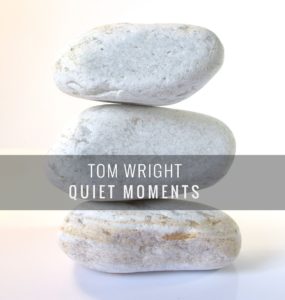 Quiet Moments Tom Wright (Monarch Press) $9.99 OUR SALE PRICE = $7.99 Yes, yes, it’s that N.T. Wright, famous Biblical scholar and historian of first century Jewish and early Christian thought. This is a little hardback gift book of free verse poems he wrote years ago, not for kids, but illustrated with lovely full color photographs of mostly nature scenes, waterfalls, leaves, flames, sky, and the like. We might be the only place around that has some of these lovely gift items and we list it here — we only have a few left, actually — as it might work for a teen or young adult who likes her theology in poetic terms. It’s pretty great, actually, inspiring meditations to “help the reader explore the world around them and the presence of God.” I think these simple reflections could help bring comfort and perhaps calm to an anxious heart. Be still and know? Maybe this will help…
Quiet Moments Tom Wright (Monarch Press) $9.99 OUR SALE PRICE = $7.99 Yes, yes, it’s that N.T. Wright, famous Biblical scholar and historian of first century Jewish and early Christian thought. This is a little hardback gift book of free verse poems he wrote years ago, not for kids, but illustrated with lovely full color photographs of mostly nature scenes, waterfalls, leaves, flames, sky, and the like. We might be the only place around that has some of these lovely gift items and we list it here — we only have a few left, actually — as it might work for a teen or young adult who likes her theology in poetic terms. It’s pretty great, actually, inspiring meditations to “help the reader explore the world around them and the presence of God.” I think these simple reflections could help bring comfort and perhaps calm to an anxious heart. Be still and know? Maybe this will help…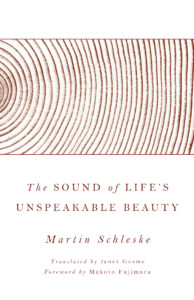 The Sound of Life’s Unspeakable Beauty Martin Schleske (Eerdmans) $24.99 Maybe once or twice a year I get an impassioned note from somebody in the book biz – a sales representative or editor that knows us – sending an early manuscript with a handwritten note insisting that this may be their favorite book in a long time, a stellar project, and they wanted me to be aware, etc. This is a true privilege and since it doesn’t happen often, I take such suggestions seriously. The Sound of Life’s Unspeakable Beauty came from a professional at Eerdmans saying mostly that it was just so beautiful, that it was gloriously exceptional and he was sure I’d appreciate it. The prose was beautiful and he promised that the publisher would be doing the book on high-quality glossy paper and two-color ink because the writing (and moody black and white photographs done by a respected German photographer) deserved such a weighty, handsome presentation.
The Sound of Life’s Unspeakable Beauty Martin Schleske (Eerdmans) $24.99 Maybe once or twice a year I get an impassioned note from somebody in the book biz – a sales representative or editor that knows us – sending an early manuscript with a handwritten note insisting that this may be their favorite book in a long time, a stellar project, and they wanted me to be aware, etc. This is a true privilege and since it doesn’t happen often, I take such suggestions seriously. The Sound of Life’s Unspeakable Beauty came from a professional at Eerdmans saying mostly that it was just so beautiful, that it was gloriously exceptional and he was sure I’d appreciate it. The prose was beautiful and he promised that the publisher would be doing the book on high-quality glossy paper and two-color ink because the writing (and moody black and white photographs done by a respected German photographer) deserved such a weighty, handsome presentation. Keys to Bonhoeffer’s Haus: Exploring the World and Wisdom of Dietrich Bonhoeffer Laura M. Fabrycky (Fortress Press) $25.99 When I said that many of these wonderful, mostly brand new releases in this issue of BookNotes, deserve more extended reviews, Laura Fabrycky’s Keys to Bonhoeffer’s Haus is certainly one that should be honored with a very through discussion. It is, without a doubt, one of the best books so far in 2020 and I am confident will be on may “year’s best” lists when we get to year’s end. It is timely, beautiful, informative, and exceptionally profound. I loved it.
Keys to Bonhoeffer’s Haus: Exploring the World and Wisdom of Dietrich Bonhoeffer Laura M. Fabrycky (Fortress Press) $25.99 When I said that many of these wonderful, mostly brand new releases in this issue of BookNotes, deserve more extended reviews, Laura Fabrycky’s Keys to Bonhoeffer’s Haus is certainly one that should be honored with a very through discussion. It is, without a doubt, one of the best books so far in 2020 and I am confident will be on may “year’s best” lists when we get to year’s end. It is timely, beautiful, informative, and exceptionally profound. I loved it.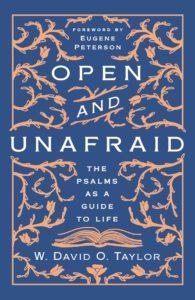 Open and Unafraid: The Psalms as a Guide to Life W. David O. Taylor (Thomas Nelson) $24.99 I hope you know this vivid author who has written or edited several volumes on the relationship between Christian faith and the arts. He has a few pretty academic titles such as Glimpses of the New Creation: Worship and the Formative Power of the Arts (Eerdmans; $22.00) and The Theater of God’s Glory: Calvin, Creation and the Liturgical Arts (Eerdmans; $30.00.) I raved here at BookNotes several times about his important, co-edited volume Contemporary Art and the Church: A Conversation Between Two Worlds (IVP Academic; $30.00.) I often tell people that his For the Beauty of the Church: Casting a Vision for the Arts (Baker; $20.00) ought to be in the hands of every pastor and church leader; it’s a great collection of talks by the likes of Andy Crouch, Jeremy Begbie, Lauren Winner, Luci Shaw and Eugene Peterson. I do hope you at least know that one.
Open and Unafraid: The Psalms as a Guide to Life W. David O. Taylor (Thomas Nelson) $24.99 I hope you know this vivid author who has written or edited several volumes on the relationship between Christian faith and the arts. He has a few pretty academic titles such as Glimpses of the New Creation: Worship and the Formative Power of the Arts (Eerdmans; $22.00) and The Theater of God’s Glory: Calvin, Creation and the Liturgical Arts (Eerdmans; $30.00.) I raved here at BookNotes several times about his important, co-edited volume Contemporary Art and the Church: A Conversation Between Two Worlds (IVP Academic; $30.00.) I often tell people that his For the Beauty of the Church: Casting a Vision for the Arts (Baker; $20.00) ought to be in the hands of every pastor and church leader; it’s a great collection of talks by the likes of Andy Crouch, Jeremy Begbie, Lauren Winner, Luci Shaw and Eugene Peterson. I do hope you at least know that one.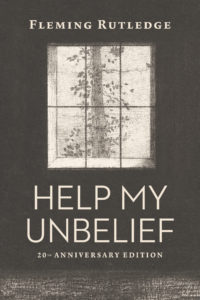 Help My Unbelief: 20th Anniversary Edition Fleming Rutledge (Eerdmans) $25.99 I am sure you know of our fondness for the elegant Episcopal preacher, pastor, priest, and, increasingly, respected public intellectual, the Rev. Dr. Fleming Rutledge. We are not alone in having raved about her tour de force, The Crucifixion: Understanding the Death of Jesus Christ (Eerdmans; $30.00) or her extraordinary, hefty collection of Advent sermons, Advent: The Once and Future Coming of Jesus Christ (Eerdmans; $30.00) both which are essential volumes to own. I often say that her The Undoing of Death: Sermons for Holy Week and Easter (Eerdmans; $24.00) is one I read parts of every Holy Week season; I might suggest we need it now more than ever. She has a major book on Lord of the Rings called The Battle for Middle-earth: Tolkien’s Divine Design in “The Lord of the Rings”(Eerdmans; $24.00) which I know she loves and she has several collections of her theologically-rich and often rousing sermons.
Help My Unbelief: 20th Anniversary Edition Fleming Rutledge (Eerdmans) $25.99 I am sure you know of our fondness for the elegant Episcopal preacher, pastor, priest, and, increasingly, respected public intellectual, the Rev. Dr. Fleming Rutledge. We are not alone in having raved about her tour de force, The Crucifixion: Understanding the Death of Jesus Christ (Eerdmans; $30.00) or her extraordinary, hefty collection of Advent sermons, Advent: The Once and Future Coming of Jesus Christ (Eerdmans; $30.00) both which are essential volumes to own. I often say that her The Undoing of Death: Sermons for Holy Week and Easter (Eerdmans; $24.00) is one I read parts of every Holy Week season; I might suggest we need it now more than ever. She has a major book on Lord of the Rings called The Battle for Middle-earth: Tolkien’s Divine Design in “The Lord of the Rings”(Eerdmans; $24.00) which I know she loves and she has several collections of her theologically-rich and often rousing sermons.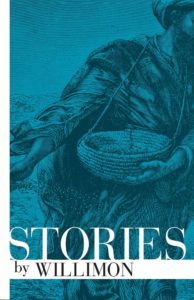 Stories by Willimon William Willimon (Abingdon) $19.99 I still remember the first time I heard Willimon, years ago, at a local preaching workshop. Among other things, he told stories (some true, some embellished, perhaps some invented) and it was utterly, amazingly, captivating. Those that know his award-winning sermons, his lectures, or his lively books, know how he has this exceptional gift of being both a Southern-type storyteller (with down home yarns that will make you laugh out loud or fight back tears) and an learned scholar, able to teach complex theological truths with the help of illustration and teacherly tales. He has long kept alive the habit of finding stories that “will preach” and preach them, he does.
Stories by Willimon William Willimon (Abingdon) $19.99 I still remember the first time I heard Willimon, years ago, at a local preaching workshop. Among other things, he told stories (some true, some embellished, perhaps some invented) and it was utterly, amazingly, captivating. Those that know his award-winning sermons, his lectures, or his lively books, know how he has this exceptional gift of being both a Southern-type storyteller (with down home yarns that will make you laugh out loud or fight back tears) and an learned scholar, able to teach complex theological truths with the help of illustration and teacherly tales. He has long kept alive the habit of finding stories that “will preach” and preach them, he does.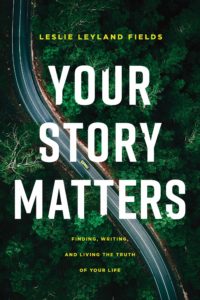 Your Story Matters: Finding, Writing, and Living the Truth of Your Life Leslie Leyland Fields (NavPress) $16.99 This just came and I’ve been looking forward to diving in. I think Leslie is such a very interesting person and such a talented writer we’d read almost anything she did. (That best-selling and esteemed novelist Brett Lott calls it “magical” and “essential” doesn’t hurt either, eh?) She came to our attention when she wrote the brave and truthful Parenting Is Your Highest Calling — And 8 Other Myths That Trap Us in Worry and Guilt (Waterbrook; $14.99) and then when she edited the absolutely exquisite The Spirit of Food: Thirty-Four Writers on Feasting and Fasting Toward God (Cascade; $32.00), one of my all-time favorite books, ever. Recently she edited The Wonder Years: 40 Women over 40 on Aging, Faith, Beauty, and Strength (Kregel; $15.99), which was put together very nicely and a number of our customers have really found help in her Forgiving Our Fathers and Mothers: Finding Freedom from Hurt and Hate (Nelson; $15.99.)
Your Story Matters: Finding, Writing, and Living the Truth of Your Life Leslie Leyland Fields (NavPress) $16.99 This just came and I’ve been looking forward to diving in. I think Leslie is such a very interesting person and such a talented writer we’d read almost anything she did. (That best-selling and esteemed novelist Brett Lott calls it “magical” and “essential” doesn’t hurt either, eh?) She came to our attention when she wrote the brave and truthful Parenting Is Your Highest Calling — And 8 Other Myths That Trap Us in Worry and Guilt (Waterbrook; $14.99) and then when she edited the absolutely exquisite The Spirit of Food: Thirty-Four Writers on Feasting and Fasting Toward God (Cascade; $32.00), one of my all-time favorite books, ever. Recently she edited The Wonder Years: 40 Women over 40 on Aging, Faith, Beauty, and Strength (Kregel; $15.99), which was put together very nicely and a number of our customers have really found help in her Forgiving Our Fathers and Mothers: Finding Freedom from Hurt and Hate (Nelson; $15.99.) Engaging the World with Abraham Kuyper Michael R. Wagenman (Lexham) $12.99 The author of this lovely little paperback, who got his PhD at the University of Bristol, first came to my attention in his chapter in a very important anthology about Kuyper and the implications of a Kuyperian worldview called On Kuyper: A Collection of Readings on the Life, Work & Legacy of Abraham Kuyper, edited by Steve Bishop & John H. Kok (Dordt College Press; $36.00.) Wagenman is now the Christian Reformed Church chaplain at Western University (in London, Canada). He also teaches theology at Western and New Testament at Redeemer University College (Ancaster, Ontario.) I am so glad to remind you of this again (it isn’t terribly new) as it is such a fine introduction to how some of us tend to think about cultural engagement. It is the second in a handsome little series called “Lived Theology” and serves not only as a guide to thinking about our role in various spheres of culture in faithful, fruitful ways but it is, obviously, a great introduction to the life and thought and social vision of the famous Dutch theologian turned statesman and Prime Minister of Holland.
Engaging the World with Abraham Kuyper Michael R. Wagenman (Lexham) $12.99 The author of this lovely little paperback, who got his PhD at the University of Bristol, first came to my attention in his chapter in a very important anthology about Kuyper and the implications of a Kuyperian worldview called On Kuyper: A Collection of Readings on the Life, Work & Legacy of Abraham Kuyper, edited by Steve Bishop & John H. Kok (Dordt College Press; $36.00.) Wagenman is now the Christian Reformed Church chaplain at Western University (in London, Canada). He also teaches theology at Western and New Testament at Redeemer University College (Ancaster, Ontario.) I am so glad to remind you of this again (it isn’t terribly new) as it is such a fine introduction to how some of us tend to think about cultural engagement. It is the second in a handsome little series called “Lived Theology” and serves not only as a guide to thinking about our role in various spheres of culture in faithful, fruitful ways but it is, obviously, a great introduction to the life and thought and social vision of the famous Dutch theologian turned statesman and Prime Minister of Holland.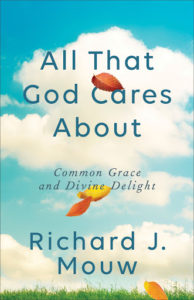 By the way – just a little heads up. This June we will be raving about a really, really interesting and important book exploring Kuyper’s views of what is sometimes called in neo-Calvinist circles, ‘common grace’ by the aforementioned Richard J. Mouw. It will be called All That God Cares about: Common Grace and Divine Delight (Brazos Press; $21.99) and it is very much a sequel, or extension, of his previous (2002) book on common grace called He Shines in All That’s Fair: Culture and Common Grace (Eerdmans; $15.50.) There are a few surprises in this forthcoming Mouw one, and we’ll be telling you more later this Spring. You can, of course, as always, PRE-ORDER it now. 20% OFF, too.
By the way – just a little heads up. This June we will be raving about a really, really interesting and important book exploring Kuyper’s views of what is sometimes called in neo-Calvinist circles, ‘common grace’ by the aforementioned Richard J. Mouw. It will be called All That God Cares about: Common Grace and Divine Delight (Brazos Press; $21.99) and it is very much a sequel, or extension, of his previous (2002) book on common grace called He Shines in All That’s Fair: Culture and Common Grace (Eerdmans; $15.50.) There are a few surprises in this forthcoming Mouw one, and we’ll be telling you more later this Spring. You can, of course, as always, PRE-ORDER it now. 20% OFF, too.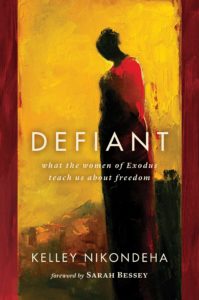 Defiant: What the Women of Exodus Teach Us About Freedom Kelley Nikondeha (Eerdmans) $17.99 We were blown away by the wit and wisdom and radical insight from Kelley Nikondeha shown in her first book Adopted: The Sacrament of Belonging in a Fractured World (Eerdmans; $16.99) where she shared her own cross-cultural and multi-ethnic family story – she married a man from Burundi, and lives much of the year in Africa, where they adopted two children – as an entry and context for doing Biblical and theology reflection about belonging. This move from experience to Scripture and back, writing fascinating personal narrative that leads to deepened insight into the Bible’s relevance – in that case about being adopted by God and accepted into God’s family and all the implications of that inclusive theology — characterizes this brand new one, too.
Defiant: What the Women of Exodus Teach Us About Freedom Kelley Nikondeha (Eerdmans) $17.99 We were blown away by the wit and wisdom and radical insight from Kelley Nikondeha shown in her first book Adopted: The Sacrament of Belonging in a Fractured World (Eerdmans; $16.99) where she shared her own cross-cultural and multi-ethnic family story – she married a man from Burundi, and lives much of the year in Africa, where they adopted two children – as an entry and context for doing Biblical and theology reflection about belonging. This move from experience to Scripture and back, writing fascinating personal narrative that leads to deepened insight into the Bible’s relevance – in that case about being adopted by God and accepted into God’s family and all the implications of that inclusive theology — characterizes this brand new one, too.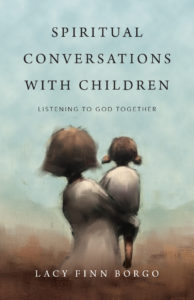 Spiritual Conversations with Children: Listening to God Together Lacy Finn Borgo (IVP/formatio) $17.00 We just got this great-looking book into the shop and given the stress and hecticness here, I haven’t had time to study it much. But I can tell you three or four quick things at least: firstly, books in the formatio imprint or line of IVP are among the best resources on spirituality being published today. Without fail they are well written and thoughtful, Biblical and grounded yet relevant and upbeat. Some are a bit more mystical than others, but all are rooted in the broad stream of contemplative spirituality and transformational practices seeking to nurture people into the ways of Jesus. This new book — on listening for and to God with children! — is in that formatio line, so you should know we trust it. I’m sure it is theologically reliable and well written.
Spiritual Conversations with Children: Listening to God Together Lacy Finn Borgo (IVP/formatio) $17.00 We just got this great-looking book into the shop and given the stress and hecticness here, I haven’t had time to study it much. But I can tell you three or four quick things at least: firstly, books in the formatio imprint or line of IVP are among the best resources on spirituality being published today. Without fail they are well written and thoughtful, Biblical and grounded yet relevant and upbeat. Some are a bit more mystical than others, but all are rooted in the broad stream of contemplative spirituality and transformational practices seeking to nurture people into the ways of Jesus. This new book — on listening for and to God with children! — is in that formatio line, so you should know we trust it. I’m sure it is theologically reliable and well written.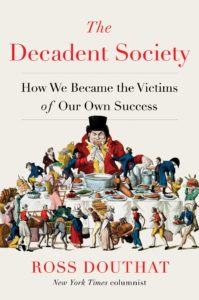 The Decadent Society: How We Became the Victims of Our Own Success Ross Douthat (Avid Reader Press/Simon & Schuster) $27.00 I trust you know of Mr. Douthat, the outspoken and vibrant conservative columnist for the New York Times (and before that, senior editor of The Atlantic.) Douthat has written books such as Bad Religion (with the telling subtitle How We Became a Nation of Heretics (The Free Press; $17.00) where he critiques the less than adequate and often less than orthodox thinking prevalent in mainline liberal congregations, in high-energy evangelical churches, and in his own Roman Catholic world. The brilliant Alan Jacobs says of it, “Bad Religion is superb: sharply critical of the amazing variety of American religious pathologies, but fair; blunt in diagnosis, but just; telling a dark tale, but telling it hopefully. For those trying to understand the last half-century or more of American religion, and to strive for a better future, it is an indispensable book.”
The Decadent Society: How We Became the Victims of Our Own Success Ross Douthat (Avid Reader Press/Simon & Schuster) $27.00 I trust you know of Mr. Douthat, the outspoken and vibrant conservative columnist for the New York Times (and before that, senior editor of The Atlantic.) Douthat has written books such as Bad Religion (with the telling subtitle How We Became a Nation of Heretics (The Free Press; $17.00) where he critiques the less than adequate and often less than orthodox thinking prevalent in mainline liberal congregations, in high-energy evangelical churches, and in his own Roman Catholic world. The brilliant Alan Jacobs says of it, “Bad Religion is superb: sharply critical of the amazing variety of American religious pathologies, but fair; blunt in diagnosis, but just; telling a dark tale, but telling it hopefully. For those trying to understand the last half-century or more of American religion, and to strive for a better future, it is an indispensable book.”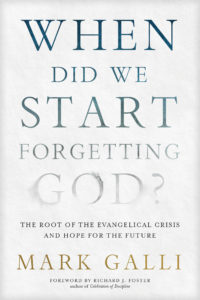 When Did We Start Forgetting God? The Root of the Evangelical Crisis and Hope for the Future Mark Galli (Tyndale) $16.99 I found this book to be very good and edifying reading, a fascinating reminder of so many things that make me still want to call myself an evangelical. I didn’t always concur with what I might call his pietism — not piety, which is good, of course, but overstating its role. More on that, later, pehaps. We are in confusing times these days, and few BookNotes readers will not know my own frustration – extreme at times – with how some conservative Christians (usually more fundamentalist than evangelical, despite what the media calls them) have so embraced our current President, despite his demonstrable lack of leadership wisdom and any sort of Godly ethic or Christian demeanor. This has given evangelicalism such a bad reputation it has evoked good conversations; I adored Richard Mouw’s must-read Restless Faith: Holding Evangelical Beliefs in a World of Contested Labels (Brazos; $19.99) and often have commended here the especially helpful collection of a variety of angles and voices on the question in Still Evangelical? Insiders Reconsider Political, Social, and Theological Meaning (IVP; $20.00) in which Mark Galli has a chapter.
When Did We Start Forgetting God? The Root of the Evangelical Crisis and Hope for the Future Mark Galli (Tyndale) $16.99 I found this book to be very good and edifying reading, a fascinating reminder of so many things that make me still want to call myself an evangelical. I didn’t always concur with what I might call his pietism — not piety, which is good, of course, but overstating its role. More on that, later, pehaps. We are in confusing times these days, and few BookNotes readers will not know my own frustration – extreme at times – with how some conservative Christians (usually more fundamentalist than evangelical, despite what the media calls them) have so embraced our current President, despite his demonstrable lack of leadership wisdom and any sort of Godly ethic or Christian demeanor. This has given evangelicalism such a bad reputation it has evoked good conversations; I adored Richard Mouw’s must-read Restless Faith: Holding Evangelical Beliefs in a World of Contested Labels (Brazos; $19.99) and often have commended here the especially helpful collection of a variety of angles and voices on the question in Still Evangelical? Insiders Reconsider Political, Social, and Theological Meaning (IVP; $20.00) in which Mark Galli has a chapter.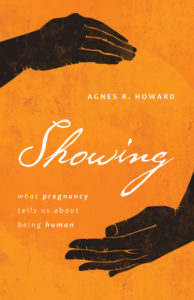 Showing: What Pregnancy Tell Us About Being Human Agnes R. Howard (Eerdmans) $21.00 / our sale price = $16.80 Just the other day my wife and I were talking with our staff about publishers that just consistently do great work and even surprise us sometimes. Our favorite publishers offer delightful topics, great writing, good covers, sometimes stunningly so. Eerdmans is surely one of those and although they are known for hefty, expensive, works of Biblical studies and theology, their more “trade” sorts of titles are almost always wonderful. Showing is a perfect example of this very thing – a really well-written book, filling the need for thoughtful rumination on something everybody should care about. And look at that cover – believe me, it’s worth getting this book for this little work of art itself!
Showing: What Pregnancy Tell Us About Being Human Agnes R. Howard (Eerdmans) $21.00 / our sale price = $16.80 Just the other day my wife and I were talking with our staff about publishers that just consistently do great work and even surprise us sometimes. Our favorite publishers offer delightful topics, great writing, good covers, sometimes stunningly so. Eerdmans is surely one of those and although they are known for hefty, expensive, works of Biblical studies and theology, their more “trade” sorts of titles are almost always wonderful. Showing is a perfect example of this very thing – a really well-written book, filling the need for thoughtful rumination on something everybody should care about. And look at that cover – believe me, it’s worth getting this book for this little work of art itself!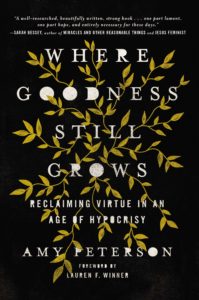 Where Goodness Still Grows: Reclaiming Virtue in an Age of Hypocrisy Amy Peterson (W Publishing Group) $26.99 / our sale price = $21.59 Lauren Winner wrote the eloquent, compelling foreword to this saying she had read it multiple times (I suspect she was a writing mentor to the author) and that she will read it yet again. It is one of those brilliantly conceived, beautifully rendered, very special books that deserve this kind of recommendation. It will be touted as one of the best books of 2020, I’m sure.
Where Goodness Still Grows: Reclaiming Virtue in an Age of Hypocrisy Amy Peterson (W Publishing Group) $26.99 / our sale price = $21.59 Lauren Winner wrote the eloquent, compelling foreword to this saying she had read it multiple times (I suspect she was a writing mentor to the author) and that she will read it yet again. It is one of those brilliantly conceived, beautifully rendered, very special books that deserve this kind of recommendation. It will be touted as one of the best books of 2020, I’m sure.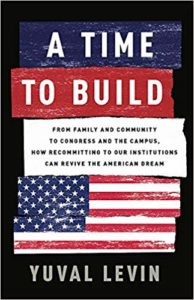 A Time to Build: From Family and Community to Congress and the Campus, How Recommitting to Our Institutions Can Revive the American Dream Yuval Levin (Basic Books) $28.00 / our sale price = $22.40 I suspect this major work wouldn’t have sold well at Jubilee since it is a fairly scholarly hardback by a serious social critic (who is not a follower of Christ and most likely not well known in young adult circles.) Despite the breathy Kingdom vision at Jubilee that assures us that we can and should transform the world, most younger folks aren’t quite aware of how significant institutions are. A book about this isn’t going to really fly off the shelves anywhere, I’m afraid (since most Americans think they have an aversion to institutions) and most likely not among the rising generation.
A Time to Build: From Family and Community to Congress and the Campus, How Recommitting to Our Institutions Can Revive the American Dream Yuval Levin (Basic Books) $28.00 / our sale price = $22.40 I suspect this major work wouldn’t have sold well at Jubilee since it is a fairly scholarly hardback by a serious social critic (who is not a follower of Christ and most likely not well known in young adult circles.) Despite the breathy Kingdom vision at Jubilee that assures us that we can and should transform the world, most younger folks aren’t quite aware of how significant institutions are. A book about this isn’t going to really fly off the shelves anywhere, I’m afraid (since most Americans think they have an aversion to institutions) and most likely not among the rising generation.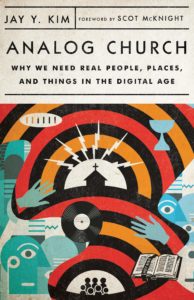 Analog Church: Why We Need Real People, Places, and Things in the Digital Age Jay Y. Kim (IVP) $18.00 / our sale price = $14.40 When I saw the carton full of Jay Kim’s brand new book when we got back from Jubilee I smacked my head, exclaiming right out loud in less than admirable language, how I wished this had come a few days earlier. I would have promoted it from the main stage at the conference – it is surely that good and that urgent. And it would have been great to promote to these young adults and ministries that are so effective in reaching them.
Analog Church: Why We Need Real People, Places, and Things in the Digital Age Jay Y. Kim (IVP) $18.00 / our sale price = $14.40 When I saw the carton full of Jay Kim’s brand new book when we got back from Jubilee I smacked my head, exclaiming right out loud in less than admirable language, how I wished this had come a few days earlier. I would have promoted it from the main stage at the conference – it is surely that good and that urgent. And it would have been great to promote to these young adults and ministries that are so effective in reaching them.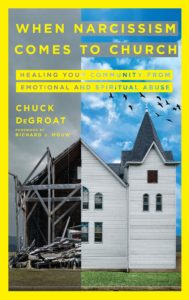 When Narcissism Comes to Church: Healing Your Community From Emotional and Spiritual Abuse Chuck DeGroat (IVP) $22.00 / our sale price = $17.60 Over the years we have had bunches of books on toxic faith, on dysfunctional churches, on recovering from spiritual abuse. They have not sold that well because not that many folks are in cult-like groups, not that many congregations are abusive, not that many, or so we thought, were caught up in heavy-handed discipling relationships or submitted to over-wrought hierarchies and super-strict, authoritarian religions leaders. With a few ugly exceptions (and the super weird outliers that really are cults) most churches have little going on in terms of authority structures; our individualist worldview allows us to (or insists that we) just ignore what our churches and pastors and leaders think, believing what we want and doing what we want.
When Narcissism Comes to Church: Healing Your Community From Emotional and Spiritual Abuse Chuck DeGroat (IVP) $22.00 / our sale price = $17.60 Over the years we have had bunches of books on toxic faith, on dysfunctional churches, on recovering from spiritual abuse. They have not sold that well because not that many folks are in cult-like groups, not that many congregations are abusive, not that many, or so we thought, were caught up in heavy-handed discipling relationships or submitted to over-wrought hierarchies and super-strict, authoritarian religions leaders. With a few ugly exceptions (and the super weird outliers that really are cults) most churches have little going on in terms of authority structures; our individualist worldview allows us to (or insists that we) just ignore what our churches and pastors and leaders think, believing what we want and doing what we want.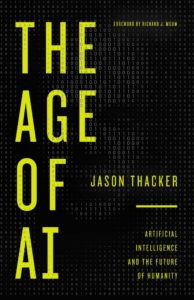 The Age of AI: Artificial Intelligence and the Future of Humanity Jason Thacker (Zondervan) $22.99 / our sale price = $18.39 If there was any one book that I wish would have come a week and a half earlier so we could have taken it to Jubilee, it would have been this. There was a well-attended workshop there by a serious scholar of AI and practitioner of big data (and another on cyber security.) While these leaders were surely thoughtful about relating faith to their discernment of the issues in their field, none had a solid, go-to book that studies this stuff from a reliable, Biblically-informed worldview. Some professions have plenty of such books, but in emerging field, there is a drought. I actually tried to get this book a week earlier, hoping the publisher would be able to ship it early but that didn’t work out, so now that we have it, I want to spread the news.
The Age of AI: Artificial Intelligence and the Future of Humanity Jason Thacker (Zondervan) $22.99 / our sale price = $18.39 If there was any one book that I wish would have come a week and a half earlier so we could have taken it to Jubilee, it would have been this. There was a well-attended workshop there by a serious scholar of AI and practitioner of big data (and another on cyber security.) While these leaders were surely thoughtful about relating faith to their discernment of the issues in their field, none had a solid, go-to book that studies this stuff from a reliable, Biblically-informed worldview. Some professions have plenty of such books, but in emerging field, there is a drought. I actually tried to get this book a week earlier, hoping the publisher would be able to ship it early but that didn’t work out, so now that we have it, I want to spread the news.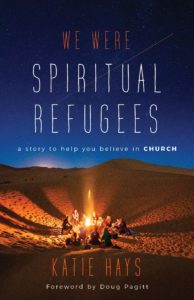 We Were Spiritual Refugees: A Story to Help You Believe in Church Katie Hays (Eerdmans) $24.99 / our sale price = $19.99 I am part way through this and it is, in many, many ways, thrilling. It is wonderfully written, captivating, and, as one who is often looking for new examples of healthy church life (including nonconventional faith communities) I was eager to read this story of the outreach to the so-called “spiritual but not religious” or “nones.” I assumed, and was right, that We Were Spiritual Refugees is a book that will appeal to those who loved (as I did) Nadia Bolz-Weber’s Accidental Saints or Sara Miles Take This Bread and Jesus Freaks or even Laura Truax’s Love Let Go and other reports of what we used to call emergent churches. That Doug Pagitt, founder of Solomon’s Porch, wrote the foreword makes perfect sense. As I have come to expect from him, the few pages he wrote that opens the book are fascinating and compelling.
We Were Spiritual Refugees: A Story to Help You Believe in Church Katie Hays (Eerdmans) $24.99 / our sale price = $19.99 I am part way through this and it is, in many, many ways, thrilling. It is wonderfully written, captivating, and, as one who is often looking for new examples of healthy church life (including nonconventional faith communities) I was eager to read this story of the outreach to the so-called “spiritual but not religious” or “nones.” I assumed, and was right, that We Were Spiritual Refugees is a book that will appeal to those who loved (as I did) Nadia Bolz-Weber’s Accidental Saints or Sara Miles Take This Bread and Jesus Freaks or even Laura Truax’s Love Let Go and other reports of what we used to call emergent churches. That Doug Pagitt, founder of Solomon’s Porch, wrote the foreword makes perfect sense. As I have come to expect from him, the few pages he wrote that opens the book are fascinating and compelling.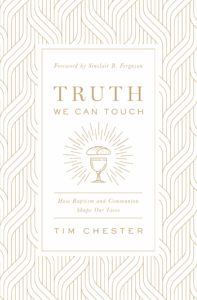 Truth We Can Touch: How Baptism and Communion Shapes Our Lives Tim Chester (with a foreword by Sinclair Ferguson) (Crossway) $17.99 / our sale price = $14.39 We have a very hefty and diverse collection of books about the sacraments and sacramental theology, here at the shop in Dallastown. Authors of various theological stripes and dispositions have weighed in – in part because for most of church history, in most quarters, this topic is essential and life-giving stuff. Eating and drinking together in church, or seeing one pass through the waters of baptism – what some Lutherans now call The Bath – are physical rituals, but more than that. They are God’s own appointed signs. We all agree on that.
Truth We Can Touch: How Baptism and Communion Shapes Our Lives Tim Chester (with a foreword by Sinclair Ferguson) (Crossway) $17.99 / our sale price = $14.39 We have a very hefty and diverse collection of books about the sacraments and sacramental theology, here at the shop in Dallastown. Authors of various theological stripes and dispositions have weighed in – in part because for most of church history, in most quarters, this topic is essential and life-giving stuff. Eating and drinking together in church, or seeing one pass through the waters of baptism – what some Lutherans now call The Bath – are physical rituals, but more than that. They are God’s own appointed signs. We all agree on that.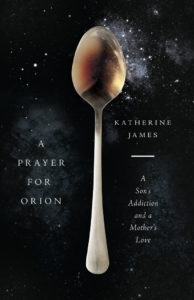 A Prayer for Orion: A Son’s Addiction and a Mother’s Love Katherine James (IVP) $16.00 / our sale price = $12.80 This stunning book did not just come out this week; I read it as soon as it came, more than a month ago but hardly felt worthy to review it. James is a noted and award winning novelist (her Can You See Anything Now? was published in the respected fiction line of Paraclete Press and both Beth and I enjoyed it.) Her husband has written books on living out faith in our culture and they have both become friends of ours. Years ago, Kate earned a fellowship at Columbia University and she taught fiction there. I say this to assure you that anything she writes is serious and well-crafted. She is a writer you should know.
A Prayer for Orion: A Son’s Addiction and a Mother’s Love Katherine James (IVP) $16.00 / our sale price = $12.80 This stunning book did not just come out this week; I read it as soon as it came, more than a month ago but hardly felt worthy to review it. James is a noted and award winning novelist (her Can You See Anything Now? was published in the respected fiction line of Paraclete Press and both Beth and I enjoyed it.) Her husband has written books on living out faith in our culture and they have both become friends of ours. Years ago, Kate earned a fellowship at Columbia University and she taught fiction there. I say this to assure you that anything she writes is serious and well-crafted. She is a writer you should know.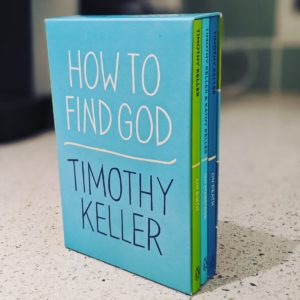 On Birth, On Marriage, and On Death Timothy Keller (Penguin) $10.00 each; small boxed set $30.00 / our sale prices = $8.00 each or $24.00 for the slipcased set These three small-sized paperbacks just arrived and they are provocative, wise, helpful. They are in what Tim and Kathy Keller are calling the “How to Find God” series and in the preface they note that many people are drawn to the biggest questions of life during times of transition. We catch ourselves pondering some of the deepest questions of our existence during major changes in our life stages — questions such as what am I really living for? do I have
On Birth, On Marriage, and On Death Timothy Keller (Penguin) $10.00 each; small boxed set $30.00 / our sale prices = $8.00 each or $24.00 for the slipcased set These three small-sized paperbacks just arrived and they are provocative, wise, helpful. They are in what Tim and Kathy Keller are calling the “How to Find God” series and in the preface they note that many people are drawn to the biggest questions of life during times of transition. We catch ourselves pondering some of the deepest questions of our existence during major changes in our life stages — questions such as what am I really living for? do I have 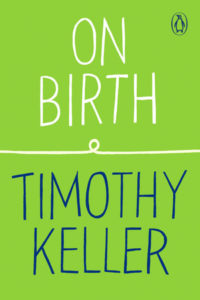 what it takes to face challenges? what do I believe about religion and do I have a relationship with God? — so these three books are designed to offer guidance to navigate some of these questions by pondering three pivotal life
what it takes to face challenges? what do I believe about religion and do I have a relationship with God? — so these three books are designed to offer guidance to navigate some of these questions by pondering three pivotal life 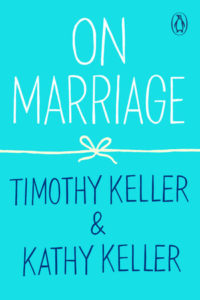 experiences.
experiences.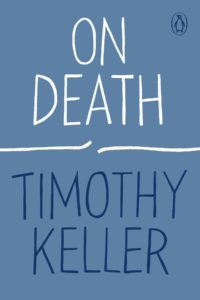 evangelist and apologetics guy (think of his weighty books Reason for God and Making Sense of God) that he truly wants to offer a reasonable life-line of gospel hope to anyone pondering life’s most momentous occurrences. Significant events such as birth, marriage, and death are milestones, after all. As it notes on the back cover, these are times when we experience our greatest happiness and our deepest grief.
evangelist and apologetics guy (think of his weighty books Reason for God and Making Sense of God) that he truly wants to offer a reasonable life-line of gospel hope to anyone pondering life’s most momentous occurrences. Significant events such as birth, marriage, and death are milestones, after all. As it notes on the back cover, these are times when we experience our greatest happiness and our deepest grief.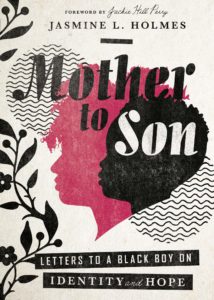 Mother To Son: Letters to a Black Boy on Identity and Hope Jasmine L. Holmes (IVP) $20.00 / our sale price = $16.00 Oh my goodness, I’ve been waiting for this for months, and can hardly believe it is actually here. Jasmine Holmes is said to be a very good writer and, of course, the topic here is extraordinarily poignant, if not extraordinary. For people of color, these talks are not uncommon. For those of us in the majority culture, we still may not know this, but every black family I’ve ever asked about this assured me they have had “the talk.” And I’m not talking about the birds and the bees, but the talk about what to do when (not if) the police stop you for no good reason. Talking about race and racism is simply a must for all of us in these hard times and we all need as much help as we can get.
Mother To Son: Letters to a Black Boy on Identity and Hope Jasmine L. Holmes (IVP) $20.00 / our sale price = $16.00 Oh my goodness, I’ve been waiting for this for months, and can hardly believe it is actually here. Jasmine Holmes is said to be a very good writer and, of course, the topic here is extraordinarily poignant, if not extraordinary. For people of color, these talks are not uncommon. For those of us in the majority culture, we still may not know this, but every black family I’ve ever asked about this assured me they have had “the talk.” And I’m not talking about the birds and the bees, but the talk about what to do when (not if) the police stop you for no good reason. Talking about race and racism is simply a must for all of us in these hard times and we all need as much help as we can get.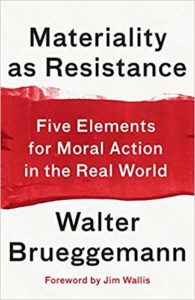 Materiality as Resistance: Five Elements for Moral Action in the Real World Walter Brueggemann (WJK) $15.00 / our sale price = $12.00 The fantastic, vivid foreword by Jim Wallis (which recommends this for Sunday school classes and Bible study groups) might give you a hint, but if you know anything about Brueggemann you will love, even savor, how he uses words; can’t you just imagine his deep voice, drawing out words and phrases, using words such as materiality, like poetry. You may not always get what his allusive wording means at first, but stick with him and it becomes powerfully clear. This book is about how to care about human flourishing by attention to money, food, body, time, and place. He lays out very clear ways that we can reengage our materiality for the sake of our neighbors and the common good.
Materiality as Resistance: Five Elements for Moral Action in the Real World Walter Brueggemann (WJK) $15.00 / our sale price = $12.00 The fantastic, vivid foreword by Jim Wallis (which recommends this for Sunday school classes and Bible study groups) might give you a hint, but if you know anything about Brueggemann you will love, even savor, how he uses words; can’t you just imagine his deep voice, drawing out words and phrases, using words such as materiality, like poetry. You may not always get what his allusive wording means at first, but stick with him and it becomes powerfully clear. This book is about how to care about human flourishing by attention to money, food, body, time, and place. He lays out very clear ways that we can reengage our materiality for the sake of our neighbors and the common good.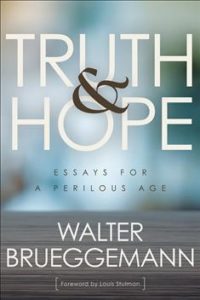 Truth and Hope: Essays for a Perilous Time Walter Brueggemann (WJK) $30.00 / our sale price = $24.00 It seems WJK has done this before — issued a major, serious, expensive volume and a slim, potent, smaller book. I’m glad, since the above-listed Materiality one is brief (and useful) but to get the full range of Brueggemann’s deep insight one really should wade through his more dense essays. These articles, scholarly essays, reviews, and sermons are a gold mine, it seems, and we surely have to recommend them here, now. This sturdy paperback is 260 pages (that is, you really get your money’s worth!)
Truth and Hope: Essays for a Perilous Time Walter Brueggemann (WJK) $30.00 / our sale price = $24.00 It seems WJK has done this before — issued a major, serious, expensive volume and a slim, potent, smaller book. I’m glad, since the above-listed Materiality one is brief (and useful) but to get the full range of Brueggemann’s deep insight one really should wade through his more dense essays. These articles, scholarly essays, reviews, and sermons are a gold mine, it seems, and we surely have to recommend them here, now. This sturdy paperback is 260 pages (that is, you really get your money’s worth!) The Collected Sermons of Walter Brueggemann Volume 3 (WJK) $35.00 / our sale price = $28.00 By the way, speaking of WJK’s robust Brueggemann publishing program, they also just released the marvelous third volume of his Collected Sermons. They have a whole set of collected sermon volumes by a variety of important preachers, and this is the third volume of Walt’s in this series. It is called, simply, The Collected Sermons of Walter Brueggemann Volume 3. There is a foreword by Barbara Brown Taylor, too (which is the only thing I’ve read in it so far. But, well, wow.) This collection features sixty sermons, preached mostly in the last five years. For his final public appearances, he preached at various churches and the famous Festival of Homiletics, including his last address there in 2018. Most of these collected here are based on lectionary texts, with numerous sermons on Advent-Christmas and Lent-Easter.
The Collected Sermons of Walter Brueggemann Volume 3 (WJK) $35.00 / our sale price = $28.00 By the way, speaking of WJK’s robust Brueggemann publishing program, they also just released the marvelous third volume of his Collected Sermons. They have a whole set of collected sermon volumes by a variety of important preachers, and this is the third volume of Walt’s in this series. It is called, simply, The Collected Sermons of Walter Brueggemann Volume 3. There is a foreword by Barbara Brown Taylor, too (which is the only thing I’ve read in it so far. But, well, wow.) This collection features sixty sermons, preached mostly in the last five years. For his final public appearances, he preached at various churches and the famous Festival of Homiletics, including his last address there in 2018. Most of these collected here are based on lectionary texts, with numerous sermons on Advent-Christmas and Lent-Easter.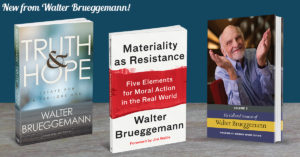
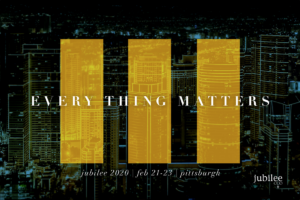 I’m sure you’ve heard that we just got back from the huge Jubilee conference where we serve each year by setting up a large book display for the nearly 4000 participants. Our Hearts & Minds Facebook page (and my own personal one) has featured some posts and pictures from the event and we’re grateful for the encouragement and prayers that sustained us. It’s always a bit stressful but it seemed harder than ever this year as we sensed the need for prayer. We cannot overstate how important this event is and how transformative it has been in significant ways for thousands over the years.
I’m sure you’ve heard that we just got back from the huge Jubilee conference where we serve each year by setting up a large book display for the nearly 4000 participants. Our Hearts & Minds Facebook page (and my own personal one) has featured some posts and pictures from the event and we’re grateful for the encouragement and prayers that sustained us. It’s always a bit stressful but it seemed harder than ever this year as we sensed the need for prayer. We cannot overstate how important this event is and how transformative it has been in significant ways for thousands over the years.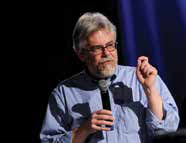 One of the fun things I get to do is describe books from up front on the well-designed, creatively lit stage. The book spiel is in the format of an interview (which somebody apparently thinks is a good idea) and it was executed well by our good friends Tommy Scales and Emily Bingham. When I was getting passionate about the importance of books on racism, Tommy dug into his black church traditions and dramatically fanned me; I’m tellin’ ya, that wouldn’t have happened if I were up there on my own! I’m glad Tommy and Emily (one of the most interesting and discerning readers we know) helped me get the job done. I wish you could have seen me tell about these books, up front, live and energetic.
One of the fun things I get to do is describe books from up front on the well-designed, creatively lit stage. The book spiel is in the format of an interview (which somebody apparently thinks is a good idea) and it was executed well by our good friends Tommy Scales and Emily Bingham. When I was getting passionate about the importance of books on racism, Tommy dug into his black church traditions and dramatically fanned me; I’m tellin’ ya, that wouldn’t have happened if I were up there on my own! I’m glad Tommy and Emily (one of the most interesting and discerning readers we know) helped me get the job done. I wish you could have seen me tell about these books, up front, live and energetic.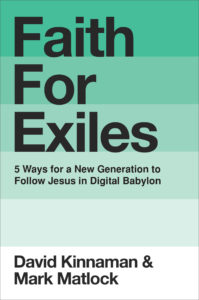 Faith for Exiles: 5 Ways for A New Generation to Follow Jesus in Digital Babylon David Kinnamen (Baker Publishing) $21.99. SALE PRICE = $15.39 I kicked off the first Jubilee book talk with this one for a few obvious reasons. If you followed my first review of this before it came out, or my comments when we named it a “Best Book of 2019” you may recall that it mentions the Jubilee conference (and the book buying that goes on there) as a window into effective young adult ministry. This is an ambitious and visionary generation and we simply must offer a full-orbed gospel that relates faith to vocation and shows how work matters to God and is connected to our life in God’s Kingdom. A book about Jubilee themes that mentions CCO and even the Jubilee book display by an author that was in the house? A no-brainer. Beth and I are glad to have David’s encouragement, too; he is such a good friend to us. His Sunday morning talk was powerful, too, given some serious sorrow in his own life. (Pray, please, for his wife Jill who has brain cancer.)
Faith for Exiles: 5 Ways for A New Generation to Follow Jesus in Digital Babylon David Kinnamen (Baker Publishing) $21.99. SALE PRICE = $15.39 I kicked off the first Jubilee book talk with this one for a few obvious reasons. If you followed my first review of this before it came out, or my comments when we named it a “Best Book of 2019” you may recall that it mentions the Jubilee conference (and the book buying that goes on there) as a window into effective young adult ministry. This is an ambitious and visionary generation and we simply must offer a full-orbed gospel that relates faith to vocation and shows how work matters to God and is connected to our life in God’s Kingdom. A book about Jubilee themes that mentions CCO and even the Jubilee book display by an author that was in the house? A no-brainer. Beth and I are glad to have David’s encouragement, too; he is such a good friend to us. His Sunday morning talk was powerful, too, given some serious sorrow in his own life. (Pray, please, for his wife Jill who has brain cancer.)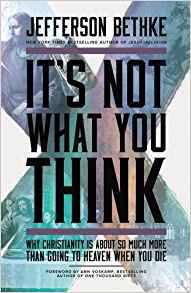 It’s Not What You Think: Why Christianity Is about So Much More Than Going to Heaven When You Die Jefferson Bethke (Thomas Nelson Publishing) $16.99. SALE PRICE = $11.89 Students like the young pastor and author and YouTube star Jefferson Bethke who is wise beyond his years. This feisty, fun, book offers a handful of fresh insights about the Christian faith and I announced it as a great one for anybody who wasn’t sure why there were there at this religious gathering or who wanted to know more than Sunday school clichés or pop culture stereotypes about what Christianity is really all about. While maybe not a full-on, worldviewish, reformational/Kuyperian perspective, it helps ordinary beginners realize that Biblical faith is, as Bethke says, “not what you think.”
It’s Not What You Think: Why Christianity Is about So Much More Than Going to Heaven When You Die Jefferson Bethke (Thomas Nelson Publishing) $16.99. SALE PRICE = $11.89 Students like the young pastor and author and YouTube star Jefferson Bethke who is wise beyond his years. This feisty, fun, book offers a handful of fresh insights about the Christian faith and I announced it as a great one for anybody who wasn’t sure why there were there at this religious gathering or who wanted to know more than Sunday school clichés or pop culture stereotypes about what Christianity is really all about. While maybe not a full-on, worldviewish, reformational/Kuyperian perspective, it helps ordinary beginners realize that Biblical faith is, as Bethke says, “not what you think.”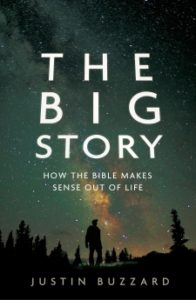 The Big Story: How the Bible Makes Sense Out of Life Justin Buzzard (Moody Press) $13.99 SALE PRICE = $9.79 I have highlighted this one at Jubilee the last few years for a couple of reasons. It captures the theme of Jubilee that the overarching Biblical story is the story out of which we are to live (and in this sense is an apologetic for the relevance of a big picture view of the Scriptures and their formative power) and it nicely explains the big “chapters” of the Christian story, the “acts” of the Biblical drama that the conference itself is so faithfully built around – creation, fall, redemption, and restoration. Buzzard is sharp and reliable and the book is short and sweet. Perfect for young students new to this approach.
The Big Story: How the Bible Makes Sense Out of Life Justin Buzzard (Moody Press) $13.99 SALE PRICE = $9.79 I have highlighted this one at Jubilee the last few years for a couple of reasons. It captures the theme of Jubilee that the overarching Biblical story is the story out of which we are to live (and in this sense is an apologetic for the relevance of a big picture view of the Scriptures and their formative power) and it nicely explains the big “chapters” of the Christian story, the “acts” of the Biblical drama that the conference itself is so faithfully built around – creation, fall, redemption, and restoration. Buzzard is sharp and reliable and the book is short and sweet. Perfect for young students new to this approach.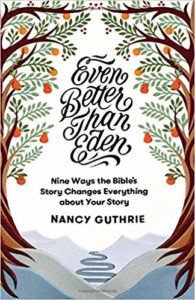 Even Better Than Eden: Nine Ways the Bible’s Story Changes Everything About Your Story Nancy Guthrie (Crossway) $16.99 SALE PRICE = $11.89 Again, catch the sub-title illustrating that serious Bible study can be valuable for life, for our story. Not only does this resonant with young adults these days, but it is, we are convinced, the best way to approach the Scriptures – not as a law book (as fundamentalists and dogmatists might) or merely as old religious history (as some progressives and mainline liberals might) but as a historically redemptive, unfolding, Christ-centered, Kingdom story. Guthrie traces a handful of words or images or metaphors – garden, temple, Sabbath, city, clothing, and more – from Genesis to Revelation showing how these notions point to God’s faithfulness and as the gospel unfolds. Plus, it was nice saying this PCA woman is one of the best Bible teachers in America. Yup.
Even Better Than Eden: Nine Ways the Bible’s Story Changes Everything About Your Story Nancy Guthrie (Crossway) $16.99 SALE PRICE = $11.89 Again, catch the sub-title illustrating that serious Bible study can be valuable for life, for our story. Not only does this resonant with young adults these days, but it is, we are convinced, the best way to approach the Scriptures – not as a law book (as fundamentalists and dogmatists might) or merely as old religious history (as some progressives and mainline liberals might) but as a historically redemptive, unfolding, Christ-centered, Kingdom story. Guthrie traces a handful of words or images or metaphors – garden, temple, Sabbath, city, clothing, and more – from Genesis to Revelation showing how these notions point to God’s faithfulness and as the gospel unfolds. Plus, it was nice saying this PCA woman is one of the best Bible teachers in America. Yup.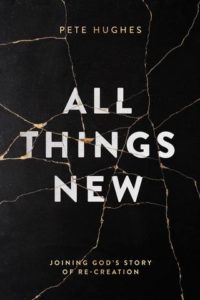 All Things New: Joining God’s Story of Re-Creation Pete Hughes (David C. Cook) $17.99 SALE PRICE = $12.59 If I were speaking to a baby-boomer crowd I would have said “who is that masked man?” I never heard of Pete Hughes or his spiffy church but I’m telling you, this is one of the best books of the year! And it is spot-on for the Jubilee vision, a perfect Biblical overview of the big story, of God’s work in the world, of our missional invitation to be agents of God’s own reconciliation and reformation. That two Jubilee home-run hitters from previous years (Jon Tyson and John Mark Comer) both eagerly endorse it with rave comments on the back assure us that I’m not dreaming here. This is a fresh new take on a full-orbed Kingdom vision and a fine Biblical overview of God’s plan of restoration and hope. Join in, please! Spread the word.
All Things New: Joining God’s Story of Re-Creation Pete Hughes (David C. Cook) $17.99 SALE PRICE = $12.59 If I were speaking to a baby-boomer crowd I would have said “who is that masked man?” I never heard of Pete Hughes or his spiffy church but I’m telling you, this is one of the best books of the year! And it is spot-on for the Jubilee vision, a perfect Biblical overview of the big story, of God’s work in the world, of our missional invitation to be agents of God’s own reconciliation and reformation. That two Jubilee home-run hitters from previous years (Jon Tyson and John Mark Comer) both eagerly endorse it with rave comments on the back assure us that I’m not dreaming here. This is a fresh new take on a full-orbed Kingdom vision and a fine Biblical overview of God’s plan of restoration and hope. Join in, please! Spread the word.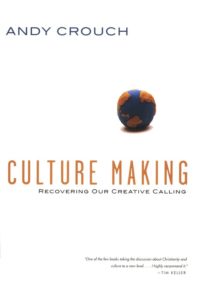 Culture Making: Recovering Our Creative Calling Andy Crouch (IVP) $24.00 SALE PRICE = $16.80 Andy was our main-stage Friday night speaker. Here is a fabulously interesting previous talk he did at Jubilee a few years back which was similar, although he sang more this year, and did a four-way graph which not only affirmed a Biblical cosmology but nicely critiqued the mechanistic worldview and the resultant reductionism that emerged from the secularizing Enlightenment era. Anyway, I suggested we read all of Andy’s wise and well-written books – if you haven’t read him, you are in for a literary treat. We highly recommend Culture Making, Playing God, Strong and Weak, and his must-read, very insightful, handy-sized The Tech Wise Family.
Culture Making: Recovering Our Creative Calling Andy Crouch (IVP) $24.00 SALE PRICE = $16.80 Andy was our main-stage Friday night speaker. Here is a fabulously interesting previous talk he did at Jubilee a few years back which was similar, although he sang more this year, and did a four-way graph which not only affirmed a Biblical cosmology but nicely critiqued the mechanistic worldview and the resultant reductionism that emerged from the secularizing Enlightenment era. Anyway, I suggested we read all of Andy’s wise and well-written books – if you haven’t read him, you are in for a literary treat. We highly recommend Culture Making, Playing God, Strong and Weak, and his must-read, very insightful, handy-sized The Tech Wise Family.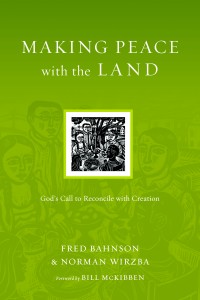 Making Peace with the Land: God’s Call to Reconcile with Creation Fred Bahnson & Norman Wirzba (IVP) $18.00 SALE PRICE = $12.60 If we live in a good creation that God so loves and our calling includes making something of it all, then surely tending the land itself and developing uniquely Christian views and coherent practices of growing food and eating is simply essential. I’m amazed how rarely we sell books from our “theology of food” section and how, most ordinary days, religious book buyers seem not to care about nurturing a faithful perspective on land, farming, food or feasting. This book is written by a Duke Divinity School professor and creation-care scholar and activist (Norman Wirzba) and a farmer (Fred Bahnson; we loved his memoir of visiting church-based garden projects called Soil and Sacrament: A Spiritual Memoir of Food and Faith.) This is, I said to the students, just one example of the implications of the sort of stuff that Andy was sharing. (I happen to know Andy loves Supper of the Lamb: A Culinary Reflection by Father Robert Farrar Capon and I admit that his chapter on onions is laden with as much good doctrine of creation as nearly anything since Gerard Manley Hopkins “dappled things” poem.) So, Making Peace with the Land is a fine introduction to creation and creation care but, truly, it is mostly about food and eating. You should read it. Enjoy!
Making Peace with the Land: God’s Call to Reconcile with Creation Fred Bahnson & Norman Wirzba (IVP) $18.00 SALE PRICE = $12.60 If we live in a good creation that God so loves and our calling includes making something of it all, then surely tending the land itself and developing uniquely Christian views and coherent practices of growing food and eating is simply essential. I’m amazed how rarely we sell books from our “theology of food” section and how, most ordinary days, religious book buyers seem not to care about nurturing a faithful perspective on land, farming, food or feasting. This book is written by a Duke Divinity School professor and creation-care scholar and activist (Norman Wirzba) and a farmer (Fred Bahnson; we loved his memoir of visiting church-based garden projects called Soil and Sacrament: A Spiritual Memoir of Food and Faith.) This is, I said to the students, just one example of the implications of the sort of stuff that Andy was sharing. (I happen to know Andy loves Supper of the Lamb: A Culinary Reflection by Father Robert Farrar Capon and I admit that his chapter on onions is laden with as much good doctrine of creation as nearly anything since Gerard Manley Hopkins “dappled things” poem.) So, Making Peace with the Land is a fine introduction to creation and creation care but, truly, it is mostly about food and eating. You should read it. Enjoy!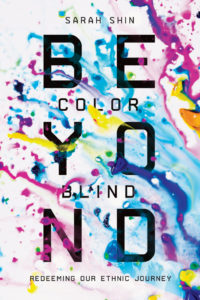 Beyond Colorblind: Redeeming Our Ethnic Journey Sarah Shin (IVP) $17.00 SALE PRICE = $11.90 Ever since the days Beth and I worked with CCO in the 1970s, the organization was largely white, but eager to proclaim a multi-ethnic Kingdom vision as the Scriptures demand. We’ve talked a lot about racism within the organization and at the conference over the years and Jubilee is a beautiful example of how an organization and event can be intentional about amplifying the voices and perspective of people of color. Yet, as I explained up front, we sometimes view conversations about race (understandably) about the injustices of racism; that is, we seem to mostly talk about the sin and brokenness and ugliness of it all. By highlighting this book as a part of an evening exploring the doctrine of a good creation I wanted to frame our thinking about race and ethnicity by their essential goodness and validity. God made this world to be a world of color and diversity; our heritages, developed through the unfolding of history, though tainted by sin, are, indeed, a good thing.
Beyond Colorblind: Redeeming Our Ethnic Journey Sarah Shin (IVP) $17.00 SALE PRICE = $11.90 Ever since the days Beth and I worked with CCO in the 1970s, the organization was largely white, but eager to proclaim a multi-ethnic Kingdom vision as the Scriptures demand. We’ve talked a lot about racism within the organization and at the conference over the years and Jubilee is a beautiful example of how an organization and event can be intentional about amplifying the voices and perspective of people of color. Yet, as I explained up front, we sometimes view conversations about race (understandably) about the injustices of racism; that is, we seem to mostly talk about the sin and brokenness and ugliness of it all. By highlighting this book as a part of an evening exploring the doctrine of a good creation I wanted to frame our thinking about race and ethnicity by their essential goodness and validity. God made this world to be a world of color and diversity; our heritages, developed through the unfolding of history, though tainted by sin, are, indeed, a good thing.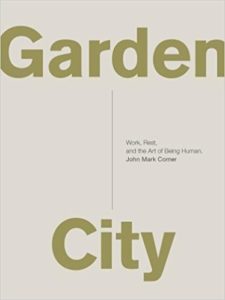 Garden City: Work, Rest, and the Art of Being Human John Mark Comer (Zondervan) $16.99 SALE PRICE = $11.89 For several years this has been a big seller at Jubilee and it captures well this teaching about the centrality of the cultural mandate, our call to exercise dominion by creatively opening up the goodness of God’s creation — by working and resting; this is what it means to be human. Comer is fun and easy to read, serious but playful, and due to the popularity and appropriateness of this book for our Jubilee event, he was asked to speak last year. His other books are all good – we sold out of his recent The Ruthless Elimination of Hurry – but this is a distinctively Jubilee-ish resource, a true must-read. What a joy.
Garden City: Work, Rest, and the Art of Being Human John Mark Comer (Zondervan) $16.99 SALE PRICE = $11.89 For several years this has been a big seller at Jubilee and it captures well this teaching about the centrality of the cultural mandate, our call to exercise dominion by creatively opening up the goodness of God’s creation — by working and resting; this is what it means to be human. Comer is fun and easy to read, serious but playful, and due to the popularity and appropriateness of this book for our Jubilee event, he was asked to speak last year. His other books are all good – we sold out of his recent The Ruthless Elimination of Hurry – but this is a distinctively Jubilee-ish resource, a true must-read. What a joy.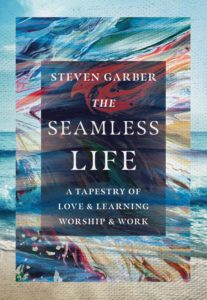 The Seamless Life: A Tapestry of Love & Learning, Worship & Work Steven Garber (IVP) $20.00 SALE PRICE = $14.00 If you want to see a beautiful description of the Jubilee conference this year (with a lovely nod to our big book display) see Steve’s recent Facebook post where he honored us so. Steve directed the Pittsburgh Jubilee conference decades ago and in his Facebook column he noted that there is, still, simply no other event like it anywhere in the world. With that connection to Jubilee and his love of learning and his passion to gently help others see a coherent and integrated lifestyle of Christian discipleship, even in public matters, he embodies so much of what the CCO ministry is to be about. As I said when I first announced this before it came out in late December and as I explained when I named it one of the very best books of the year, the chapters are short but eloquent, the vision big and beautiful, and the insight nothing short of profound.
The Seamless Life: A Tapestry of Love & Learning, Worship & Work Steven Garber (IVP) $20.00 SALE PRICE = $14.00 If you want to see a beautiful description of the Jubilee conference this year (with a lovely nod to our big book display) see Steve’s recent Facebook post where he honored us so. Steve directed the Pittsburgh Jubilee conference decades ago and in his Facebook column he noted that there is, still, simply no other event like it anywhere in the world. With that connection to Jubilee and his love of learning and his passion to gently help others see a coherent and integrated lifestyle of Christian discipleship, even in public matters, he embodies so much of what the CCO ministry is to be about. As I said when I first announced this before it came out in late December and as I explained when I named it one of the very best books of the year, the chapters are short but eloquent, the vision big and beautiful, and the insight nothing short of profound.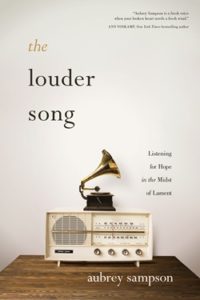 The Louder Song: Listening for Hope in the Midst of Lament Aubrey Sampson (NavPress) $15.99 SALE PRICE = $11.19 Since the Saturday morning session at Jubilee was designed to explore the Biblical teaching of “the fall” – which is theological short-hand for the reality of sin and brokenness, of tragedy and sorrow, of idols and rebellion – I thought I’d start off with this exquisite story of significant loss and how the author grew closer to God by hearing the music beneath the sorrow, the music of God’s presence in suffering and, particularly, God’s response to our cries of protest and lament. This is a book of deep anguish and yet good hope, not because of any glib “God willed it” cliché but because of the sturdy (if not nearly known enough in many churches) Biblical practice of crying out in lament. Students, like everyone, everywhere, are hurting and all of us live East of Eden, so I thought this was a good suggestion. We’ve reviewed The Louder Song at BookNotes and we were glad to get to give it a hefty shout-out at Jubilee. Thanks, Aubrey Sampson, for using your considerable writing gifts to share this hard stuff with such prophetic imagination.
The Louder Song: Listening for Hope in the Midst of Lament Aubrey Sampson (NavPress) $15.99 SALE PRICE = $11.19 Since the Saturday morning session at Jubilee was designed to explore the Biblical teaching of “the fall” – which is theological short-hand for the reality of sin and brokenness, of tragedy and sorrow, of idols and rebellion – I thought I’d start off with this exquisite story of significant loss and how the author grew closer to God by hearing the music beneath the sorrow, the music of God’s presence in suffering and, particularly, God’s response to our cries of protest and lament. This is a book of deep anguish and yet good hope, not because of any glib “God willed it” cliché but because of the sturdy (if not nearly known enough in many churches) Biblical practice of crying out in lament. Students, like everyone, everywhere, are hurting and all of us live East of Eden, so I thought this was a good suggestion. We’ve reviewed The Louder Song at BookNotes and we were glad to get to give it a hefty shout-out at Jubilee. Thanks, Aubrey Sampson, for using your considerable writing gifts to share this hard stuff with such prophetic imagination.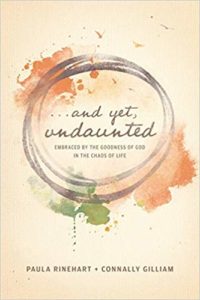 And Yet Undaunted: Embraced by the Goodness of God in the Chaos of Life Paula Rinehart & Conally Gilliam (NavPress) $15.99 SALE PRICE = $11.19 I almost announced this on Friday night as a great book to help explain the whole “creation-fall-redemption-restoration” story. These four themes are the four big units of this new book and I am so jazzed about it. (Although they use this precise language of these four high-points of the Biblical narrative, just like the four main-stage/plenary talks at Jubilee, they also put it this way (borrowing from CCO/Jubilee friend Mike Metzger of the Clapham Institute: What Ought to Be, What Is, What Can Be, What Will Be.) Oh my, this is a brilliant way to arrange a book of short readings of daily Christian living, shaping our discipleship by these suggestion-rich frames. We highlighted And Yet Undaunted here during the Saturday morning session because – as you can get from the title – it offers this big, hopeful, vision of God’s redemptive and restoring work to those who are hurting or confused. We may feel overwhelmed and that our lives are daunting, but we are, with this Jubilee vision of the Bible’s coherence, yet undaunted. We named this as one of the Best Books of 2019 and I was thrilled to tell the Jubilee kids about it. Do you feel daunted? You need this lovely, conversational guidebook. On sale at 30% off, now, until March 7, 2020.
And Yet Undaunted: Embraced by the Goodness of God in the Chaos of Life Paula Rinehart & Conally Gilliam (NavPress) $15.99 SALE PRICE = $11.19 I almost announced this on Friday night as a great book to help explain the whole “creation-fall-redemption-restoration” story. These four themes are the four big units of this new book and I am so jazzed about it. (Although they use this precise language of these four high-points of the Biblical narrative, just like the four main-stage/plenary talks at Jubilee, they also put it this way (borrowing from CCO/Jubilee friend Mike Metzger of the Clapham Institute: What Ought to Be, What Is, What Can Be, What Will Be.) Oh my, this is a brilliant way to arrange a book of short readings of daily Christian living, shaping our discipleship by these suggestion-rich frames. We highlighted And Yet Undaunted here during the Saturday morning session because – as you can get from the title – it offers this big, hopeful, vision of God’s redemptive and restoring work to those who are hurting or confused. We may feel overwhelmed and that our lives are daunting, but we are, with this Jubilee vision of the Bible’s coherence, yet undaunted. We named this as one of the Best Books of 2019 and I was thrilled to tell the Jubilee kids about it. Do you feel daunted? You need this lovely, conversational guidebook. On sale at 30% off, now, until March 7, 2020.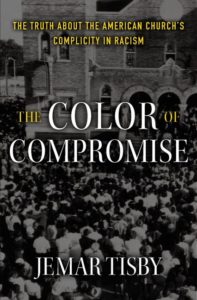 The Color of Compromise: The Truth about the American Church’s Complicity in Racism Jemar Tisby (Zondervan) $19.99 SALE PRICE = $13.99 I think this is one of the very best books for people to understand the complicity of the Christian religion in protecting slave holders and compromising the gospel for the sake of white supremacy. America is doubtlessly a great country, but this stuff has to be reckoned with. Our compromises must be acknowledged and this book was ideal to hold up as an example of how things go so very, very wrong because of our sin and idolatrous ideologies. In the Bible, sin is more than being naughty and the consequences of our unbelief and rebellion to God’s ways are often structural and systemic. This history book is a must read.
The Color of Compromise: The Truth about the American Church’s Complicity in Racism Jemar Tisby (Zondervan) $19.99 SALE PRICE = $13.99 I think this is one of the very best books for people to understand the complicity of the Christian religion in protecting slave holders and compromising the gospel for the sake of white supremacy. America is doubtlessly a great country, but this stuff has to be reckoned with. Our compromises must be acknowledged and this book was ideal to hold up as an example of how things go so very, very wrong because of our sin and idolatrous ideologies. In the Bible, sin is more than being naughty and the consequences of our unbelief and rebellion to God’s ways are often structural and systemic. This history book is a must read.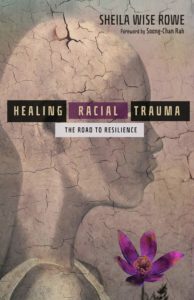 Healing Racial Trauma: The Road to Resilience Sheila Wise Rowe (IVP) $17.00 SALE PRICE = $11.90 I’ve written about this before, but thought you might want to know that this, too, is one we held up during Jubilee in the session designed to teach about sin, rebellion, alienation, and the grim facts of the human condition. We are glad that racism is more widely acknowledged than it maybe has been in our culture and in our churches; owning up to the hurt and complexities of racism means we have to understand some of what this book describes. Discussing everything from living with overt discrimination to routine micro-aggressions, from hosting fear and anxiety about things like police abuse or just the angst of being a minority in any majority culture group (even religious or church groups, by the way) Sheila Wise Rowe has given us all a great gift. To be offered a window into the lives of those who have been deeply hurt – she is not the only one who uses the phrase racial trauma – is so important in this damn fallen world. We who are white must “go there” if we want to really understand our friends and neighbors who suffer.
Healing Racial Trauma: The Road to Resilience Sheila Wise Rowe (IVP) $17.00 SALE PRICE = $11.90 I’ve written about this before, but thought you might want to know that this, too, is one we held up during Jubilee in the session designed to teach about sin, rebellion, alienation, and the grim facts of the human condition. We are glad that racism is more widely acknowledged than it maybe has been in our culture and in our churches; owning up to the hurt and complexities of racism means we have to understand some of what this book describes. Discussing everything from living with overt discrimination to routine micro-aggressions, from hosting fear and anxiety about things like police abuse or just the angst of being a minority in any majority culture group (even religious or church groups, by the way) Sheila Wise Rowe has given us all a great gift. To be offered a window into the lives of those who have been deeply hurt – she is not the only one who uses the phrase racial trauma – is so important in this damn fallen world. We who are white must “go there” if we want to really understand our friends and neighbors who suffer.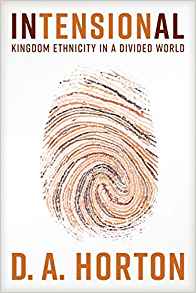 Intensional: Kingdom Ethnicity in a Divided World D.A. Horton (NavPress) $15.99 SALE PRICE $11.19 Horton has a bunch of books and years of experience as a part Latino ministry leader; he’s a good voice to listen to. His own journey of learning to cope with his own mixed ethnic background and identity and also to address the (subtle and not so subtle) racism in our society is so very well told, I wished I had time to hang out more with this book on the main stage. I was hurrying and making the case that these books on race are but examples of the bigger teaching we were going to explore (with speaker and hip hop artist Jackie Hill Perry, author of Gay Girl, Good God) who expertly unpacked the primal narrative of “the fall” in Genesis 3.
Intensional: Kingdom Ethnicity in a Divided World D.A. Horton (NavPress) $15.99 SALE PRICE $11.19 Horton has a bunch of books and years of experience as a part Latino ministry leader; he’s a good voice to listen to. His own journey of learning to cope with his own mixed ethnic background and identity and also to address the (subtle and not so subtle) racism in our society is so very well told, I wished I had time to hang out more with this book on the main stage. I was hurrying and making the case that these books on race are but examples of the bigger teaching we were going to explore (with speaker and hip hop artist Jackie Hill Perry, author of Gay Girl, Good God) who expertly unpacked the primal narrative of “the fall” in Genesis 3.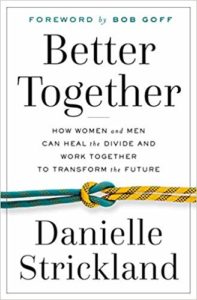 Better Together: How Women and Men Can Heal the Divide and Work Together to Transform the Future Danielle Strickland (Thomas Nelson Publishing) $18.99 SALE PRICE $13.29 I was so excited to highlight this brand spanking new book and I’m really eager to tell you about it here, now. I chose to highlight it Saturday morning, categorizing it under “the fall” since sexism and patriarchy – of the harsh, violent kind seen in rape culture or the subtle, softer kind found in many churches that marginalize women leaders — is, in fact, according to the Bible, an outgrowth of sin and sinful ideologies and attitudes. That the apostle Paul has to often remind us of “mutual submission” and that we men and women are one in Christ and that we should honor the women leaders he names is a reminder that in that Greco-Roman culture, women were demeaned and often casually abused and that the new community of Christ-followers were to have none of it.
Better Together: How Women and Men Can Heal the Divide and Work Together to Transform the Future Danielle Strickland (Thomas Nelson Publishing) $18.99 SALE PRICE $13.29 I was so excited to highlight this brand spanking new book and I’m really eager to tell you about it here, now. I chose to highlight it Saturday morning, categorizing it under “the fall” since sexism and patriarchy – of the harsh, violent kind seen in rape culture or the subtle, softer kind found in many churches that marginalize women leaders — is, in fact, according to the Bible, an outgrowth of sin and sinful ideologies and attitudes. That the apostle Paul has to often remind us of “mutual submission” and that we men and women are one in Christ and that we should honor the women leaders he names is a reminder that in that Greco-Roman culture, women were demeaned and often casually abused and that the new community of Christ-followers were to have none of it.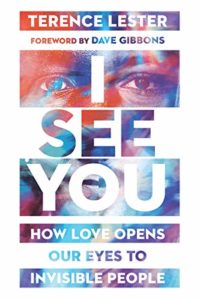 I See You: How Love Opens Our Eyes to Invisible People Lester Terence (IVP) $16.00 SALE PRICE = $11.20 With the rapid-fire shout out of the above books I made the case for Jubilee students on Saturday morning that there are many Christian books that look at the hard stuff of contemporary culture, that disarm the principalities and powers, that expose injustice, that give voice to those who are harmed by sin and idolatry. I knew that Jackie Hill Perry, as a solid, black, Reformed Bible scholar, would be very clear about personal sin and our individual need for repentance and return to God’s supremacy, but that she would also point us to the fact that our individual sinful dispositions yield a society in disarray. Our disordered loves lead to disordered cultures. And so, I highlighted books about racism and sexism. In this recent book, I See You, we back up to a very personal and very consequential sort of disposition: preferential blindness. That is, most of us are skilled – perhaps we are trained to be this way in school and by our entertainment – to block out the things that make us uncomfortable; indeed, the people that make us uncomfortable. The wonderful writer Lester Terence gives us a great gift with his new book about this, how it works and how God can help us overcome this tendency.
I See You: How Love Opens Our Eyes to Invisible People Lester Terence (IVP) $16.00 SALE PRICE = $11.20 With the rapid-fire shout out of the above books I made the case for Jubilee students on Saturday morning that there are many Christian books that look at the hard stuff of contemporary culture, that disarm the principalities and powers, that expose injustice, that give voice to those who are harmed by sin and idolatry. I knew that Jackie Hill Perry, as a solid, black, Reformed Bible scholar, would be very clear about personal sin and our individual need for repentance and return to God’s supremacy, but that she would also point us to the fact that our individual sinful dispositions yield a society in disarray. Our disordered loves lead to disordered cultures. And so, I highlighted books about racism and sexism. In this recent book, I See You, we back up to a very personal and very consequential sort of disposition: preferential blindness. That is, most of us are skilled – perhaps we are trained to be this way in school and by our entertainment – to block out the things that make us uncomfortable; indeed, the people that make us uncomfortable. The wonderful writer Lester Terence gives us a great gift with his new book about this, how it works and how God can help us overcome this tendency.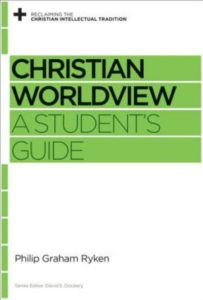 Christian Worldview: A Student’s Guide Philip Ryken (Crossway) $11.99 SALE PRICE $8.39 Oh my, we had to switch gears up front during that book interview from describing books about the consequences of the fall into sin and our personal and social brokenness to remind students of resources that would be germane for the workshops they would be attending later that day. There too they would explore the implications of the “creation-fall-redemption” Biblical story, but applied to their major and their studies.
Christian Worldview: A Student’s Guide Philip Ryken (Crossway) $11.99 SALE PRICE $8.39 Oh my, we had to switch gears up front during that book interview from describing books about the consequences of the fall into sin and our personal and social brokenness to remind students of resources that would be germane for the workshops they would be attending later that day. There too they would explore the implications of the “creation-fall-redemption” Biblical story, but applied to their major and their studies.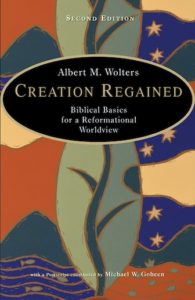 philosophy professor Davey Naugle called Worldview: The History of a Concept (Eerdmans; $37.50) and, then, the provocative collection of deeper discussions called After Worldview edited by Matthew Bonzo (Dordt College Press; $13.00) for a deeper dive into the subject. Al Wolter’s Creation Regained:
philosophy professor Davey Naugle called Worldview: The History of a Concept (Eerdmans; $37.50) and, then, the provocative collection of deeper discussions called After Worldview edited by Matthew Bonzo (Dordt College Press; $13.00) for a deeper dive into the subject. Al Wolter’s Creation Regained: 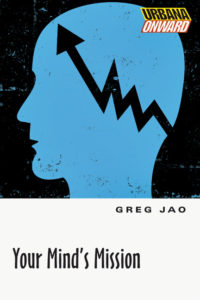 Your Minds Mission Greg Jao (IVP) $8.00 SALE PRICE $5.60 Oh my, how I wish we could give every person at Jubilee this handsome little staple-bound booklet. It is at once a worldview book, a book inviting us to use our minds well, a call to read widely, and a fabulous, upbeat, inspiring reminder that we can worship God as we think well about whatever we are studying. Our mind has a job to do, and we must learn to, as the Bible says, “take every thought captive.” Greg works with college students through IVCF and is a dear, dear brother in the Lord. He’s a friend of booksellers and a supporter of our work, so much so that he mentions Hearts & Minds in this little book. I sometimes forget that, and want to assure you that that isn’t why I push it everywhere I go. Although it is kinda cool that he so gets what we are trying to do here, what the Jubilee conference is about, and why reading, studying, learning, and becoming wise, more astute agents of social transformation is so very important. We are grateful for the things he cares so deeply about.
Your Minds Mission Greg Jao (IVP) $8.00 SALE PRICE $5.60 Oh my, how I wish we could give every person at Jubilee this handsome little staple-bound booklet. It is at once a worldview book, a book inviting us to use our minds well, a call to read widely, and a fabulous, upbeat, inspiring reminder that we can worship God as we think well about whatever we are studying. Our mind has a job to do, and we must learn to, as the Bible says, “take every thought captive.” Greg works with college students through IVCF and is a dear, dear brother in the Lord. He’s a friend of booksellers and a supporter of our work, so much so that he mentions Hearts & Minds in this little book. I sometimes forget that, and want to assure you that that isn’t why I push it everywhere I go. Although it is kinda cool that he so gets what we are trying to do here, what the Jubilee conference is about, and why reading, studying, learning, and becoming wise, more astute agents of social transformation is so very important. We are grateful for the things he cares so deeply about.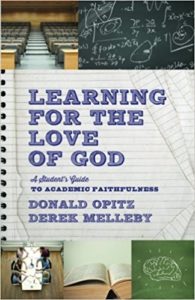 Learning for the Love of God: A Student’s Guide to Academic Faithfulness Derek Melleby & Donald Opitz (Brazos Press) $17.00 SALE PRICE = $11.90 Okay, I’ll be brief. I had to be brief in my one-stage interview last week as my allotted time was nearly up. I have touted (as I did at Jubilee) a little, easy to read book on worldview (Ryken’s) and a little easy to read book on the missional mind (by Greg Jao.) Both are jam-packed with implications but are necessarily brief. These are daunting subject and few folks take up our challenge to tackle worldview and the Christian mind as a topic of study as such. For those who do and want the “next step” or for those who think Worldview: A Student’s Guide or Your Minds Mission are too brief, then Learning for the Love of God is the next necessary step. I have raved about it before and I have held firm in my conviction that it is one of the few essential reads for any Christian college student. There are plenty of more rigorous texts but for undergrads, but start here.
Learning for the Love of God: A Student’s Guide to Academic Faithfulness Derek Melleby & Donald Opitz (Brazos Press) $17.00 SALE PRICE = $11.90 Okay, I’ll be brief. I had to be brief in my one-stage interview last week as my allotted time was nearly up. I have touted (as I did at Jubilee) a little, easy to read book on worldview (Ryken’s) and a little easy to read book on the missional mind (by Greg Jao.) Both are jam-packed with implications but are necessarily brief. These are daunting subject and few folks take up our challenge to tackle worldview and the Christian mind as a topic of study as such. For those who do and want the “next step” or for those who think Worldview: A Student’s Guide or Your Minds Mission are too brief, then Learning for the Love of God is the next necessary step. I have raved about it before and I have held firm in my conviction that it is one of the few essential reads for any Christian college student. There are plenty of more rigorous texts but for undergrads, but start here.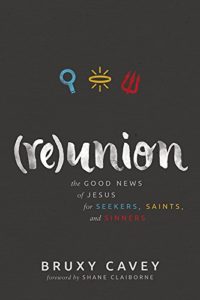 (re)union: The Good News of Jesus for Seekers, Saints, and Sinners Bruxy Cavey (Herald Press) $16.99 SALE PRICE = $11.89 Bruxy is a pretty darn cool Brethren pastor from Canada, a kindred spirit to Shane Claiborne, maybe… a little less political, but all about being an incarnational community following the radical way of Jesus. I love this book in which he says one can summarize the gospel in one word: Jesus! But he means by that all that the Scriptures suggest – the saving work of the cross and the ethical necessity of following that same Savior into the world that so badly needs rescue. I love the clever writing, the high Christology, the strong ecclesiology, and non-conformist lifestyle (all traits of the Anabaptist heritage that Bruxy updates for our times.) This book is user-friendly in a helpful way because he doesn’t presume a devout reader – the subtitle is for real; it’s ideal for seekers. Beth and I like it a lot.
(re)union: The Good News of Jesus for Seekers, Saints, and Sinners Bruxy Cavey (Herald Press) $16.99 SALE PRICE = $11.89 Bruxy is a pretty darn cool Brethren pastor from Canada, a kindred spirit to Shane Claiborne, maybe… a little less political, but all about being an incarnational community following the radical way of Jesus. I love this book in which he says one can summarize the gospel in one word: Jesus! But he means by that all that the Scriptures suggest – the saving work of the cross and the ethical necessity of following that same Savior into the world that so badly needs rescue. I love the clever writing, the high Christology, the strong ecclesiology, and non-conformist lifestyle (all traits of the Anabaptist heritage that Bruxy updates for our times.) This book is user-friendly in a helpful way because he doesn’t presume a devout reader – the subtitle is for real; it’s ideal for seekers. Beth and I like it a lot.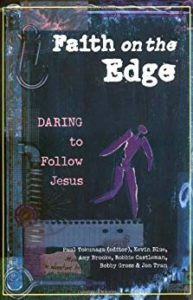 Faith On the Edge: Daring to Follow Jesus Paul Tokunaga, Kevin Blue, Amy Brooke, Bobby Gross, and others (IVP) $20.00 SALE PRICE = $14.00 I give a hearty recommendation about this every year at Jubilee because it was first designed for new, youngish followers of Jesus who want short readings, nice reflection questions, and some guidance about many aspects of living well with Christ. The first few chapters are about knowing God, the next batch are about relationships – from parents to church members to neighbors, exploring new relationships with housemates and friends, the poor, the unchurched and more. The third part follows the trajectory from knowing God to serving those around us to rocking the world for Christ—there are chapters on global concerns, world missions, living out ones faith in the marketplace and more. Between the handful of chapters in each of these three sections, Faith on the Edge is one of the best little readers to introduce Christian views and beliefs and habits we know of. I’ve been impressed with this for years and it isn’t at all outdated. Wholistic, multi-faceted, solid, not daunting, written by a multi-ethnic team of women and men. I really recommend this.
Faith On the Edge: Daring to Follow Jesus Paul Tokunaga, Kevin Blue, Amy Brooke, Bobby Gross, and others (IVP) $20.00 SALE PRICE = $14.00 I give a hearty recommendation about this every year at Jubilee because it was first designed for new, youngish followers of Jesus who want short readings, nice reflection questions, and some guidance about many aspects of living well with Christ. The first few chapters are about knowing God, the next batch are about relationships – from parents to church members to neighbors, exploring new relationships with housemates and friends, the poor, the unchurched and more. The third part follows the trajectory from knowing God to serving those around us to rocking the world for Christ—there are chapters on global concerns, world missions, living out ones faith in the marketplace and more. Between the handful of chapters in each of these three sections, Faith on the Edge is one of the best little readers to introduce Christian views and beliefs and habits we know of. I’ve been impressed with this for years and it isn’t at all outdated. Wholistic, multi-faceted, solid, not daunting, written by a multi-ethnic team of women and men. I really recommend this.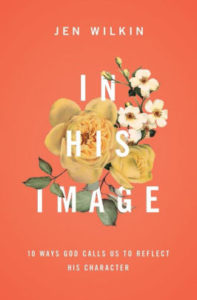 In His Image: 10 Ways God Calls Us to Reflect His Character Jen Wilkin (Crossway) $12.99 SALE PRICE= $9.09 Before a message about re-uniting with God through His initiative to redeem and adopt us, I figured it would be useful to suggest a book about the attributes of God. Who is this God that loves us so? Bruxy Cavey’s Reunion makes the case that we are invited into relationship with Jesus and called to follow him, together, into the world. Faith on the Edge gives us insights, wisdom, teaching, and very practical guidance on how to do that. In His Image tells us two big things: who God is, based on Bible teaching about God’s character and ways, and teaches us how we are to image God by reflecting those characteristics. Some of God’s attributes, of course, we do not exactly reflect (we are not omnipresent or all powerful, after all.) But there are attributes of God we can be infused by and Ms. Wilkin explains all this with depth and charm and is exceptionally useful for those wanting to deepen their faith. I’d say it is very good for beginners, but really good for any who want to live into their discipleship with more Biblical depth.
In His Image: 10 Ways God Calls Us to Reflect His Character Jen Wilkin (Crossway) $12.99 SALE PRICE= $9.09 Before a message about re-uniting with God through His initiative to redeem and adopt us, I figured it would be useful to suggest a book about the attributes of God. Who is this God that loves us so? Bruxy Cavey’s Reunion makes the case that we are invited into relationship with Jesus and called to follow him, together, into the world. Faith on the Edge gives us insights, wisdom, teaching, and very practical guidance on how to do that. In His Image tells us two big things: who God is, based on Bible teaching about God’s character and ways, and teaches us how we are to image God by reflecting those characteristics. Some of God’s attributes, of course, we do not exactly reflect (we are not omnipresent or all powerful, after all.) But there are attributes of God we can be infused by and Ms. Wilkin explains all this with depth and charm and is exceptionally useful for those wanting to deepen their faith. I’d say it is very good for beginners, but really good for any who want to live into their discipleship with more Biblical depth.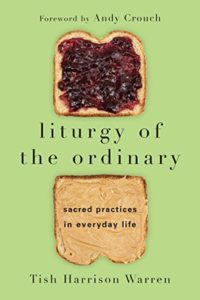 Liturgy of the Ordinary: Sacred Practices in Everyday Life Tish Harrison Warren (IVP) $20.00 [the new hardback edition] SALE PRICE = $14.00 I’ve raved about this often and it was a special delight at Jubilee to have Tish and her daughter and new baby shopping in our Jubilee bookstore. (A few local Pittsburghers who were not at the conference came by to browse. Thanks to Jon & Kathy at WORD FM for helping with that.) Long before I knew Tish was showing up, though, we knew we’d feature this great book. I announced that Liturgy of the Ordinary is a perfect book for those wanting to accept their new status as redeemed and adopted children of God; with her great prose and vivid storytelling, Tish does two big things that not enough authors do: she reminds us that God is with us throughout the live-long day, even during seemingly mundane moments and certainly in hard moments. And, secondly, she does that by linking our Christian practices of being open to God’s presence to moments of worship. That is, she links liturgy to life; she explores how the formative practices of worship, liturgy and the practices of spiritual disciplines can equip us to be more faithful in the ordinary stuff of life. One of our favorite Jubilee speakers from the previous year and one of our all-time favorite books. Lovely, thoughtful, wise and very well written… it is now only available in hardback, in part to celebrate its significance, but also to prevent Amazon from pirating it. Get it from us now on sale!
Liturgy of the Ordinary: Sacred Practices in Everyday Life Tish Harrison Warren (IVP) $20.00 [the new hardback edition] SALE PRICE = $14.00 I’ve raved about this often and it was a special delight at Jubilee to have Tish and her daughter and new baby shopping in our Jubilee bookstore. (A few local Pittsburghers who were not at the conference came by to browse. Thanks to Jon & Kathy at WORD FM for helping with that.) Long before I knew Tish was showing up, though, we knew we’d feature this great book. I announced that Liturgy of the Ordinary is a perfect book for those wanting to accept their new status as redeemed and adopted children of God; with her great prose and vivid storytelling, Tish does two big things that not enough authors do: she reminds us that God is with us throughout the live-long day, even during seemingly mundane moments and certainly in hard moments. And, secondly, she does that by linking our Christian practices of being open to God’s presence to moments of worship. That is, she links liturgy to life; she explores how the formative practices of worship, liturgy and the practices of spiritual disciplines can equip us to be more faithful in the ordinary stuff of life. One of our favorite Jubilee speakers from the previous year and one of our all-time favorite books. Lovely, thoughtful, wise and very well written… it is now only available in hardback, in part to celebrate its significance, but also to prevent Amazon from pirating it. Get it from us now on sale!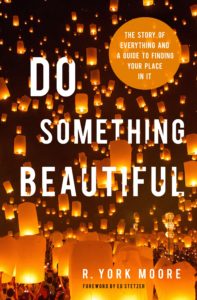 Do Something Beautiful: The Story of Everything and a Guide to Finding Your Place In It R. York Moore (Moody Press) $13.99 SALE PRICE = $9.79 Oh man, what a handsome little book, with a striking cover and some full color design touches inside; it’s a fine-looking book. And, more importantly, it offers a beautiful vision and I highlighted it at Jubilee 2020 not only because York has been a staff trainer for CCO in the past and a keynote preacher at Jubilee (where he guided many into a new, saving relationship with Christ) but because this notion of doing something good and beautiful seemed such a fresh and good way to describe the response to the call to commitment that would be given in that hour. My friend Rev. Dean Weaver is a great communicator and solid preacher so I was glad he’d be presenting the truth of the redemption chapter of the Biblical story and I wanted to recommend a book that was clear about salvation and clear about the wholistic, good response we can make, heading into the world shaped in decisive ways by the Biblical story. York’s call in Do Something Beautiful for us to be agents of social change is wonderful, gracious, balanced, although it is delivered with urgency. (He is particularly passionate about fighting sexual trafficking and has done good, good work on that.) It is an honor to amplify his message and to highlight him as an evangelist who knows that salvation must bear fruit of justice and public righteousness and social change, colored by beauty. What a lovely, energizing book. Highly recommended
Do Something Beautiful: The Story of Everything and a Guide to Finding Your Place In It R. York Moore (Moody Press) $13.99 SALE PRICE = $9.79 Oh man, what a handsome little book, with a striking cover and some full color design touches inside; it’s a fine-looking book. And, more importantly, it offers a beautiful vision and I highlighted it at Jubilee 2020 not only because York has been a staff trainer for CCO in the past and a keynote preacher at Jubilee (where he guided many into a new, saving relationship with Christ) but because this notion of doing something good and beautiful seemed such a fresh and good way to describe the response to the call to commitment that would be given in that hour. My friend Rev. Dean Weaver is a great communicator and solid preacher so I was glad he’d be presenting the truth of the redemption chapter of the Biblical story and I wanted to recommend a book that was clear about salvation and clear about the wholistic, good response we can make, heading into the world shaped in decisive ways by the Biblical story. York’s call in Do Something Beautiful for us to be agents of social change is wonderful, gracious, balanced, although it is delivered with urgency. (He is particularly passionate about fighting sexual trafficking and has done good, good work on that.) It is an honor to amplify his message and to highlight him as an evangelist who knows that salvation must bear fruit of justice and public righteousness and social change, colored by beauty. What a lovely, energizing book. Highly recommended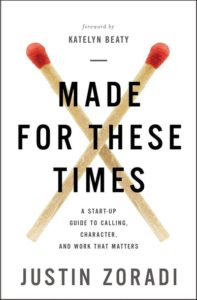 Made for These Times: A Start-Up Guide to Calling, Character, and Work That Matters Justin Zoradi (Zondervan) $16.99 SALE PRICE = $11.89 I like to tell the story that the first time I heard of this guy and his book, a CCO staff person had heard him speak somewhere and asked me about him. He sure sounded a lot like a Jubilee keynote speaker, she said, and did I know him? I did not. I picked up the book and on the first page it mentions – as it does a few other times – my best friend, Ken Heffner, then of Calvin College, in Grand Rapids. Ken and Gail are former CCO staff, Jubilee conference fans, and bear witness with every ounce of their being this very good news that God’s Kingdom is restoring all things in the creation, that we need to think Christianly about engaging the good and bad in everything from pop culture and music to ecological issues and public policy. Justin was mentored as he worked for Ken and was offered Heffner hospitality in GR, learning much about this whole-life sort of Kingdom discipleship. He went on to start a global non-profit, to deepen his passion about justice work and redemptive efforts in the nonprofit space as an award-winning social entrepreneur. Made for These Times passionately tells about his passion and honestly informs us how to move towards more intentional kinds of service in the world. My friend was right: Justin Zoradi would make a perfect Jubilee speaker! And his book is a great, inspiring read to become the kind of people who can (as Steve Garber might put it) live into visions of vocation for the sake of the common good. Yes, yes, yes! On sale at 30% off, now, this week only. Check it out!
Made for These Times: A Start-Up Guide to Calling, Character, and Work That Matters Justin Zoradi (Zondervan) $16.99 SALE PRICE = $11.89 I like to tell the story that the first time I heard of this guy and his book, a CCO staff person had heard him speak somewhere and asked me about him. He sure sounded a lot like a Jubilee keynote speaker, she said, and did I know him? I did not. I picked up the book and on the first page it mentions – as it does a few other times – my best friend, Ken Heffner, then of Calvin College, in Grand Rapids. Ken and Gail are former CCO staff, Jubilee conference fans, and bear witness with every ounce of their being this very good news that God’s Kingdom is restoring all things in the creation, that we need to think Christianly about engaging the good and bad in everything from pop culture and music to ecological issues and public policy. Justin was mentored as he worked for Ken and was offered Heffner hospitality in GR, learning much about this whole-life sort of Kingdom discipleship. He went on to start a global non-profit, to deepen his passion about justice work and redemptive efforts in the nonprofit space as an award-winning social entrepreneur. Made for These Times passionately tells about his passion and honestly informs us how to move towards more intentional kinds of service in the world. My friend was right: Justin Zoradi would make a perfect Jubilee speaker! And his book is a great, inspiring read to become the kind of people who can (as Steve Garber might put it) live into visions of vocation for the sake of the common good. Yes, yes, yes! On sale at 30% off, now, this week only. Check it out!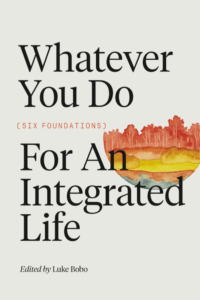 Whatever You Do: Six Foundations for an Integrated Life edited by Luke Bobo (Made to Flourish) $7.99 SALE PRICE = $5.59 Made to Flourish is a classy church-based network founded by our friend Tom Nelson (who has spoken at Jubilee and the for-adults pre-conference called Jubilee Professional) teaching from his wise and useful book Work Matters. After diving into the work of pastoring in ways that equipped his congregants to be salt and light in their workaday jobs, he moved increasingly to equip other pastors with this vision, helping others to enhance their own missional footprint in the marketplace. This engagement with work and calling and vocation and business led him to think more about economics, and he wrote a lovely little primer to help churches move towards being agents of shalom for their needy neighborhoods (see his The Economics of Neighborly Love: Investing in Your Community’s Compassion and Capacity published by IVP; $18.00.)
Whatever You Do: Six Foundations for an Integrated Life edited by Luke Bobo (Made to Flourish) $7.99 SALE PRICE = $5.59 Made to Flourish is a classy church-based network founded by our friend Tom Nelson (who has spoken at Jubilee and the for-adults pre-conference called Jubilee Professional) teaching from his wise and useful book Work Matters. After diving into the work of pastoring in ways that equipped his congregants to be salt and light in their workaday jobs, he moved increasingly to equip other pastors with this vision, helping others to enhance their own missional footprint in the marketplace. This engagement with work and calling and vocation and business led him to think more about economics, and he wrote a lovely little primer to help churches move towards being agents of shalom for their needy neighborhoods (see his The Economics of Neighborly Love: Investing in Your Community’s Compassion and Capacity published by IVP; $18.00.)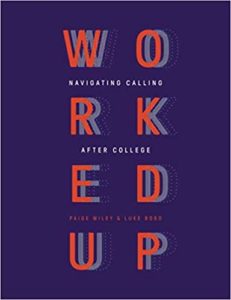 Worked Up: Navigating Calling After College edited by Luke Bobo and Paige Wiley (Made to Flourish) $9.99 SALE PRICE = $6.99 This is a very cool- looking, thin but slightly oversized book that is so wonderfully designed with colorful graphics and print touches that I just want to tell everybody about it. There are pull quotes and sidebars — you really have to see it. Alas, it is a specialized market, but you should know about it. This is a workbooky sort of journal that asks very perceptive questions for the recent college graduate about discerning more about their calling and careers. We have bunches of books like this (drop me a note for a larger list including books like the energetic Your Vocational Credo by Deborah Koehn Loyd (my personal fav) or the more contemplative Consider Your Calling by Gordon T. Smith) but Worked Up offers two very important things: it includes space for writing in response to wise prompts and provocative questions and it is rooted in this all-of-life-redeemed, worldviewish vision that honors the high calling of a Biblical vision for work. There are only a few faith-based vocational guidebooks and this is as solid on the framework for vocational discipleship and authentic flourishing than any tool I know. And it is honest, inviting some pondering about anxiety and discernment and such. It’s very nice for anyone, really, and ideal for those in transition, thinking afresh about their jobs, callings, work, and careers. Kudos to Made to Flourish for this fine, fine resource.
Worked Up: Navigating Calling After College edited by Luke Bobo and Paige Wiley (Made to Flourish) $9.99 SALE PRICE = $6.99 This is a very cool- looking, thin but slightly oversized book that is so wonderfully designed with colorful graphics and print touches that I just want to tell everybody about it. There are pull quotes and sidebars — you really have to see it. Alas, it is a specialized market, but you should know about it. This is a workbooky sort of journal that asks very perceptive questions for the recent college graduate about discerning more about their calling and careers. We have bunches of books like this (drop me a note for a larger list including books like the energetic Your Vocational Credo by Deborah Koehn Loyd (my personal fav) or the more contemplative Consider Your Calling by Gordon T. Smith) but Worked Up offers two very important things: it includes space for writing in response to wise prompts and provocative questions and it is rooted in this all-of-life-redeemed, worldviewish vision that honors the high calling of a Biblical vision for work. There are only a few faith-based vocational guidebooks and this is as solid on the framework for vocational discipleship and authentic flourishing than any tool I know. And it is honest, inviting some pondering about anxiety and discernment and such. It’s very nice for anyone, really, and ideal for those in transition, thinking afresh about their jobs, callings, work, and careers. Kudos to Made to Flourish for this fine, fine resource.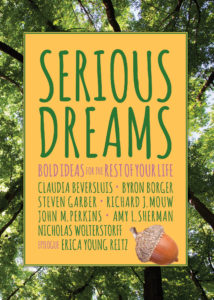 Serious Dreams: Bold Ideas for the Rest of Your Life edited by Byron Borger (Square Halo Books) $13.99 SALE PRICE = $9.79 Okay, can you blame me? This was my own contribution and I truly wouldn’t have announced it in our limited time up front at Jubilee if I didn’t earnestly belief it was great to this crowd. I’m happy to remind you of it here, now. It’s a volume I edited, a collection of commencement speeches from Christian colleges that sounded a lot like big and motivational main-stage Jubilee-talks. Some chapters are literate and tender (I adore the one by Calvin College’s Claudia Beversluis quoting Wendell Berry poetry) and some offer Biblical explorations (my own reflections on being “sons and daughters of Issachar” for instance.)
Serious Dreams: Bold Ideas for the Rest of Your Life edited by Byron Borger (Square Halo Books) $13.99 SALE PRICE = $9.79 Okay, can you blame me? This was my own contribution and I truly wouldn’t have announced it in our limited time up front at Jubilee if I didn’t earnestly belief it was great to this crowd. I’m happy to remind you of it here, now. It’s a volume I edited, a collection of commencement speeches from Christian colleges that sounded a lot like big and motivational main-stage Jubilee-talks. Some chapters are literate and tender (I adore the one by Calvin College’s Claudia Beversluis quoting Wendell Berry poetry) and some offer Biblical explorations (my own reflections on being “sons and daughters of Issachar” for instance.)